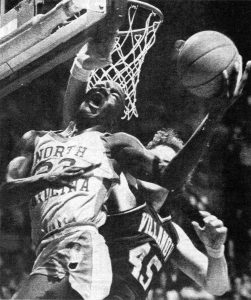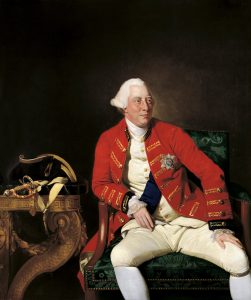Jack Nicholson, Laurence Olivier, and Paul Newman: Oscars Best Actor and Supporting Actor Nominations
Jack Nicholson, Laurence Olivier, and Paul Newman are three of the most iconic actors in film history, each leaving an indelible mark on cinema with their unique talents and memorable performances. Nicholson, known for his intense, often rebellious characters, brought raw energy to films like One Flew Over the Cuckoo’s Nest and The Shining, symbolizing 1970s and 1980s American cinema. Laurence Olivier, a master of classical theatre, was revered for his Shakespearean roles both on stage and in film, with his performances in Hamlet and Richard III showcasing his extraordinary range and command of the craft. Paul Newman, with his striking blue eyes and charismatic presence, became a beloved Hollywood star known for his roles in Cool Hand Luke, The Hustler, and Butch Cassidy and the Sundance Kid, embodying a blend of toughness and vulnerability that resonated deeply with audiences. Each actor brought something distinct to their craft, and their legacies continue influencing generations of performers.
Jack Nicholson
Academy Awards – Best Actor Nominations:
- “Five Easy Pieces” (1970) – Nominated for Best Actor in a Leading Role.
- “The Last Detail” (1973) – Nominated for Best Actor in a Leading Role.
- “Chinatown” (1974) – Nominated for Best Actor in a Leading Role.
- “One Flew Over the Cuckoo’s Nest” (1975) – Won Best Actor in a Leading Role.
- “Prizzi’s Honor” (1985) – Nominated for Best Actor in a Leading Role.
- “Ironweed” (1987) – Nominated for Best Actor in a Leading Role.
- “As Good as It Gets” (1997) – Won Best Actor in a Leading Role.
- “About Schmidt” (2002) – Nominated for Best Actor in a Leading Role.
Academy Awards – Best Supporting Actor Nominations:
- “Easy Rider” (1969) – Nominated for Best Supporting Actor.
- “Reds” (1981) – Nominated for Best Supporting Actor.
- “Terms of Endearment” (1983) – Won Best Supporting Actor.
- “A Few Good Men” (1992) – Nominated for Best Supporting Actor.
Laurence Olivier
Academy Awards – Best Actor Nominations:
- “Wuthering Heights” (1939) – Nominated for Best Actor in a Leading Role.
- “Rebecca” (1940) – Nominated for Best Actor in a Leading Role.
- “Henry V” (1944) – Nominated for Best Actor in a Leading Role.
- “Hamlet” (1948) – Won Best Actor in a Leading Role.
- “Richard III” (1955) – Nominated for Best Actor in a Leading Role.
- “The Entertainer” (1960) – Nominated for Best Actor in a Leading Role.
- “Othello” (1965) – Nominated for Best Actor in a Leading Role.
- “Sleuth” (1972) – Nominated for Best Actor in a Leading Role.
- “The Boys from Brazil” (1978) – Nominated for Best Actor in a Leading Role.
Academy Awards – Best Supporting Actor Nominations:
- “Marathon Man” (1976) – Nominated for Best Supporting Actor.
Paul Newman
Academy Awards – Best Actor Nominations:
- “Cat on a Hot Tin Roof” (1958) – Nominated for Best Actor in a Leading Role.
- “The Hustler” (1961) – Nominated for Best Actor in a Leading Role.
- “Hud” (1963) – Nominated for Best Actor in a Leading Role.
- “Cool Hand Luke” (1967) – Nominated for Best Actor in a Leading Role.
- “Rachel, Rachel” (1968) – No acting nomination, but directed the film nominated for Best Picture.
- “Absence of Malice” (1981) – Nominated for Best Actor in a Leading Role.
- “The Verdict” (1982) – Nominated for Best Actor in a Leading Role.
- “The Color of Money” (1986) – Won Best Actor in a Leading Role.
- “Nobody’s Fool” (1994) – Nominated for Best Actor in a Leading Role.
Academy Awards – Best Supporting Actor Nominations:
- “Road to Perdition” (2002) – Nominated for Best Supporting Actor.
Jack Nicholson History
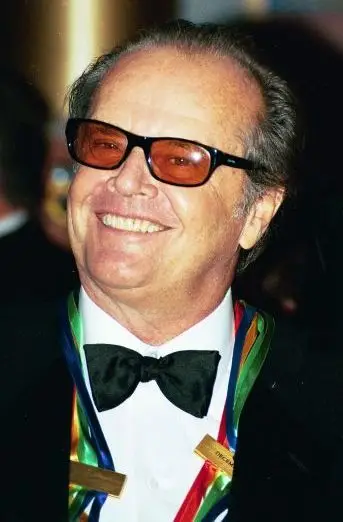
Nicholson in 2001 (Wiki Image).
- “I’m Irish. I think about death all the time.”
- Nicholson’s dark humor and introspective nature reflect his Irish heritage and his contemplation of mortality.
- “The minute that you’re not learning, I believe you’re dead.”
- A reflection on the importance of continuous learning and growth throughout life indicates his curiosity and drive.
- “With my sunglasses on, I’m Jack Nicholson. Without them, I’m fat and 70.”
- A humorous take on his public persona and the power of appearances, acknowledging the role his iconic sunglasses play in his image.
- “A star on a movie set is like a time bomb. That bomb has got to be defused so people can approach it without fear.”
- Nicholson’s insight into the challenges of being a star and the need to make himself approachable on set despite his status.
- “I only take Viagra when I am with more than one woman.”
- A classic example of Nicholson’s irreverent humor, showcasing his notorious charm and playboy reputation.
- “You only lie to two people in your life: your girlfriend and the police.”
- A sardonic comment on the nature of honesty and deception, delivered with Nicholson’s trademark wit.
- “The thing I like about acting is that it makes the world kind of new to me.”
- His appreciation for acting to see the world through fresh eyes is a testament to his love for his craft.
- “In this business, until you’re known as a monster, you’re not a star.”
- Nicholson’s commentary on the entertainment industry and the larger-than-life personas required to achieve stardom.
- “There’s only two people in your life you should lie to… the police and your girlfriend.”
- A repeated line emphasizing his cynical yet humorous outlook on life and relationships.
- “I’ve always been my own worst enemy.”
- A candid acknowledgment of his own flaws and the internal struggles he’s faced throughout his life and career.
| Movie Title | Year Released | Role | Plot Summary | Key Themes |
|---|---|---|---|---|
| One Flew Over the Cuckoo’s Nest | 1975 | Randle P. McMurphy | A man feigns insanity to serve his sentence in a mental institution, where he challenges the oppressive authority of Nurse Ratched. | Rebellion, individual vs. authority, freedom |
| The Shining | 1980 | Jack Torrance | A writer works as a winter caretaker in an isolated hotel, where supernatural forces influence him into violence and madness. | Madness, isolation, family, supernatural |
| Chinatown | 1974 | J.J. “Jake” Gittes | A private detective uncovers a web of corruption, deceit, and murder in 1930s Los Angeles linked to the city’s water supply. | Corruption, moral ambiguity, greed |
| As Good as It Gets | 1997 | Melvin Udall | A misanthropic writer with OCD forms an unlikely relationship with a waitress and a gay artist, leading him to open up emotionally. | Redemption, love, mental health |
| A Few Good Men | 1992 | Col. Nathan R. Jessep | Two Marines are court-martialed for murder, and a young lawyer must unravel the truth, leading to a dramatic confrontation with Jessep. | Justice, truth, authority |
| The Departed | 2006 | Frank Costello | An undercover cop infiltrates a mob led by Costello, while a mole within the police works for the crime boss, leading to a deadly clash. | Deception, loyalty, crime |
| Batman | 1989 | The Joker | In Gotham City, Batman battles his archenemy, the Joker, who seeks to spread chaos and terror across the city. | Chaos vs. order, duality, heroism |
| Terms of Endearment | 1983 | Garrett Breedlove | This is the story of a mother-daughter relationship over decades as they face life’s struggles, with Breedlove, a former astronaut who becomes romantically involved. | Family, love, loss |
| About Schmidt | 2002 | Warren Schmidt | A retired man embarks on a cross-country trip after his wife’s death, reflecting on his life, family, and missed opportunities. | Aging, self-discovery, existential reflection |
| Easy Rider | 1969 | George Hanson | Two bikers travel across America for freedom, meeting a lawyer, George, who joins them. | Freedom, counterculture, the American dream |
| The Pledge | 2001 | Jerry Black | A retiring detective makes a personal pledge to find the killer of a young girl, becoming obsessed with solving the case. | Obsession, morality, crime |
| Five Easy Pieces | 1970 | Robert Dupea | A former piano prodigy turned oil worker struggles with his discontent and reconnects with his estranged family. | Alienation, family, identity |
| The Bucket List | 2007 | Edward Cole | Two terminally ill men embark on a road trip to complete their bucket lists before they die, forging a deep bond along the way. | Mortality, friendship, living life to the fullest |
| Mars Attacks! | 1996 | President James Dale | A comically violent race of aliens invades Earth, and the U.S. President must find a way to respond to the bizarre invasion. | Parody, satire, sci-fi comedy |
| The Postman Always Rings Twice | 1981 | Frank Chambers | A drifter begins an affair with a married woman, and the two conspire to murder her husband, leading to tragic consequences. | Lust, crime, betrayal |
| Hoffa | 1992 | Jimmy Hoffa | A biographical drama about the life of labor union leader Jimmy Hoffa, his rise to power, and his mysterious disappearance. | Power, loyalty, organized crime |
APRIL 23 – Jack NICHOLSON ‘s insights about Acting
Jack Nicholson BBC Interview (January 18, 1982) HD
1982: JACK NICHOLSON on BRANDO, KUBRICK and …
What Jack Nicholson Told Jeff Daniels the First Time They Met …
(YouTube video)
Jack Nicholson is one of American cinema’s most iconic and accomplished actors. With a career of over six decades, he is known for his versatile roles, intense performances, and distinctively charismatic persona. Here’s a detailed look at his life and career:
Early Life and Background
- Birth and Upbringing: Jack Nicholson was born John Joseph Nicholson on April 22, 1937, in Neptune City, New Jersey. He was raised by his grandmother, who he believed was his mother, and was unaware until later in life that his “sister” June was his biological mother. This revelation came when Nicholson was in his 30s after both women had passed away.
- Early Interests: Nicholson developed an interest in acting at a young age and moved to Los Angeles in 1954 to pursue an entertainment career. He initially worked as a gofer for MGM’s animation department, where he considered a career as a cartoonist before turning to acting.
Acting Career Beginnings
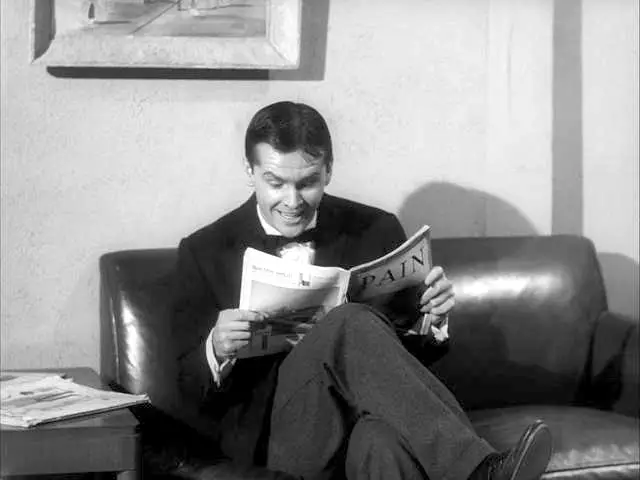 Nicholson as Wilbur Force in The Little Shop of Horrors (1960) (Wiki Image).
Nicholson as Wilbur Force in The Little Shop of Horrors (1960) (Wiki Image).
- Early Roles: Nicholson’s early career was marked by minor roles in B-movies and television shows. His first film role was in the low-budget teen drama “The Cry Baby Killer” (1958). He also appeared in a series of low-budget horror films produced by Roger Corman, such as “The Little Shop of Horrors” (1960) and “The Raven” (1963).
- Breakthrough: Nicholson’s big break came in 1969 with his role as George Hanson, an alcoholic lawyer, in the counterculture classic “Easy Rider.” His performance earned his first Academy Award nomination for Best Supporting Actor, establishing him as a significant new talent in Hollywood.
Rise to Stardom
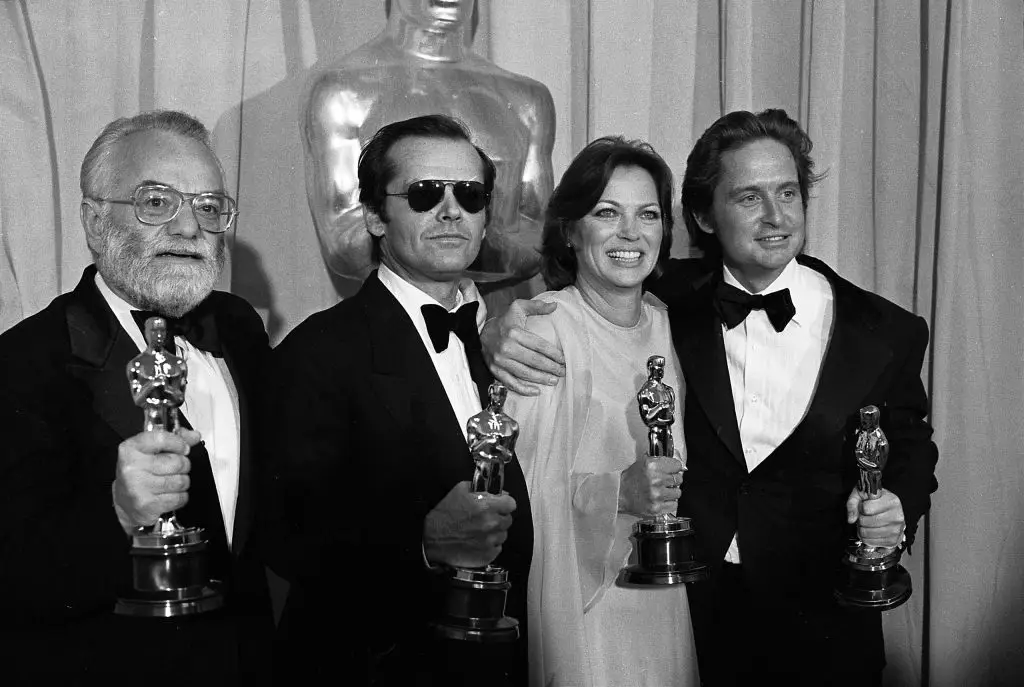 Saul Zaentz, Nicholson, Louise Fletcher, and Michael Douglas at the 1976 Academy Awards (Wiki Image).
Saul Zaentz, Nicholson, Louise Fletcher, and Michael Douglas at the 1976 Academy Awards (Wiki Image).
- 1970s Success: The 1970s were a defining decade for Nicholson, during which he became one of the industry’s most respected and sought-after actors. Essential films during this period include:
- “Five Easy Pieces” (1970): Nicholson’s portrayal of Bobby Dupea, a disillusioned oil rig worker with a complex past, earned him an Academy Award nomination for Best Actor.
- “The Last Detail” (1973): His role as a naval officer escorting a young sailor to prison garnered critical acclaim and another Academy Award nomination for Best Actor.
- “Chinatown” (1974): Nicholson played private detective Jake Gittes in this film noir classic directed by Roman Polanski. His performance is often cited as one of the greatest in film history, earning him another Academy Award nomination for Best Actor.
- “One Flew Over the Cuckoo’s Nest” (1975): Nicholson’s portrayal of Randle P. McMurphy, a rebellious inmate in a mental institution, won him his first Academy Award for Best Actor. The film itself won five major Academy Awards, including Best Picture.
Continued Success and Iconic Roles
 The costumes Nicholson wore in Batman (1989) as The Joker (Wiki Image).
The costumes Nicholson wore in Batman (1989) as The Joker (Wiki Image).
- 1980s: Nicholson continued to solidify his status as one of Hollywood’s top actors with roles in several iconic films:
- “The Shining” (1980): Directed by Stanley Kubrick, Nicholson’s performance as the unhinged writer Jack Torrance became one of history’s most iconic horror films. The film’s line “Here’s Johnny!” is one of the most famous in cinema.
- “Terms of Endearment” (1983): His role as retired astronaut Garrett Breedlove earned Nicholson his second Academy Award, this time for Best Supporting Actor.
- “Batman” (1989): Nicholson’s portrayal of the Joker in Tim Burton’s “Batman” was widely praised and added another memorable character to his repertoire. His performance set the standard for the character in future adaptations.
Later Career and Accolades
- 1990s: Nicholson continued to take on diverse roles throughout the 1990s, including:
- “A Few Good Men” (1992): His role as Colonel Nathan R. Jessup, particularly the line “You can’t handle the truth!” became iconic, earning him another Academy Award nomination.
- “As Good as It Gets” (1997): Nicholson won his third Academy Award for Best Actor for portraying the obsessive-compulsive novelist Melvin Udall. The film, which starred Helen Hunt, was a critical and commercial success.
- 2000s: In the 2000s, Nicholson continued to work with prominent directors and actors, appearing in films like “About Schmidt” (2002), which earned him another Academy Award nomination, “Something’s Gotta Give” (2003), and “The Departed” (2006), where he played the ruthless mob boss Frank Costello in Martin Scorsese’s crime drama.
Personal Life and Legacy
- Personal Life: Nicholson is known for his larger-than-life personality on and off the screen. He has been linked romantically with several actresses and has five children from various relationships. He is also a passionate fan of the Los Angeles Lakers and is frequently seen courtside at their games.
- Influence and Legacy: Jack Nicholson is considered one of the greatest actors ever. He is known for his versatility, charisma, and ability to bring complex characters to life. His work spans various genres and has left an indelible mark on American cinema. He has been nominated for the Academy Award twelve times, more than any other male actor, and has won three times.
- Retirement: Nicholson has not appeared in a film since 2010’s “How Do You Know,” leading to speculation about his retirement from acting. While he has not officially announced his retirement, he has largely stepped away from public life recently.
Honors and Recognition
- Awards and Honors: Throughout his career, Nicholson has received numerous awards and honors, including the American Film Institute’s Lifetime Achievement Award in 1994. He has also been honored with a star on the Hollywood Walk of Fame.
- Cultural Impact: Nicholson’s influence extends beyond his films. He is often cited as a cultural icon for his distinctive voice, mischievous grin, and irreverent sense of humor. His performances have inspired generations of actors, and his characters have become ingrained in popular culture.
Jack Nicholson’s career is a testament to his extraordinary talent, range, and enduring appeal. His contributions to film have earned him a place among the greatest actors in cinematic history, and his legacy continues to inspire and entertain audiences worldwide.
Jack Nicholson Movie Oscars
Academy Awards – Best Actor Nominations:
“Five Easy Pieces” (1970) – Nominated for Best Actor in a Leading Role.
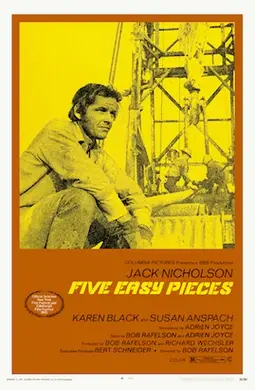
Theatrical release poster (Wiki Image).
- Bobby Dupea (Jack Nicholson):
“I move around a lot. Not because I’m looking for anything really, but because I’m getting away from things that get bad if I stay.”
- This quote encapsulates Bobby’s restless nature and his inability to find satisfaction or purpose in his life.
- Bobby Dupea:
“I’d like a plain omelet, no potatoes, tomatoes instead, a cup of coffee, and wheat toast.”
- This is the beginning of the famous diner scene where Bobby’s frustration with society’s rigidity and rules comes to a head.
- Bobby Dupea:
*“You see this sign?!”
*”Do you see this sign?”
- This line is from the continuation of the diner scene, where Bobby angrily confronts the waitress over the restaurant’s inflexible rules, symbolizing his broader frustrations with conformity.
- Bobby Dupea:
“What do you mean, sorry? Why do you think I put up with you? You know, I could have any other girl I want. I go out with you because you’re simple-minded enough to be satisfied with me.”
- Bobby expresses his deep dissatisfaction with his life and relationships, revealing his complex, often cruel, feelings towards his girlfriend, Rayette.
- Bobby Dupea:
“I played the piano. It used to make me feel kind of good.”
- This quote reflects Bobby’s lost passion for music, symbolizing the broader theme of lost potential and the struggle to find meaning in life.
Five Easy Pieces (1970) ORIGINAL TRAILER [HD 1080p]
(YouTube video)
Plot of “Five Easy Pieces”
“Five Easy Pieces” is a 1970 American drama film about Robert “Bobby” Eroica Dupea, a once-promising classical pianist who abandoned his musical career and wealthy, cultured family. He now works as an oil rig laborer in California, leading a life of disillusionment and drifting through various jobs and relationships.
Plot Overview:
- Bobby’s Life in California: The film begins with Bobby living in Southern California, working on an oil rig, and in a relationship with Rayette, a waitress who idolizes him. Despite his blue-collar lifestyle, Bobby feels disconnected and restless, unable to find satisfaction in his work or personal life. He spends his time drinking, carousing, and avoiding commitments.
- Return to His Family: After learning that his father, Nicholas, has suffered a stroke, Bobby reluctantly decides to return home. He leaves Rayette behind but, feeling guilty, later decides to bring her along despite their mismatched backgrounds. The road trip back to Washington State highlights their tension and differences and Bobby’s growing sense of entrapment.
- Reunion with the Family: Upon arriving at his family’s home, a grand estate on an island, Bobby reunites with his siblings and their partners. The Dupea family is cultured and intellectual, and Bobby’s return to this environment exposes the deep chasm between his current life and his past as a gifted pianist. He feels increasingly out of place and alienated from both his family and himself.
- Bobby’s Conflicts: During his stay, Bobby becomes involved with Catherine, his brother’s fiancée, and contemplates leaving Rayette. His internal conflicts and inability to connect meaningfully with anyone become more evident. A conversation with his mute and paralyzed father, where Bobby attempts to express his feelings of inadequacy and failure, becomes a pivotal moment in the film.
- Bobby’s Departure: In the end, Bobby leaves his life behind. In a final act of disconnection, he abandons Rayette at a gas station, leaving his car, wallet, and identity behind, and hitchhikes with a truck driver heading north. This ambiguous ending leaves Bobby’s future uncertain, but it emphasizes his ongoing search for meaning and inability to reconcile his past with his present.
Themes of “Five Easy Pieces”
- Alienation and Disillusionment: Bobby Dupea is profoundly alienated from his past and present. The film explores his disconnection from his family, work, and relationships, portraying a man who cannot find a place where he truly belongs.
- Class and Identity: The film juxtaposes Bobby’s working-class life with his upper-class upbringing. His rejection of his privileged background and classical music career highlights his internal struggle with identity and the societal expectations placed on him.
- The Search for Meaning: Bobby’s journey can be seen as a search for meaning in an empty and unfulfilled life. His rejection of various aspects of life—work, relationships, family—reflects his existential crisis and difficulty finding purpose.
- The Failure of Communication: Bobby struggles to communicate his true feelings to others and himself throughout the film. This theme is symbolized in his relationship with his father, where Bobby’s attempts to express his inner turmoil are met with silence. The breakdown of communication underscores the isolation and frustration felt by the characters.
- The Burden of Expectations: Bobby’s life is marked by the expectations of his family and society. His decision to abandon his promising career as a pianist and reject his privileged upbringing is an act of rebellion against these expectations. Still, it also leaves him adrift, without a clear sense of direction.
“Five Easy Pieces” is a powerful exploration of a man’s struggle with his identity, the pressures of societal norms, and the search for a sense of belonging in a world where he feels increasingly disconnected. The film’s portrayal of Bobby’s existential crisis resonates as a commentary on the broader human condition, particularly in the late 1960s and early 1970s disillusionment.
“The Last Detail” (1973) – Nominated for Best Actor in a Leading Role.
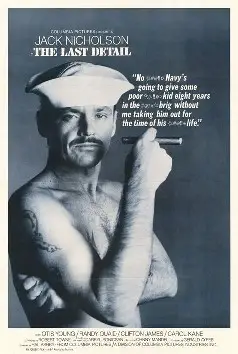
Theatrical release poster (Wiki Image).
- Billy “Badass” Buddusky (Jack Nicholson):
“I am the motherfucking shore patrol, motherfucker! I am the motherfucking shore patrol! Give this man a beer.”
- This quote is one of the film’s most famous lines, delivered with Nicholson’s signature intensity. It captures Buddusky’s mix of authority, rebellion, and humor as he asserts his power while on shore patrol duty.
- Billy “Badass” Buddusky:
“You ain’t gonna be no hard time in the brig. You’re gonna do easy time.”
- Buddusky tries to reassure the young sailor Meadows, whom he’s escorting to prison, attempting to ease his fears about the harshness of military confinement.
- Billy “Badass” Buddusky:
“I got a twenty-year-old piece of ass who calls me Big Daddy.”
- This line, delivered with bravado, reflects Buddusky’s larger-than-life personality and his attempt to maintain a tough, self-assured front.
- Mule Mulhall (Otis Young):
“We treat him like a prisoner, he’ll be a prisoner.”
- Mulhall, Buddusky’s more restrained and level-headed partner, recognizes Meadows’ humanity and suggests treating him with dignity, highlighting the film’s exploration of the tension between duty and compassion.
- Billy “Badass” Buddusky:
“They’ll do the same goddamn thing to you, you stupid f**! Can’t you see that?!”*
- This line shows Buddusky’s growing frustration with the military system and his realization of the futility and injustice of their mission, revealing his underlying sense of morality and fairness.
The Last Detail 1973 Trailer HD | Jack Nicholson | Randy Quaid
(YouTube video)
Plot of “The Last Detail”
“The Last Detail” (1973) is a drama-comedy directed by Hal Ashby, based on the novel by Darryl Ponicsan. The film follows the journey of two U.S. Navy sailors, Billy “Badass” Buddusky (Jack Nicholson) and Richard “Mule” Mulhall (Otis Young), who are assigned to escort a young, naive sailor named Larry Meadows (Randy Quaid) to a naval prison. Meadows has been sentenced to eight years for attempting to steal $40 from a charity box, a minor offense for which he receives a harsh punishment due to the influence of a high-ranking officer.
Plot Overview:
- The Mission: Buddusky and Mulhall are assigned to escort Meadows from their naval base in Norfolk, Virginia, to the naval prison in Portsmouth, New Hampshire. They initially see the assignment as an easy job that will allow them to collect some per diem money.
- The Journey: As they begin the trip, Buddusky and Mulhall realize that Meadows is an innocent, simple-minded young man with a difficult life. They pity him and decide to show him a good time before he loses his freedom. The trio travels through various cities, where Buddusky and Mulhall introduce Meadows to experiences he’s never had—getting drunk, visiting a brothel, and even ice skating.
- Bonding and Realizations: Throughout their journey, the three sailors develop a bond, and Buddusky, in particular, becomes increasingly angry about the injustice of Meadows’ harsh sentence. He begins questioning the military system and its role in enforcing its rigid rules. Despite their growing friendship and fun together, Meadows’ impending imprisonment looms over them.
- The Final Destination: Eventually, they reach the naval prison. Buddusky briefly considers helping Meadows escape, but the reality of their duty and the consequences they would face prevent them from doing so. Meadows resigns to his fate and is taken into custody. Buddusky and Mulhall, disillusioned by the experience, return to their ship.
Themes of “The Last Detail”
- Authority and Rebellion: The film explores the tension between authority and individual freedom. Buddusky and Mulhall, part of the military system, rebel against their roles as enforcers of unjust rules. Buddusky’s growing anger at the system represents the struggle between following orders and doing what is morally right.
- Injustice and Power: Meadows’ harsh punishment for a minor crime highlights the disproportionate use of power within the military hierarchy. The film critiques how authority can be wielded to enforce draconian measures, often with little regard for fairness or humanity.
- Camaraderie and Isolation: The bond that forms between the three sailors is central to the story. Their shared experiences create a sense of camaraderie, but this is ultimately overshadowed by the isolation each character feels—Meadows facing imprisonment, Buddusky grappling with his conscience, and Mulhall trying to reconcile his duty with his empathy for Meadows.
- The Loss of Innocence: Meadows represents innocence and naivety, and the journey serves as a rite of passage for him. He is exposed to the harsh realities of life and the corrupting influence of authority, leading to a loss of innocence that is both literal and symbolic.
- The Futility of Resistance: Despite Buddusky’s rebellious nature and his attempts to give Meadows a taste of freedom, the film ultimately shows the futility of resisting the system. The inevitability of Meadows’ imprisonment underscores the theme that some battles, especially against entrenched authority, are unwinnable.
“The Last Detail” is a poignant and darkly comedic exploration of the conflict between duty and morality, power abuse, and freedom’s fleeting nature. It’s a character-driven story that critiques the military system while highlighting the complexities of human relationships and the small, often futile, acts of rebellion against an unjust world.
“Chinatown” (1974) – Nominated for Best Actor in a Leading Role.
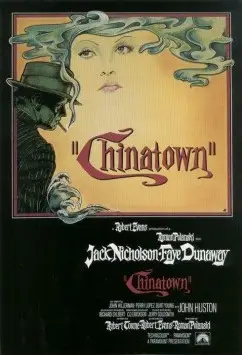
Theatrical release poster by Jim Pearsall (Wiki Image).
- Jake Gittes (Jack Nicholson):
“Forget it, Jake. It’s Chinatown.”
- This famous line is delivered by Gittes’ associate, Lieutenant Lou Escobar, at the end of the film. It encapsulates the film’s theme of inevitable corruption and the futility of fighting against it.
- Jake Gittes:
“You’re dumber than you think I think you are.”
- Jake uses this line to outwit a suspect during his investigation, showcasing his sharp wit and street-smart demeanor.
- Noah Cross (John Huston):
“I don’t blame myself. See, Mr. Gittes, most people never have to face the fact that at the right time and the right place, they’re capable of anything.”
- This chilling line reveals the depth of Noah Cross’s moral corruption and the dark truths about human nature that the film explores.
- Evelyn Mulwray (Faye Dunaway):
“She’s my sister and my daughter!”
- This shocking revelation is one of the film’s most dramatic moments, uncovering the disturbing truth about Evelyn’s family and the abuse she suffered.
- Jake Gittes:
*“What did you do in Chinatown?”
“As little as possible.”
- This exchange between Gittes and Evelyn hints at his past experiences in Chinatown, where his attempts to help only led to greater harm, setting the tone for the film’s themes of moral ambiguity and tragic inevitability.
(YouTube video)
Plot of “Chinatown” (1974)
“Chinatown” is a neo-noir mystery film set in 1930s Los Angeles. The film follows private investigator J.J. “Jake” Gittes (Jack Nicholson), who is hired by a woman claiming to be Evelyn Mulwray to investigate her husband, Hollis Mulwray, the chief engineer of the Los Angeles Department of Water and Power. She suspects him of infidelity. As Jake follows Mulwray, he uncovers a complex web of deceit, corruption, and murder.
Plot Overview:
- The Investigation Begins: Jake Gittes is hired by a woman posing as Evelyn Mulwray to spy on her husband, Hollis Mulwray. Gittes discovers that Hollis is involved in something far more significant than an affair—he’s investigating suspicious water diversions in Los Angeles during a severe drought. Soon after, Hollis is found dead under mysterious circumstances.
- The Real Evelyn Mulwray: The real Evelyn Mulwray (Faye Dunaway) confronts Jake, revealing that she never hired him. Realizing he’s been used, Gittes starts digging deeper into the case. As he investigates, he uncovers a conspiracy orchestrated by powerful business interests involving the manipulation of Los Angeles’ water supply.
- Uncovering Corruption: Jake’s investigation leads him to Noah Cross (John Huston), Evelyn’s father and a wealthy, influential landowner. Cross is involved in the water scandal, secretly diverting water to irrigate land in the San Fernando Valley, which he plans to buy cheaply and later sell at a massive profit once the city expands.
- Family Secrets and Tragedy: As he delves further into Evelyn’s family, Jake discovers a dark secret. Evelyn reveals that her sister is her daughter, the product of an incestuous relationship with her father, Noah Cross. This revelation adds a layer of personal tragedy to the corruption and greed that Jake is uncovering.
- The Tragic Conclusion: The film culminates in a confrontation in Chinatown, where Jake tries to protect Evelyn and her daughter from Noah Cross. However, the plan needs to be corrected. The police kill Evelyn, and Cross takes custody of the girl. Ultimately, Jake is left powerless and devastated, with his associate telling him, “Forget it, Jake. It’s Chinatown,” as a reminder of the futility of trying to bring justice to a world rife with corruption.
Themes of “Chinatown”
- Corruption and Power: The film critiques the abuse of power by those in authority. The central conspiracy revolves around manipulating the city’s water supply, with powerful figures like Noah Cross exploiting the system for personal gain. The film highlights how corruption is deeply entrenched in society, making it nearly impossible to fight.
- Moral Ambiguity: “Chinatown” operates in shades of gray, where the lines between good and evil are blurred. Jake Gittes, the protagonist, is a morally complex character who operates within a corrupt system. The film suggests that even well-intentioned actions can lead to tragic outcomes, reinforcing the idea that the world is not black and white.
- The Futility of Justice: One of the film’s central themes is the futility of seeking justice in a corrupt world. Despite Jake’s efforts to uncover the truth and protect Evelyn, he fails to bring about real change. The film ends on a note of despair, with the realization that corruption often goes unpunished, and the innocent suffer.
- The Past’s Haunting Presence: The film repeatedly returns to the theme of the past haunting the present. Jake’s past experiences in Chinatown, where his attempts to help only made things worse, parallel the events of the current case. Evelyn’s past, particularly her traumatic relationship with her father, also plays a significant role in the unfolding tragedy.
- Human Greed and Exploitation: “Chinatown” exposes the destructive power of greed, with the water conspiracy serving as a metaphor for how the pursuit of wealth and power leads to the exploitation and suffering of others. Noah Cross embodies this theme, willing to destroy lives, including those of his own family, to satisfy his insatiable greed.
“Chinatown” is a deeply cynical and tragic film that explores the dark underbelly of society, where corruption, greed, and the abuse of power prevail over justice and morality. The film’s complex narrative, rich in symbolism and noir elements, makes it a timeless exploration of the darker aspects of human nature and societal decay.
“One Flew Over the Cuckoo’s Nest” (1975) – Won Best Actor in a Leading Role.
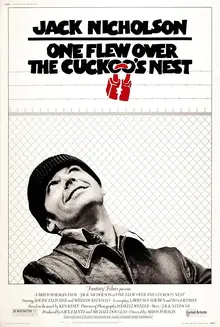
Theatrical release poster (Wiki Image).
Randle P. McMurphy (Jack Nicholson):
“You know, Billy, what worries me is how your mother is going to take this.”
- McMurphy uses this line to mock Nurse Ratched’s manipulative tactics, highlighting her control over the patients, particularly Billy Bibbit.
Randle P. McMurphy:
“But I tried, didn’t I? Goddammit, at least I did that.”
- McMurphy says this after a failed attempt to lift a heavy control panel, symbolizing his resistance against the oppressive system, even when he knows the odds are against him.
Chief Bromden (Will Sampson):
“Mac, they said you was committed and you was. You was.”
- This line reflects the Chief’s realization of the tragic truth about McMurphy’s fate and the institution’s power.
Nurse Ratched (Louise Fletcher):
“The best thing we can do is go on with our daily routine.”
- Nurse Ratched’s calm, detached response after a traumatic event underscores her cold, authoritarian approach to maintaining control over the ward.
Randle P. McMurphy:
“Well, I tried to take it easy, you know, but I just can’t do it.”
- McMurphy expresses his inability to conform to the oppressive rules of the mental institution, embodying his rebellious spirit and desire for freedom.
One Flew Over The Cuckoo’s Nest (1975) Official Trailer #1 …
(YouTube video)
The plot of “One Flew Over the Cuckoo’s Nest”
“One Flew Over the Cuckoo’s Nest” (1975) is a drama set in a mental institution. The film follows Randle P. McMurphy (Jack Nicholson), a rebellious, charismatic convict who feigns insanity to avoid prison labor and is sent to a mental hospital for evaluation. Upon arrival, McMurphy encounters the authoritarian Nurse Ratched (Louise Fletcher), who rules the ward with an iron fist, using psychological manipulation and strict control to maintain order.
Plot Overview:
- McMurphy’s Arrival: McMurphy enters the mental institution, hoping to serve the rest of his sentence in a more relaxed environment. He quickly realizes that the ward is controlled by Nurse Ratched, who maintains power through intimidation and manipulation—McMurphy’s free-spirited nature clashes with Ratched’s strict rules.
- Rebellion Against Authority: McMurphy befriends the other patients, who Ratched’s authoritarian methods have rejected. He becomes a leader among them, encouraging rebellion, organizing card games, betting, and even sneaking them out for a fishing trip. His actions inspire the patients to assert their individuality and challenge the oppressive system.
- The Power Struggle: The film’s central conflict is the power struggle between McMurphy and Nurse Ratched. While McMurphy tries to bring joy and freedom to the patients’ lives, Ratched uses her authority to suppress any signs of independence. The tension between them escalates as McMurphy’s influence over the patients grows, threatening Ratched’s control.
- The Tragic Climax: The conflict reaches its peak when McMurphy organizes a late-night party in the ward, during which one of the patients, Billy Bibbit, has a romantic encounter. Nurse Ratched manipulates Billy into feeling shame, leading to his tragic suicide. Enraged, McMurphy attacks Ratched but is ultimately subdued by the orderlies.
- McMurphy’s Fate and Chief’s Escape: In retaliation, McMurphy is subjected to a lobotomy, rendering him a mere shell of his former self. In a final act of mercy, Chief Bromden (Will Sampson), a fellow patient whom McMurphy had befriended, smothers McMurphy to end his suffering. Chief then escapes from the institution, symbolizing a small victory in the face of overwhelming oppression.
Themes of “One Flew Over the Cuckoo’s Nest”
- Institutional Oppression and Power: The film is a critique of the oppressive nature of institutions that strip individuals of their autonomy. Nurse Ratched represents the dehumanizing power of such systems, using psychological control to maintain order, while McMurphy embodies resistance to this oppressive authority.
- Individuality vs. Conformity: A central theme is the struggle between individuality and conformity. McMurphy’s rebellious spirit clashes with the institution’s enforced conformity, symbolizing the broader human desire for freedom and self-expression in the face of societal pressure to conform.
- Sanity and Insanity: The film blurs the line between sanity and insanity, questioning what it means to be “sane” in a world governed by rigid rules and norms. McMurphy, who is arguably the most sane character, is ultimately destroyed by a system that punishes nonconformity, while the “insane” patients are often more self-aware and human than their keepers.
- The Cost of Rebellion: While McMurphy’s rebellion brings temporary joy and liberation to the patients, it also leads to tragic consequences. The film explores the high cost of challenging authority, as McMurphy’s ultimate fate demonstrates the dangers of resisting a powerful and unyielding system.
- Freedom and Escape: The theme of freedom is pervasive throughout the film, with McMurphy’s character representing the human yearning for liberty. Chief Bromden’s final escape is symbolic of this theme, offering a glimmer of hope that even in the most oppressive circumstances, the desire for freedom can survive.
“One Flew Over the Cuckoo’s Nest” is a powerful exploration of the human spirit’s struggle against oppressive forces, the importance of individuality, and the high stakes of rebellion in a world that seeks to control and conform. The film’s tragic yet inspiring narrative continues to resonate as a timeless commentary on the nature of freedom and the human condition.
“Prizzi’s Honor” (1985) – Nominated for Best Actor in a Leading Role.
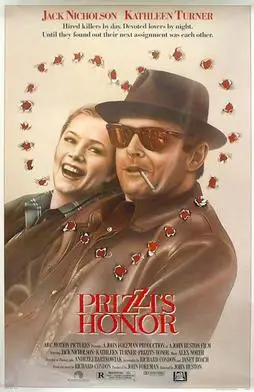
Theatrical release poster (Wiki Image).
Charley Partanna (Jack Nicholson):
“If you want to be a killer, do it. If you want to be a lover, be it. You can’t be both.”
- Charley reflects on the conflict between his professional life as a hitman and his personal desires.
Irene Walker (Kathleen Turner):
“Do I ice her? Do I marry her? Which one of these?”
- Irene sarcastically comments on the choices she faces, reflecting the dark humor and moral ambiguity that permeates the film.
Charley Partanna:
“If Marxie Heller’s so fking smart, how come he’s so fking dead?”
- Charley uses this line to emphasize the ironic and often lethal outcomes in the world of organized crime.
Maerose Prizzi (Anjelica Huston):
“Just because I’m a nice girl, it doesn’t mean I can’t take care of myself.”
- Maerose asserts her independence and strength despite the traditional expectations placed on her by her mob family.
Charley Partanna:
“I love you, Irene. God help us both.”
- This line captures the central dilemma of the film—Charley’s deep feelings for Irene despite the dangerous complications their relationship brings.
(YouTube video)
Plot of “Prizzi’s Honor” (1985)
“Prizzi’s Honor” is a dark comedy directed by John Huston, based on the novel by Richard Condon. The film centers around Charley Partanna (Jack Nicholson), a hitman for the Prizzi crime family, who becomes romantically involved with Irene Walker (Kathleen Turner), a woman with a hidden agenda. The plot unfolds as Charley navigates a web of deceit, loyalty, and betrayal within the mob world.
Plot Overview:
- Charley Partanna’s Life: Charley Partanna is a loyal hitman for the Prizzi crime family, known for his efficiency and dedication to the mob. His life takes a turn when he meets Irene Walker, a woman who appears to be a sophisticated and charming socialite.
- Romantic Entanglements: Charley falls deeply in love with Irene, and they begin a passionate affair. Unbeknownst to Charley, Irene has her own agenda—she is involved with the mafia in a more dangerous way than she initially lets on. She is secretly working with a rival crime organization, and her connection to Charley puts him in a precarious position.
- Family Ties and Betrayal: Charley’s involvement with Irene complicates matters further when it is revealed that she has also been romantically linked to the Prizzi family. This creates a conflict of interest and tension within the crime family. As Charley is drawn deeper into Irene’s schemes, he becomes entangled in a series of betrayals and double-crosses.
- Moral and Ethical Dilemmas: Charley is faced with a dilemma as he discovers the truth about Irene and her true motives. He must reconcile his loyalty to the Prizzi family with his feelings for Irene, all while dealing with the fallout of their deceitful actions.
- Resolution and Consequences: The film culminates in a dramatic and ironic conclusion as Charley’s actions and the consequences of his relationship with Irene come to a head. The resolution is marked by a mix of dark humor and tragic irony, highlighting the complexities of loyalty, love, and betrayal within the criminal underworld.
Themes of “Prizzi’s Honor”
- Loyalty and Betrayal: A central theme of the film is the conflict between loyalty to one’s family and personal relationships. Charley’s devotion to the Prizzi crime family is tested by his romantic involvement with Irene, who is ultimately revealed to be involved in her own form of betrayal. The film explores how loyalty can be both a strength and a vulnerability.
- Moral Ambiguity: “Prizzi’s Honor” delves into the moral complexities of its characters, particularly Charley. The film portrays a world where the demands of the criminal underworld blur traditional notions of right and wrong. Characters often act out of self-interest, leading to morally ambiguous situations.
- Romantic Entanglements: The film examines the impact of romantic relationships on individuals’ decisions and actions. Charley’s relationship with Irene serves as a catalyst for the unfolding drama, highlighting how love and desire can complicate personal and professional lives.
- Irony and Dark Humor: The film uses dark humor and irony to underscore the absurdities of the characters’ situations and the often tragic outcomes of their actions. The juxtaposition of comedy and drama emphasizes the unpredictable nature of life within the crime world.
- Family Dynamics: The Prizzi family dynamic plays a significant role in the film, illustrating how familial bonds and power structures within organized crime can lead to conflict and betrayal. The family’s expectations and values shape the characters’ actions and decisions throughout the story.
“Prizzi’s Honor” combines elements of crime, romance, and dark comedy to explore themes of loyalty, betrayal, and moral complexity within the context of organized crime. The film’s intricate plot and character development provide a satirical yet insightful look at the consequences of living a life steeped in deception and violence.
“Ironweed” (1987) – Nominated for Best Actor in a Leading Role.
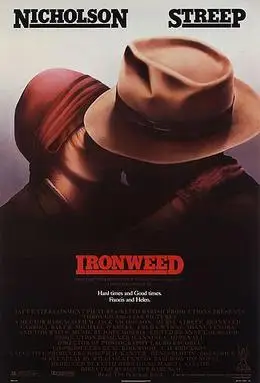
Theatrical release poster by John Alvin (Wiki Image).
Francis Phelan (Jack Nicholson):
“You see, I’m in a big hole. And I can’t get out of it, not even if I try.”
- Francis reflects on his deep sense of despair and entrapment, highlighting his struggles with addiction and personal failures.
Helen (Meryl Streep):
“I’ve been waiting for you to come back to me, but I’ve been waiting so long that I don’t even know if you’re real anymore.”
- Helen expresses her feelings of abandonment and uncertainty, reflecting the complex nature of her relationship with Francis and her own emotional turmoil.
Francis Phelan:
“I’m afraid of what I’ll do if I stay here.”
- This quote captures Francis’s fear of his own actions and the destructive path he’s on, emphasizing his internal conflict and self-doubt.
Francis Phelan:
“It’s a hard world, but I’m not going to give up.”
- Despite his struggles, Francis’s determination to continue fighting against the hardships of life is evident in this line.
Helen:
“We’re all just trying to find a little bit of peace in this world, even if it’s just for a moment.”
- Helen’s line reflects the film’s exploration of the search for solace and meaning amidst the chaos and suffering of life.
(YouTube video)
Plot of “Ironweed” (1987)
“Ironweed,” directed by Héctor Babenco and based on William Kennedy’s novel, follows Francis Phelan (Jack Nicholson), an alcoholic drifter who returns to Albany, New York, in the 1930s after a long absence. He reunites with his estranged wife, Helen (Meryl Streep), and confronts his troubled past while trying to find redemption. The film delves into themes of poverty, addiction, and the search for personal salvation.
Plot Overview:
- Return to Albany: Francis Phelan, a former laborer and drifter, returns to his hometown of Albany after years of wandering. He reconnects with Helen, his estranged partner, who is also struggling with alcoholism and poverty. Their reunion is marked by a mix of unresolved feelings, past grievances, and a shared sense of desperation.
- Confronting the Past: As Francis tries to make amends for his past mistakes, he is haunted by memories of his failed relationships, including his responsibility for the death of his own child. His attempts to reconnect with his family and seek forgiveness are complicated by his ongoing struggles with alcoholism and his inability to escape his troubled past.
- Desperate Lives: The film depicts the harsh realities of life during the Great Depression, focusing on Francis and Helen’s interactions with other marginalized individuals in their community. They encounter a variety of characters who are also struggling with poverty, addiction, and loss.
- Struggles and Redemption: Throughout the film, Francis’s journey is marked by a series of personal struggles and moments of clarity. He grapples with his guilt and attempts to find redemption by helping others and making amends. However, his efforts are often thwarted by his own self-destructive behavior and the harsh realities of his environment.
- Final Resolution: The film concludes with a sense of ambiguous resolution. Francis’s attempts to seek redemption and reconcile with his past are met with limited success, and his relationship with Helen remains fraught with tension and unresolved issues. The ending reflects the complexities of their lives and the ongoing struggle for peace and understanding.
Themes of “Ironweed”
- Poverty and Social Marginalization: The film highlights the harsh realities of poverty and social exclusion during the Great Depression. Francis and Helen’s experiences illustrate the struggles faced by individuals on the margins of society, struggling to survive in a world that offers little support or hope.
- Addiction and Self-Destruction: Addiction is a central theme in “Ironweed,” with both Francis and Helen struggling with alcoholism. The film explores the ways in which addiction impacts their lives, relationships, and attempts at redemption, emphasizing the cycle of self-destruction and the difficulty of breaking free.
- Guilt and Redemption: Francis’s journey is driven by a desire for redemption and reconciliation with his past. The film examines the burden of guilt and the challenge of seeking forgiveness for past mistakes. Francis’s attempts to atone for his actions are contrasted with his ongoing struggles and the obstacles he faces.
- Family and Relationships: The film delves into the complexities of family relationships, particularly between Francis and Helen. Their strained and conflicted relationship reflects broader themes of love, betrayal, and the difficulty of maintaining connections in the face of personal failings and external challenges.
- Existential Struggle and Search for Meaning: “Ironweed” presents a deep existential struggle as characters search for meaning and purpose in their lives. The film portrays their quest for solace and understanding amidst the chaos and suffering, highlighting the often elusive nature of peace and fulfillment.
“Ironweed” offers a poignant exploration of human frailty, the impact of addiction, and the quest for redemption, set against the backdrop of economic hardship and social marginalization. The film’s themes are deeply intertwined with its portrayal of the characters’ struggles and their search for meaning in a challenging world.
“As Good as It Gets” (1997) – Won Best Actor in a Leading Role.

Theatrical release poster (Wiki Image).
- Melvin Udall (Jack Nicholson):
“You make me want to be a better man.”
- Melvin expresses his deep feelings for Carol, acknowledging how she has inspired him to improve himself.
- Carol Connelly (Helen Hunt):
“I’m going to have to deal with you on the basis of what I see. You’re not gonna get a chance to tell me that you’re a good person.”
- Carol confronts Melvin about his behavior, highlighting the challenge of seeing past his abrasive exterior.
- Melvin Udall:
“I’m not just trying to be difficult. I’m trying to be honest.”
- Melvin emphasizes his struggle with expressing his true feelings and intentions, reflecting his difficulty with emotional honesty.
- Simon Bishop (Greg Kinnear):
“You know what I like about you? You’re not afraid to say what you really think.”
- Simon appreciates Melvin’s bluntness, recognizing it as a rare and valuable trait.
- Carol Connelly:
“I just want to be able to look back and say that I did something good.”
- Carol reflects on her desire to make a positive impact and find meaning in her life.
As Good as It Gets (1997) Trailer #1 | Movieclips Classic Trailers
(YouTube video)
Plot of “As Good as It Gets” (1997)
“As Good as It Gets” is a romantic comedy-drama directed by James L. Brooks, featuring Jack Nicholson as Melvin Udall, Helen Hunt as Carol Connelly, and Greg Kinnear as Simon Bishop. The film explores themes of personal transformation, love, and the complexities of human relationships through the lives of its main characters.
Plot Overview:
- Melvin Udall’s Life: Melvin Udall is a successful but deeply flawed romance novelist with obsessive-compulsive disorder (OCD). His life is marked by routine and an abrasive personality, causing friction with those around him. He lives a solitary existence in New York City, with little regard for others.
- Carol Connelly’s Struggles: Carol Connelly is a waitress at the restaurant where Melvin frequently dines. She is a single mother struggling to make ends meet while dealing with her own personal challenges. Carol’s interactions with Melvin are strained, given his difficult behavior and constant demands.
- Simon Bishop’s Crisis: Simon Bishop is a gay artist who lives in the same building as Melvin. After a violent attack leaves him injured and unable to work, Melvin reluctantly agrees to help Simon by taking care of his dog. This unexpected act of kindness leads to a developing friendship between the two men.
- Evolving Relationships: As Melvin interacts more with Simon and Carol, his outlook on life changes. His genuine concern for Simon’s well-being and budding romantic feelings for Carol pushes him to confront his own issues and make efforts to change.
- Personal Growth and Redemption: Throughout the film, Melvin’s interactions with Carol and Simon prompt him to reevaluate his behavior and relationships. A gradual but significant transformation marks his journey as he tries to become a better person. Carol also experiences growth as she learns to balance her own needs with her responsibilities.
- Resolution: The film concludes with Melvin making strides in improving his behavior and relationships. He reaches out to Carol, expressing his feelings and demonstrating his commitment to change. The resolution highlights the possibility of redemption and the impact that love and kindness can have on personal growth.
Themes of “As Good as It Gets”
- Personal Transformation and Redemption: The film explores the theme of personal growth through Melvin’s character. His journey from a self-centered, abrasive individual to someone capable of love and change illustrates the potential for redemption and self-improvement.
- Love and Connection: Love is a central theme in the film, particularly how it can inspire and facilitate personal growth. Melvin’s evolving relationships with Carol and Simon showcase the transformative power of love and human connection.
- Isolation and Relationships: The film addresses the theme of isolation, as each character struggles with their own form of loneliness and disconnectedness. Through their interactions, they begin to form meaningful relationships that challenge their isolation and bring them closer to understanding and acceptance.
- Compassion and Empathy: Melvin’s journey highlights the importance of compassion and empathy. His initial indifference towards others evolves into a genuine concern for their well-being, demonstrating how empathy can lead to positive change.
- Challenges of Mental Illness: Melvin’s OCD is portrayed with sensitivity and realism, addressing the challenges faced by those with mental health issues. The film portrays his condition as a significant barrier to his ability to form healthy relationships but also shows the potential for improvement with support and effort.
“As Good as It Gets” combines humor and drama to explore these themes, presenting a heartfelt story about the potential for change and the impact of love and human connection on personal growth.
“About Schmidt” (2002) – Nominated for Best Actor in a Leading Role.
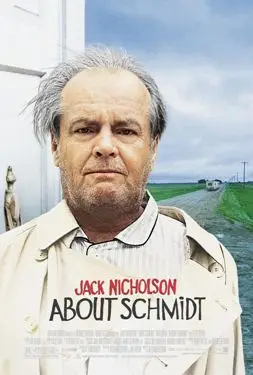
Theatrical release poster (Wiki Image).
Warren Schmidt (Jack Nicholson):
“I’m not sure what I’m going to do now. I guess I’m just going to try to enjoy the time I have left.”
- Warren reflects on his uncertain future and the opportunity to find meaning after retirement and personal loss.
Warren Schmidt:
“I’m sure you think I’m an old fool, but I’m doing what I think is right.”
- This quote highlights Warren’s self-awareness and the internal conflict he faces as he tries to reconcile his actions with his sense of purpose.
Warren Schmidt:
“You know, when I was younger, I thought I’d be able to look back and say that I did something significant. But I’m not sure if I did.”
- Warren grapples with feelings of inadequacy and the search for significance in his life’s work and achievements.
Warren Schmidt:
“I’m a little worried about my daughter. She seems to be making a lot of bad decisions.”
- Warren expresses his concerns about his daughter’s life choices, reflecting his role as a parent and his desire to guide her.
Warren Schmidt:
“I can’t believe how much time I wasted. I could have been doing something worthwhile.”
- This quote encapsulates Warren’s regret and realization about the passage of time and the opportunities he feels he has missed.
About Schmidt (2002) Official Trailer – Jack Nicholson, Kathy …
(YouTube video)
Plot of “About Schmidt” (2002)
“About Schmidt,” directed by Alexander Payne, follows Warren Schmidt (Jack Nicholson), a recently retired and widowed insurance actuary who embarks on a journey of self-discovery and reflection. The film explores Warren’s struggle to find meaning and purpose in the wake of his retirement and the death of his wife.
Plot Overview:
- Retirement and Loss: Warren Schmidt retires from his job as an insurance actuary after the death of his wife, Helen. He is left feeling adrift and uncertain about his future. His retirement party and the subsequent events reveal the lack of fulfillment and emotional connection he experienced throughout his life.
- The Road Trip: In the wake of his wife’s death, Warren decides to drive across the country to attend his daughter Jeannie’s wedding to a man he disapproves of, Randall Hertzel. This road trip becomes a journey of self-discovery as Warren confronts his past, his regrets, and his feelings of inadequacy.
- Personal Reflection: As Warren travels, he reflects on his life and relationships. He writes letters to a Tanzanian orphan named Ndugu, whom he sponsors, sharing his thoughts and experiences. These letters serve as a vehicle for Warren’s introspection and self-examination.
- Family Dynamics: Warren’s relationship with his daughter is strained, particularly due to her choice of husband and her departure from her own career ambitions. He is critical of Randall and his lifestyle, struggling to understand and accept his daughter’s decisions.
- Realizations and Resolutions: Throughout the film, Warren comes to terms with his own shortcomings and missed opportunities. He acknowledges the emotional distance he maintained from his family and the lack of meaningful connections in his life. The film concludes with Warren gaining a semblance of peace and acceptance as he reflects on his journey.
Themes of “About Schmidt”
- Search for Meaning: A central theme of the film is Warren’s quest for meaning and purpose in his retirement and after his wife’s death. The film explores his struggle to find significance in his life and legacy as he confronts his past and future.
- Personal Reflection and Regret: Warren’s journey is marked by reflection on his past decisions and the life he led. The film delves into themes of regret, missed opportunities, and the realization of how he has lived his life.
- Family and Relationships: Warren’s strained relationship with his daughter Jeannie highlights themes of familial disconnection and the difficulty of understanding and accepting family members’ choices. The film explores how familial relationships can be fraught with misunderstanding and conflict.
- Isolation and Connection: Warren’s sense of isolation is a recurring theme in the film. His emotional detachment from his family and colleagues underscores his struggle to form meaningful connections. His interactions with others on his journey reflect his desire to bridge the gap between himself and the world around him.
- Identity and Legacy: The film examines Warren’s sense of identity and how he perceives his own legacy. It questions what constitutes a meaningful life and how individuals come to terms with their accomplishments and shortcomings.
“About Schmidt” is a poignant and darkly comedic exploration of a man coming to terms with his life and seeking redemption and connection in his later years. The film’s themes are deeply tied to Warren’s personal journey and the reflections he faces along the way.
Academy Awards – Best Supporting Actor Nominations:
“Easy Rider” (1969) – Nominated for Best Supporting Actor.
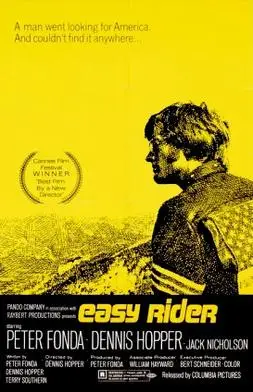
Theatrical release poster (Wiki Image).
- Captain America (Peter Fonda):
“We blew it.”
- Reflecting on the disillusionment and failure of the idealistic dreams of the 1960s counterculture.
- Billy (Dennis Hopper):
“We’ll be back in a couple of days. Keep the brakes warm.”
- A line that exemplifies the carefree and rebellious spirit of the two main characters as they embark on their journey.
- George Hanson (Jack Nicholson):
“I mean, we blew it. We blew it all to hell.”
- George’s moment of realization about the lost potential and disillusionment with the American Dream.
- Captain America:
“You know, it’s real hard to get your arms around it, but there’s a lot of people out there who don’t have nothing to do with you.”
- Reflecting on the social and cultural divide between the counterculture and mainstream America.
- George Hanson:
“You know, I’m really sick of this.”
- This expresses George’s frustration and existential weariness as he comes to terms with the harsh realities of their journey and the society around them.
Easy Rider – Intro – Born to be wild!
(YouTube video)
Plot of “Easy Rider” (1969)
“Easy Rider,” directed by Dennis Hopper, follows two bikers, Captain America (Peter Fonda) and Billy (Dennis Hopper), as they travel across the American South and West in search of freedom and the American Dream. The film captures the countercultural spirit of the 1960s and the challenges faced by those seeking to live outside conventional societal norms.
Plot Overview:
- The Journey Begins: The film opens with Captain America and Billy completing a drug deal in Los Angeles and using the money to embark on a cross-country motorcycle trip. They seek to explore the freedom of the open road and experience the American landscape in a way that breaks from societal expectations.
- Encounters and Experiences: As they travel through various parts of the American South and West, the two bikers encounter a range of people and experiences that reflect the cultural and social tensions of the era. Their interactions with others highlight the clash between their countercultural ideals and mainstream values.
- Meeting George Hanson: Along the way, they meet George Hanson (Jack Nicholson), a lawyer who joins them on their journey. George is disillusioned with his own life and finds a sense of purpose in their shared quest for freedom. His presence adds a layer of complexity to their journey and highlights the themes of disillusionment and search for meaning.
- Confrontations and Conflict: The bikers face hostility and prejudice from some of the people they encounter, particularly in rural areas. Their nonconformity and appearance lead to conflict, revealing the deep-seated cultural divides and the challenges faced by those who challenge societal norms.
- Tragic Ending: The film reaches a tragic conclusion as Captain America and Billy are brutally attacked and killed by a group of locals who resent their presence and countercultural ideals. The ending underscores the harsh realities and violence that can accompany the pursuit of freedom and nonconformity.
Themes of “Easy Rider”
- Freedom and Nonconformity: Central to the film is the theme of freedom and the desire to live outside conventional societal constraints. Captain America and Billy’s journey represents a quest for personal liberation and the pursuit of an idealized version of the American Dream.
- Disillusionment with the American Dream: The film explores the theme of disillusionment with the American Dream. Despite their pursuit of freedom and happiness, the bikers encounter a society that is resistant to their ideals and ultimately rejects them.
- Cultural and Social Divides: “Easy Rider” highlights the cultural and social divides of the 1960s, particularly the conflict between the countercultural movement and mainstream American values. The film depicts the tension between different ways of life and the challenges faced by those who do not conform to societal norms.
- Search for Meaning: The film delves into the existential quest for meaning and purpose. The characters, particularly George Hanson, grapple with their own sense of identity and fulfillment, reflecting a broader search for significance in a rapidly changing world.
- Violence and Intolerance: The film addresses the themes of violence and intolerance, particularly as the bikers face hostility and aggression from those who view them as outsiders. The tragic ending underscores the dangers faced by those who challenge societal expectations and seek to live differently.
“Easy Rider” is a landmark film that captures the spirit of the 1960s counterculture and explores themes of freedom, disillusionment, and societal conflict through the journey of its protagonists.
“Reds” (1981) – Nominated for Best Supporting Actor.
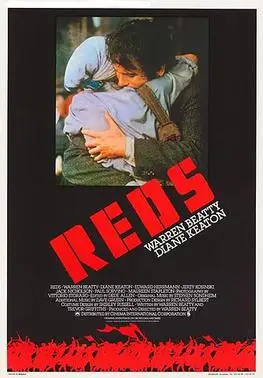
Theatrical release poster (Wiki Image).
John Reed (Warren Beatty):
“I think it’s time for me to take a stand. If we don’t take a stand, who will?”
- Reed reflects on the importance of taking action and standing up for one’s beliefs, highlighting his commitment to revolutionary ideals.
Louise Bryant (Diane Keaton):
“You can’t make a revolution without a lot of people who don’t understand what’s going on.”
- Louise Bryant acknowledges the complexity of revolutionary movements and the challenge of mobilizing support from those who may not fully grasp the issues.
John Reed:
“There’s something wrong with this country. Everything is out of joint.”
- Reed expresses his dissatisfaction with the state of America, emphasizing his belief that significant social and political change is needed.
Eugene O’Neill (Jack Nicholson):
“You’re in love with a dream, not a person.”
- O’Neill critiques Reed’s idealism and his tendency to be more enamored with revolutionary concepts than with the realities of human relationships.
Louise Bryant:
“I’m trying to live up to your dream, but I’m not sure what the dream is anymore.”
- Louise grapples with her own confusion and the difficulties of aligning her life with Reed’s revolutionary vision.
(YouTube video)
Plot of “Reds” (1981)
“Reds,” directed by Warren Beatty, is a historical drama that follows the life of John Reed (played by Beatty), an American journalist and socialist who chronicled the Russian Revolution in his book “Ten Days That Shook the World.” The film also focuses on Reed’s relationship with Louise Bryant (Diane Keaton) and his interactions with prominent figures such as Eugene O’Neill (Jack Nicholson). The plot delves into Reed’s political activism, personal life, and the broader context of revolutionary movements.
Plot Overview:
- Introduction to John Reed and Louise Bryant: The film introduces John Reed, a passionate journalist and socialist, and his relationship with Louise Bryant, a writer and activist. Their dynamic is central to the story as they navigate their personal and political lives.
- The Russian Revolution: Reed travels to Russia to cover the Bolshevik Revolution, witnessing and documenting its significant events. His experiences in Russia shaped his political views and his commitment to the cause.
- The Impact of Revolution: Reed and Bryant’s involvement in revolutionary activities tests their relationship. The film portrays their difficulties as they reconcile their desires with revolutionary ideals.
- Personal Struggles and Relationships: The film explores the complexities of Reed and Bryant’s relationship and Reed’s interactions with other key figures, including Eugene O’Neill. Their struggles and differing perspectives on the revolution highlight the challenges of living a life dedicated to political change.
- Legacy and Reflection: The film concludes with a reflection on Reed’s legacy and the impact of his work. The portrayal of Reed’s contributions and the revolutionary ideals he championed is contrasted with the realities of his personal life and the challenges he faced.
Themes of “Reds”
- Revolutionary Ideals and Activism: A central theme of “Reds” is the commitment to revolutionary ideals and the impact of political activism. The film explores Reed’s dedication to socialism and his role in documenting and supporting the Russian Revolution.
- Personal vs. Political Life: The film examines the tension between personal desires and political commitments. Reed and Bryant’s relationship illustrates the difficulties of balancing personal relationships with the demands of political activism.
- Idealism and Disillusionment: “Reds” portrays the idealism of revolutionary movements and the subsequent disillusionment that can arise. The characters grapple with the gap between their revolutionary dreams and the practical realities of political change.
- Historical and Social Change: The film provides a historical perspective on the Russian Revolution and its global impact. It reflects on the broader social and political changes of the early 20th century and the role of individuals in shaping these events.
- Legacy and Impact: Reed’s work and influence on political thought explore the theme of legacy. The film reflects on how individuals contribute to historical movements and how their work is remembered and interpreted.
“Reds” provides a nuanced portrayal of revolutionary activism, personal relationships, and the challenges of living a life dedicated to political ideals. The film combines historical events with personal drama to offer a comprehensive view of John Reed’s life and the broader context of his work.
“Terms of Endearment” (1983) – Won Best Supporting Actor.
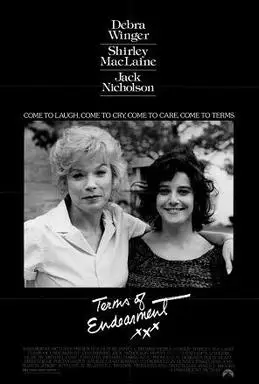
Theatrical release poster (Wiki Image).
- Aurora Greenway (Shirley MacLaine):
“I’m going to tell you a story about your father. When I met him, he was a gas station attendant. He was very handsome, and he had a smile that could turn the sun into moonlight.”
- Aurora reflects on her past and the romanticized memories of her late husband.
- Emma Horton (Debra Winger):
“I’m just a little bit in love with you. I don’t want to be in love with you. I don’t want to have to deal with it. I just want to love you, and that’s it.”
- Emma expresses her conflicting feelings about her relationship and her desire to simplify her emotions.
- Aurora Greenway:
“I’ve come to realize that the best way to get something done is to be a little bit more selfish.”
- Aurora acknowledges her own personal growth and the realization that self-care is important.
- Emma Horton:
“I have to get out of here. I have to get away from the hospital. I want to be with you and my children. I want to be with the people I love.”
- Emma’s desire to be with her loved ones reflects her emotional state as she faces a serious illness.
- Aurora Greenway:
“I’ll always love you. I’ll always be here for you. I’ll always be your mother, and that will never change.”
- Aurora reassures Emma of her unconditional love and support, emphasizing the depth of their mother-daughter bond.
Terms of Endearment (1983) Trailer #1 | Movieclips Classic …
(YouTube video)
Plot of “Terms of Endearment” (1983)
“Terms of Endearment,” directed by James L. Brooks, is a poignant and often humorous film that explores the complex and evolving relationship between a mother, Aurora Greenway, and her daughter, Emma Horton. The story spans several decades, focusing on their personal growth, family dynamics, and the impact of life’s challenges.
Plot Overview:
- Mother-Daughter Relationship: The film begins with Aurora Greenway (Shirley MacLaine), a strong-willed and somewhat overbearing mother, and her daughter Emma (Debra Winger), who is eager to assert her independence. The story follows their relationship through various stages of their lives, illustrating both the love and conflict that define their bond.
- Emma’s Marriage and Family Life: Emma marries Flap Horton (Jeff Daniels), a man with whom she has a turbulent relationship. The film explores the challenges Emma faces in her marriage, including infidelity and financial difficulties, as well as her role as a mother to her children.
- Aurora’s Romantic Life: Aurora, who initially seems focused on controlling Emma’s life, embarks on her own journey of self-discovery and romance. Her relationships, including one with a charming but unreliable man, are a significant part of the film, highlighting her quest for personal fulfillment.
- Emma’s Illness: The plot takes a dramatic turn when Emma is diagnosed with terminal cancer. Her illness becomes a central focus, affecting her family and revealing the depth of her relationships with those around her. Aurora’s role as a caretaker and her emotional growth are key elements of the story.
- Resolution and Reflection: The film concludes with Emma’s passing and the impact it has on her family. Aurora’s transformation and the resolution of her relationship with Emma are poignant moments that reflect the enduring strength of their bond.
Themes of “Terms of Endearment”
- Family and Relationships: At its core, the film is about the complexities of family relationships, particularly between a mother and daughter. It explores the dynamics of love, support, and conflict within the family unit, highlighting both the challenges and the deep connections that define these relationships.
- Love and Sacrifice: The film examines the nature of love and the sacrifices people make for those they care about. Emma’s dedication to her family, despite her personal struggles, and Aurora’s evolving understanding of love and sacrifice are central themes.
- Personal Growth and Self-Discovery: Both Aurora and Emma undergo significant personal growth throughout the film. Aurora’s journey to find her own happiness and Emma’s struggle to balance her roles as a wife, mother, and individual reflect themes of self-discovery and change.
- Dealing with Illness and Loss: The film addresses the emotional and practical challenges of dealing with terminal illness and loss. Emma’s battle with cancer and her family’s response to her illness is portrayed with sensitivity and depth, highlighting the impact of health crises on personal and family dynamics.
- Resilience and Hope: Despite the difficulties and tragedies faced by the characters, the film ultimately conveys a message of resilience and hope. The characters’ ability to support each other and find meaning in their relationships is a testament to their strength and perseverance.
“Terms of Endearment” combines humor and drama to offer a rich exploration of familial love, personal growth, and the trials of life, making it a touching and enduring film.
“A Few Good Men” (1992) – Nominated for Best Supporting Actor.
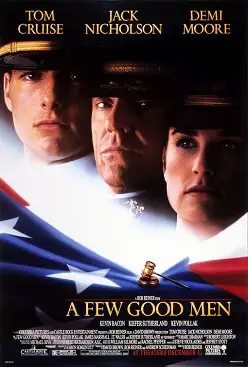
Original theatrical release poster (Wiki Image).
- Colonel Jessup (Jack Nicholson):
“You can’t handle the truth!”
- This iconic line is delivered during a tense courtroom confrontation, highlighting the film’s central theme of confronting uncomfortable truths.
- Lt. Kaffee (Tom Cruise):
“I’m asking you to answer the question, Lieutenant. Did you order the Code Red?”
- This quote is pivotal in the courtroom scene where Lt. Kaffee presses Colonel Jessup for the truth about the illegal order.
- Lt. Daniel Kaffee (Tom Cruise):
“It doesn’t matter what I believe. It only matters what I can prove.”
- Lt. Kaffee emphasizes the importance of evidence and legal strategy in the pursuit of justice.
- Lt. Commander Galloway (Demi Moore):
“I want the truth! You can’t handle the truth!”
- Galloway’s insistence on uncovering the truth reflects the film’s focus on accountability and integrity.
- Colonel Jessup:
“We live in a world that has walls, and those walls have to be guarded by men with guns. Who’s gonna do it? You? You, Lt. Weinberg?”
- Jessup’s rant underscores his belief in the necessity of harsh measures for maintaining order and discipline.
A FEW GOOD MEN [1992] – Official Trailer (HD)
(YouTube video)
Plot of “A Few Good Men” (1992)
“A Few Good Men,” directed by Rob Reiner, is a legal drama centered around a military court case involving the death of a Marine and the subsequent trial of two Marines accused of murder. The film explores themes of justice, military discipline, and moral responsibility.
Plot Overview:
- The Incident: The story begins with the death of a Marine, Private Santiago, at the Guantanamo Bay naval base. Two Marines, Lance Corporal Dawson and Private Downey, are accused of killing Santiago during a “Code Red” (an unofficial punishment) that was allegedly ordered by their superior, Colonel Jessup.
- The Defense Team: Lt. Daniel Kaffee (Tom Cruise), a young, inexperienced lawyer, is assigned to defend Dawson and Downey. He is assisted by Lt. Commander Galloway (Demi Moore) and Lt. Weinberg (Kevin Pollak). Kaffee initially approaches the case with a casual attitude, but as he delves deeper, he becomes increasingly committed to uncovering the truth.
- The Investigation: Kaffee and Galloway investigate the circumstances surrounding Santiago’s death and the military culture at Guantanamo Bay. They discover evidence suggesting that Santiago’s death was a result of a direct order from Colonel Jessup (Jack Nicholson), who is known for his authoritarian style and rigid adherence to the military code.
- The Courtroom Drama: The film’s climax occurs in the courtroom, where Kaffee confronts Jessup. During a heated exchange, Jessup famously declares, “You can’t handle the truth!” revealing his belief in the necessity of harsh discipline for maintaining military order.
- The Verdict: The trial concludes with Dawson and Downey being found guilty of a lesser charge but not of murder. Jessup is ultimately exposed for his role in the illegal order, and the film ends with a reflection on the nature of military justice and personal responsibility.
Themes of “A Few Good Men”
- Justice and Accountability: The film examines the pursuit of justice within the military justice system. It explores the challenges of holding powerful individuals accountable for their actions and the moral dilemmas faced by those who seek the truth.
- Military Discipline and Authority: “A Few Good Men” delves into the complexities of military discipline and the tension between strict adherence to orders and ethical considerations. Colonel Jessup’s character embodies the tension between the need for order and the consequences of abusive authority.
- Moral Responsibility: The film explores the theme of moral responsibility, particularly the idea that individuals must be accountable for their actions and decisions, even within a rigid hierarchical system like the military.
- Truth and Integrity: The quest for truth and the importance of integrity are central themes. The film highlights the struggle to uncover the truth in the face of powerful opposition and the ethical challenges faced by those in positions of power.
- Courage and Commitment: Lt. Kaffee’s transformation from a complacent lawyer to a dedicated advocate reflects the theme of personal growth and the courage required to stand up for what is right, even when facing significant obstacles.
“A Few Good Men” combines courtroom drama with a critical examination of military ethics and personal responsibility, making it a powerful and thought-provoking film.
Wishing Academy Awards
“The Shining” (1980)
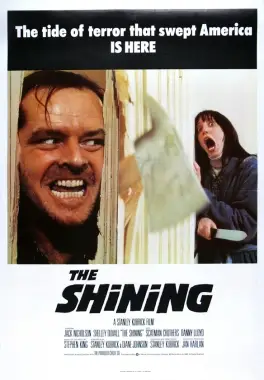 Theatrical release poster (Wiki Image)
Theatrical release poster (Wiki Image)
- “Here’s Johnny!”
- Perhaps the most iconic line in the movie, delivered by Nicholson as his character Jack Torrance smashes through a bathroom door with an axe.
- “Wendy, darling, light of my life! I’m not gonna hurt ya. I’m just gonna bash your brains in.”
- Jack tries to convince his terrified wife, Wendy, of his intentions in a menacing tone.
- “All work and no play makes Jack a dull boy.”
- This line is revealed repeatedly as Wendy discovers that Jack has been typing this sentence repeatedly, a chilling sign of his descent into madness.
- “Heeere’s Johnny!”
- Another version of the famous line that Jack delivers as he breaks through the door cements this as a terrifying catchphrase.
- “I’m not gonna hurt ya. I’m just gonna bash your brains in!”
- Jack’s disturbing dialogue with Wendy while he stalks her with an axe showcases his character’s chilling transformation.
(YouTube video)
Plot of The Shining (1980):
The Shining follows Jack Torrance (played by Jack Nicholson), an aspiring writer who takes a job as the winter caretaker of the isolated Overlook Hotel, nestled in the mountains of Colorado. He moves in with his wife, Wendy (Shelley Duvall), and their young son, Danny (Danny Lloyd), who possesses a psychic ability known as “the shining” that allows him to see the hotel’s horrific past. As winter sets in and they are snowbound, Jack’s mental state begins to unravel. Influenced by the sinister presence in the hotel, he descends into madness and becomes increasingly violent, ultimately attempting to murder his family. Meanwhile, Danny’s shining abilities reveal terrifying visions, and with the help of the hotel’s head cook, Dick Hallorann, he tries to escape the escalating horror. The climax culminates with Jack’s pursuit of his family through the hotel’s hedge maze.
Themes in The Shining (1980):
- Madness and Psychological Breakdown:
Jack Torrance’s descent into madness is central to the plot. Isolated and tormented by his inner demons, the supernatural forces of the hotel, and writer’s block, Jack’s fragile mental state disintegrates, leading him to become violent and unhinged. The film explores how isolation can magnify personal flaws and drive individuals to madness. - Supernatural Evil:
The Overlook Hotel is portrayed as a malevolent entity, influencing Jack’s behavior and revealing its dark, haunted history through visions. The supernatural forces that haunt the hotel are woven into its architecture and past, making the hotel itself a character in the story. This theme raises questions about whether Jack’s madness is driven by the supernatural or simply his psychological decline. - Isolation and Loneliness:
The film highlights the effects of isolation on the human mind. The vast, empty spaces of the hotel, combined with the isolation from the outside world during the long winter, create a suffocating atmosphere that amplifies Jack’s descent into madness. The Torrance family’s isolation symbolizes physical and emotional detachment as Jack becomes more distant from Wendy and Danny. - Violence and Domestic Abuse:
Jack’s increasing violence toward Wendy and Danny underscores themes of domestic abuse. As his mental state deteriorates, the film explores the toxic effects of patriarchal dominance and rage as Jack directs his frustrations and failures onto his family, culminating in physical violence. - Corruption of Innocence:
Danny, the innocent child with psychic abilities, becomes vulnerable to the hotel’s dark forces. His gift, the “shining,” exposes him to horrific visions and supernatural dangers. The theme of lost innocence is prevalent, as Danny’s exposure to evil forces strips away his childhood purity. - Time and Fate:
The film’s ambiguous ending, where Jack appears in a photograph from 1921, suggests themes of reincarnation, eternal evil, or a time loop. It implies that Jack may have been destined to come to the Overlook Hotel, trapped in a repeating cycle of violence and insanity, reinforcing the idea that the hotel’s evil is inescapable.
Overall, The Shining is a psychological horror film that blends themes of madness, isolation, supernatural evil, and the breakdown of family dynamics. Its ambiguous and unsettling nature has made it a horror and psychological thriller classic.
Laurence Olivier History
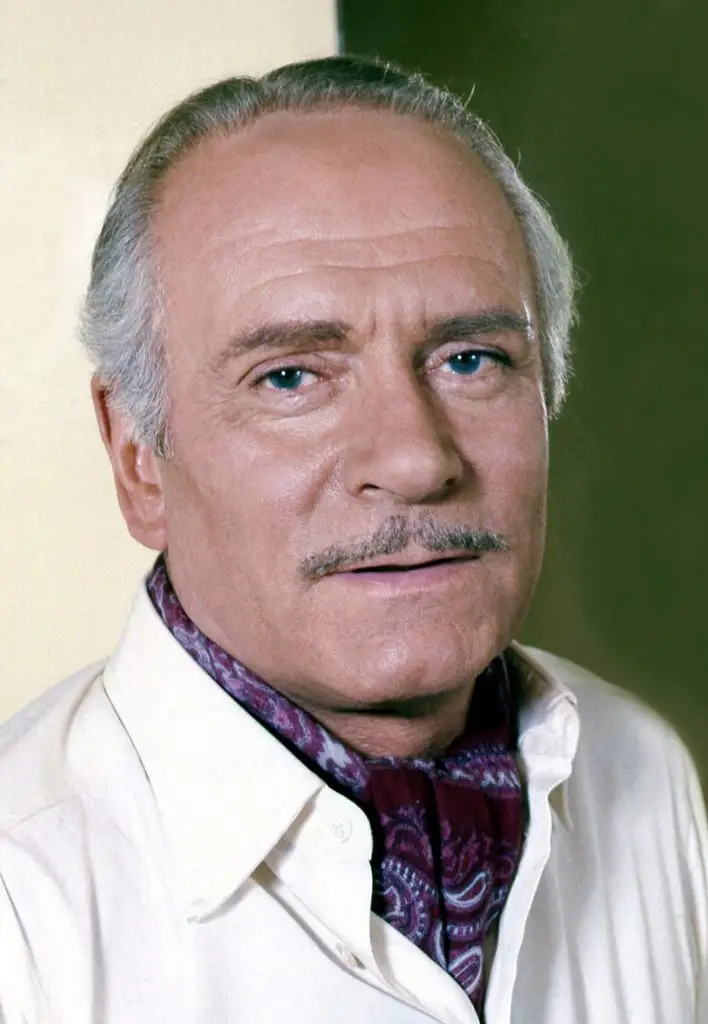
Olivier in 1972 (Wiki Image).
- “I take a simple view of life: keep your eyes open and get on with it.”
- Olivier’s pragmatic approach to life and work emphasizes focus and perseverance.
- “Acting is illusion, as much illusion as magic is, and not so much a matter of being real.”
- His perspective on the art of acting highlights the importance of creating an illusion rather than merely replicating reality.
- “What is acting but lying, and what is good lying but convincing lying?”
- Olivier’s reflection on the nature of acting describes it as the art of convincing deception.
- “The office of drama is to exercise, possibly to exhaust, human emotions. The purpose of comedy is to tickle those emotions into an expression. The purpose of tragedy is to wound them into expression.”
- A thoughtful observation on the different purposes of dramatic genres and their effects on the audience.
- “Without acting, I cannot breathe.”
- A declaration of his deep passion for the craft of acting, indicating its essential place in his life.
- “The actor should be able to create the universe in the palm of his hand.”
- Olivier believed in the power and responsibility of actors to convey vast emotional and thematic content in their performances.
- “Surely we have a duty to guide our children’s morals, not to infect them with our own.”
- His perspective on parenting and the responsibility to provide moral guidance rather than impose one’s flaws on the next generation.
- “I believe in the theater; I believe in it as the first glamorizer of thought. It restores dramatic dynamics and their relations to life-size.”
- Olivier’s strong belief in the transformative and educational power of theater.
- “I’d like people to think of me as someone who cares about them.”
- A humble expression of his desire to be remembered not just for his talent but for his kindness and care for others.
- “When you’re a young man, Macbeth is a character part. When you’re older, it’s a straight part.”
- His reflection on the evolving nature of Shakespearean roles as an actor ages indicates the depth and complexity of these characters.
| Movie Title | Year Released | Role | Plot Summary | Key Themes |
|---|---|---|---|---|
| Wuthering Heights | 1939 | Heathcliff | A tragic love story set on the Yorkshire moors, where Heathcliff, an orphan, rises to wealth but is consumed by revenge and lost love. | Love, revenge, class, tragedy |
| Rebecca | 1940 | Maxim de Winter | A young bride moves to her husband’s estate, haunted by the memory of his first wife, Rebecca. | Jealousy, mystery, obsession, identity |
| Pride and Prejudice | 1940 | Mr. Darcy | Adaptation of Jane Austen’s novel, focusing on the romance between Elizabeth Bennet and the proud, aloof Mr. Darcy. | Social class, love, prejudice |
| Henry V | 1944 | King Henry V | Shakespeare’s play about King Henry V’s leadership during the Battle of Agincourt in the Hundred Years’ War. | Leadership, patriotism, war |
| Hamlet | 1948 | Prince Hamlet | A royal prince returns home to avenge his father’s murder in this adaptation of Shakespeare’s iconic tragedy. | Revenge, madness, betrayal |
| Richard III | 1955 | Richard III | In Shakespeare’s historical play, Olivier portrays the ruthless and manipulative King Richard III. | Power, manipulation, ambition |
| The Prince and the Showgirl | 1957 | Charles, Prince Regent of Carpathia | A light romantic comedy where a foreign prince falls in love with a showgirl during a visit to England. | Romance, class difference, comedy |
| The Entertainer | 1960 | Archie Rice | An aging, bitter music hall performer struggles to maintain relevance while his family life collapses around him. | Failure, disillusionment, aging |
| Spartacus | 1960 | Marcus Licinius Crassus | In this epic film, a gladiator leads a rebellion against the Roman Empire, with Crassus as one of his powerful enemies. | Freedom, rebellion, power |
| Othello | 1965 | Othello | Olivier takes on the role of Shakespeare’s tragic Moorish general, manipulated into jealousy and murder by Iago. | Jealousy, racism, betrayal, tragedy |
| Marathon Man | 1976 | Dr. Christian Szell | A suspense thriller where Olivier plays a Nazi war criminal hiding in the U.S., hunted by a young graduate student. | Trust, survival, revenge |
| Sleuth | 1972 | Andrew Wyke | A wealthy mystery writer lures his wife’s lover into a deadly game of cat and mouse in this tense psychological thriller. | Deception, power, class, revenge |
| The Boys from Brazil | 1978 | Ezra Lieberman | Olivier plays a Nazi hunter tracking down Josef Mengele, who is involved in cloning Adolf Hitler. | Revenge, morality, science fiction |
| The Clash of the Titans | 1981 | Zeus | In this mythological fantasy, Olivier plays the god Zeus, who watches over Perseus’ battle against various monsters and gods. | Mythology, heroism, fate |
| Carrie | 1952 | George Hurstwood | A romantic drama where Hurstwood, a respectable man, loses everything due to his relationship with a young woman. | Tragedy, downfall, romance |
| The Bounty | 1984 | Admiral Hood | This historical drama tells the story of the mutiny aboard the HMS Bounty, with Olivier in a supporting role as an Admiral. | Rebellion, leadership, justice |
The Secret Life Of Laurence Olivier
Sir Laurence Olivier on the ‘Genius’ of Marlon Brando | The …
Laurence Olivier – Interview – Kenneth Tynan – BBC – 1966 …
Sir Laurence Olivier talks about Marilyn Monroe!
Sir Laurence Olivier was fired by Greta Garbo | The Dick …
(YouTube video)
Laurence Olivier, often regarded as one of the greatest actors of the 20th century, had a prolific career spanning stage and screen, leaving an indelible mark on both. Here’s a detailed look at his life and achievements:
Early Life and Background
- Birth and Family: Laurence Kerr Olivier was born on May 22, 1907, in Dorking, Surrey, England. He was the youngest of three children in a devout Anglican family. His father, Gerard Kerr Olivier, was a clergyman, and his mother, Agnes Louise Crookenden, was the daughter of a British Consul in India.
- Education and Early Interest in Acting: Olivier’s interest in acting was encouraged by his family, particularly his father. He attended All Saints Choir School in London and began performing in school plays. At age 10, Olivier played Brutus in a school production of “Julius Caesar,” a role that sparked his lifelong passion for Shakespeare. He later attended the Central School of Speech and Drama, where he trained formally as an actor.
Early Career
- Stage Beginnings: Olivier’s professional debut came in 1925 with a role in “The Merchant of Venice” at the Birmingham Repertory Theatre. His early career was primarily on the stage, where he quickly gained a reputation for his powerful voice, classical training, and dynamic presence.
- London and West End: By the late 1920s, Olivier had established himself on the London stage, performing in various classical and contemporary plays. His performance as Tony in Noël Coward’s “Private Lives” (1930) was particularly well-received and marked the beginning of his rise to stardom.
Rise to Prominence
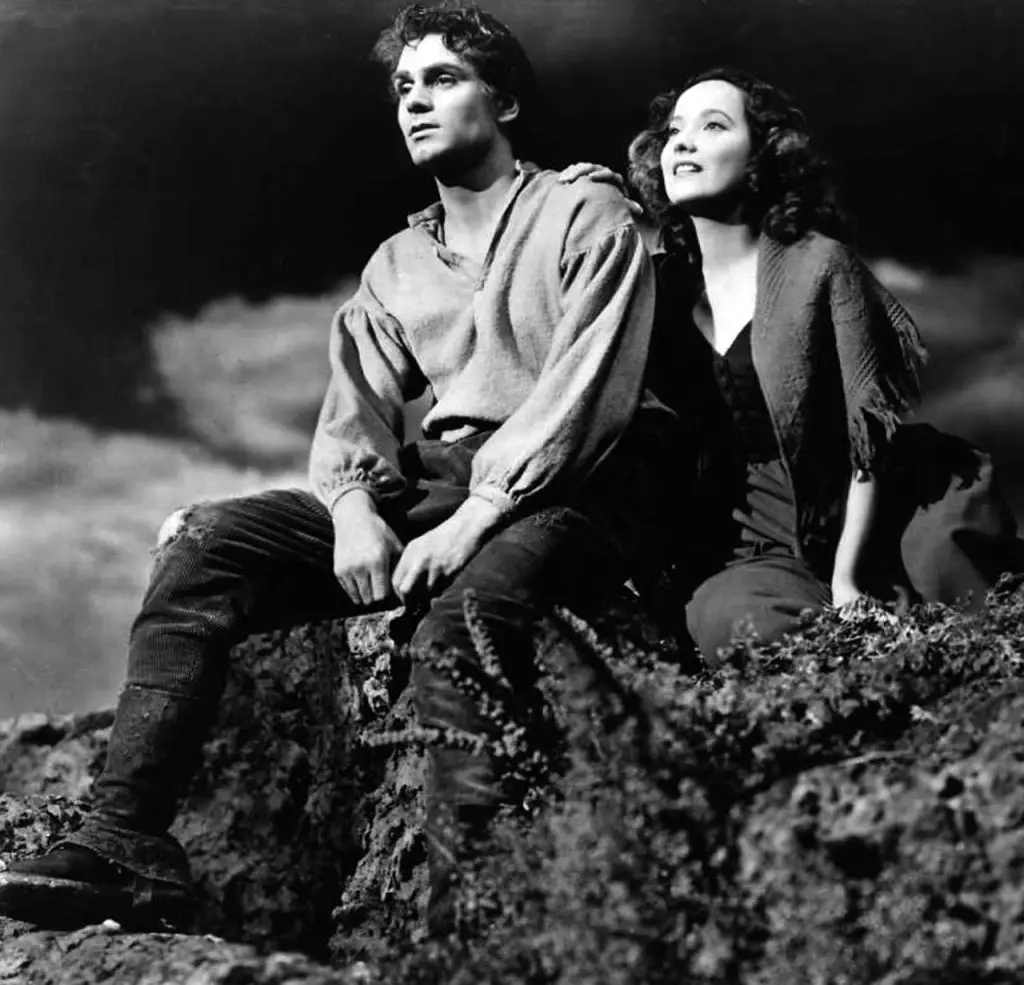 Olivier, with Merle Oberon in the 1939 film Wuthering Heights (Wiki Image).
Olivier, with Merle Oberon in the 1939 film Wuthering Heights (Wiki Image).
- Shakespearean Roles: Olivier’s reputation as one of the greatest Shakespearean actors of his generation was solidified in the 1930s and 1940s. He became known for interpreting Shakespeare’s most complex characters, including Hamlet, Othello, Macbeth, and Richard III. His performances were lauded for their intensity, psychological depth, and innovative approach.
- Film Career Begins: Olivier’s film career began in the late 1930s, but his role as Heathcliff in “Wuthering Heights” (1939) brought him international fame. His brooding portrayal of the tormented lover earned him his first Academy Award nomination for Best Actor.
World War II and Leadership at the Old Vic
- World War II Service: During World War II, Olivier was a pilot in the Royal Navy’s Fleet Air Arm. Despite his military service, he continued to work in theater and film, balancing his duties with his artistic pursuits.
- Leadership at the Old Vic: In 1944, Olivier was appointed co-director of the Old Vic Theatre in London alongside Ralph Richardson and John Burrell. Under their leadership, the Old Vic became one of the most prestigious theaters in the world, with Olivier at the forefront of its success. His performances in productions such as “Henry V,” “Othello,” and “Hamlet” were celebrated for their innovation and emotional power.
Film Director and International Fame
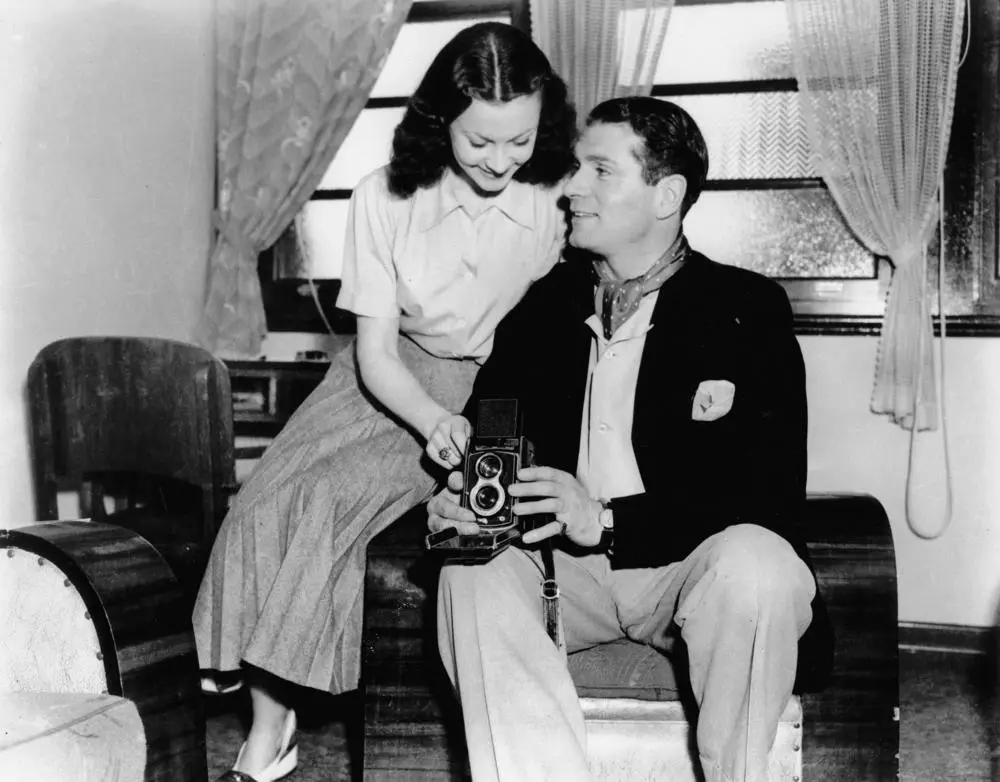 Olivier with Leigh in Australia, 1948 (Wiki Image).
Olivier with Leigh in Australia, 1948 (Wiki Image).
- Shakespearean Films: Olivier’s directorial debut came with the film adaptation of “Henry V” (1944), in which he also starred. The film was a critical and commercial success, earning him an honorary Academy Award for his outstanding achievement as an actor, producer, and director. He went on to direct and star in two more Shakespearean films: “Hamlet” (1948), for which he won the Academy Award for Best Actor, and “Richard III” (1955).
- Hollywood Success: Olivier’s success in Hollywood continued with films such as “Rebecca” (1940), directed by Alfred Hitchcock, and “Hamlet” (1948), which became the first British film to win the Academy Award for Best Picture. His performances in these films cemented his status as one of the world’s leading actors.
Later Career and Legacy
- Versatility in Film: In the later stages of his career, Olivier demonstrated his versatility as an actor, taking on a wide range of roles in both British and American films. Notable performances include his role as the sadistic Nazi dentist in “Marathon Man” (1976), which earned him another Academy Award nomination, and his portrayal of an aging actor in “The Entertainer” (1960).
- Honors and Recognition: Olivier received numerous accolades throughout his career, including four Academy Awards, two BAFTA Awards, five Emmy Awards, and three Golden Globe Awards. In 1947, he was knighted for his contributions to British theater, and in 1970, he was made a life peer, becoming Baron Olivier of Brighton, the first actor to be honored.
- National Theatre: In 1963, Olivier became the founding director of the National Theatre in London, where he served until 1973. His leadership and vision helped establish the National Theatre as a major cultural institution in the UK.
Personal Life
- Marriages: Olivier was married three times. His first marriage was to actress Jill Esmond in 1930, but the marriage was troubled and ended in divorce in 1940. In 1940, he married actress Vivien Leigh, with whom he had a famously passionate and tumultuous relationship. They divorced in 1960. Olivier’s third marriage was to actress Joan Plowright in 1961, a union that lasted until his death.
- Health Struggles: In his later years, Olivier suffered from various health issues, including respiratory problems and cancer. Despite these challenges, he continued to work, often appearing in films and television roles that showcased his enduring talent.
Death and Legacy
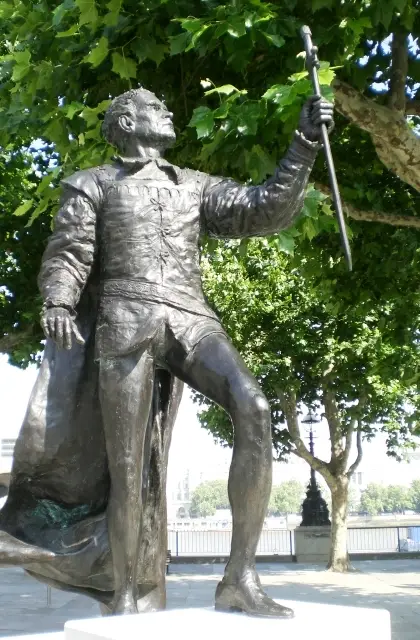 Statue of Lord Olivier outside the National Theatre (Wiki Image).
Statue of Lord Olivier outside the National Theatre (Wiki Image).
- Death: Laurence Olivier passed away on July 11, 1989, at 82, at his home in Ashurst, West Sussex, England. His death marked the end of an era in British theater and film, but his legacy as one of the greatest actors ever lived on.
- Cultural Impact: Olivier’s influence on acting is immeasurable. He is often cited as a master of classical and modern roles, known for his ability to inhabit a character fully. His Shakespearean performances, in particular, are considered benchmarks in interpreting the Bard’s work. His films continue to be studied and admired by actors, directors, and audiences alike.
- Olivier Awards: In recognition of his contributions to the arts, the Olivier Awards, Britain’s most prestigious theater awards, were named in his honor. These awards continue to celebrate excellence in professional theater in London’s West End.
Laurence Olivier’s career is a testament to his extraordinary talent, dedication, and influence in acting. His work on stage and screen has left an enduring legacy that inspires and resonates with audiences worldwide.
Laurence Olivier Movie Oscars
Academy Awards – Best Actor Nominations:
“Wuthering Heights” (1939) – Nominated for Best Actor in a Leading Role.
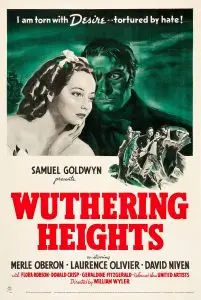
Theatrical release poster (Wiki Image).
Heathcliff (Laurence Olivier):
“Whatever our souls are made of, his and mine are the same.”
- Cathy’s declaration of her deep, almost spiritual connection with Heathcliff emphasizes the intensity of their bond.
Cathy Earnshaw (Merle Oberon):
“I am Heathcliff! He’s always, always in my mind… Not as a pleasure, any more than I am always a pleasure to myself, but as my own being.”
- Cathy identifies with Heathcliff, showing how inseparable they are in spirit.
Heathcliff:
“I cannot live without my soul.”
- Heathcliff’s anguished statement after Cathy’s death highlights his belief that Cathy is his very soul.
Cathy Earnshaw:
“I wish I could hold you… till we were both dead!”
- Cathy’s wish to be with Heathcliff forever, even in death, reflects the tragic, consuming nature of their love.
Ellen (Flora Robson):
“I cannot understand how you can turn from the ways of loving kindness and take pride in fostering your bitter nature.”
- Ellen, the housekeeper, expresses concern about Heathcliff’s vengeful and bitter disposition, pointing out his destructive nature.
Wuthering Heights Official Trailer #1 – David Niven Movie …
(Youtube video)
Plot of “Wuthering Heights” (1939)
The 1939 adaptation of Emily Brontë’s novel “Wuthering Heights,” directed by William Wyler, centers on the passionate and tragic love story between Heathcliff and Cathy Earnshaw, set against the moody backdrop of the English moors.
Plot Overview:
- Heathcliff’s Arrival: The story begins when Mr. Earnshaw, the owner of Wuthering Heights, brings home an orphaned boy named Heathcliff. Heathcliff grows up in the Earnshaw household, forming a close bond with Mr. Earnshaw’s daughter, Cathy, but he is treated cruelly by her brother, Hindley.
- Love Between Heathcliff and Cathy: As Heathcliff and Cathy grow older, their bond deepens into an intense, almost obsessive love. However, their love is complicated by social status and personal pride. Cathy desires the comfort and status offered by her wealthy neighbor, Edgar Linton, while Heathcliff is driven by a mix of love for Cathy and resentment over his lowly position.
- Cathy’s Marriage: Cathy ultimately marries Edgar Linton for his wealth and social position despite her love for Heathcliff. This decision devastates Heathcliff, who leaves Wuthering Heights only to return years later, wealthy and intent on revenge.
- Heathcliff’s Revenge: Upon his return, Heathcliff seeks vengeance against those who wronged him, particularly Hindley and Edgar. He manipulates situations to gain control over Wuthering Heights and the Linton family estate, Thornfield.
- Cathy’s Death: The tension between Heathcliff, Cathy, and Edgar escalates, leading to Cathy’s physical and emotional decline. Cathy’s death is the climax of the film, leaving Heathcliff heartbroken and consumed by grief and rage. The film ends with a haunting portrayal of Heathcliff’s undying love for Cathy, suggesting their spirits are reunited on the moors.
Themes of “Wuthering Heights” (1939)
- Love and Obsession: The central theme of “Wuthering Heights” is the intense, often destructive love between Heathcliff and Cathy. Their relationship transcends ordinary love, becoming an obsession that dictates their lives and leads to their downfall.
- Revenge and Hatred: Heathcliff’s love for Cathy is intertwined with his deep-seated hatred and desire for revenge against those who wronged him, particularly Hindley and Edgar. His actions are driven by a need to assert power and exact vengeance, which ultimately consumes him.
- Class and Social Status: The film explores the theme of social class, particularly how it impacts relationships and personal identity. Cathy’s decision to marry Edgar for social status, despite her love for Heathcliff, reflects the pressures of class distinctions and the sacrifices individuals make for societal acceptance.
- Isolation and the Moors: The setting of the Moors plays a significant role in the story, symbolizing the isolation and wildness of the characters’ emotions. The moors are a place of both freedom and desolation, reflecting the tumultuous inner lives of Heathcliff and Cathy.
- The Supernatural and Eternal Love: The film touches on themes of the supernatural, particularly in its portrayal of Heathcliff’s belief that his love for Cathy transcends death. The ending suggests that their spirits are eternally bound, haunting the moors together, which adds a gothic element to the story.
“Wuthering Heights” (1939) is a powerful tale of love, vengeance, and the consequences of unchecked emotions, set in a hauntingly beautiful but desolate landscape. The film remains a classic for its intense portrayal of these timeless themes.
“Rebecca” (1940) – Nominated for Best Actor in a Leading Role.
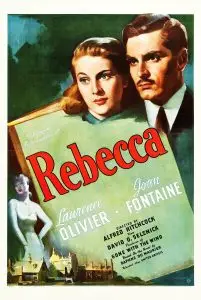
Theatrical release poster (Wiki Image).
- Mrs. Danvers (Judith Anderson):
“I can see you’re nervous. Why don’t you stay here awhile and rest, and I’ll go down to the party and tell them you’re coming. It’s a lovely room, isn’t it? Lovely. The loveliest room you’ve ever seen.”
- Mrs. Danvers, the sinister housekeeper, tries to manipulate the new Mrs. de Winter by drawing her into Rebecca’s old room, emphasizing Rebecca’s eerie, omnipresent memory.
- Maxim de Winter (Laurence Olivier):
“I hated her, you understand? I hated her! But I never had the courage to do anything about it. If she were alive now, she’d laugh at me.”- Maxim reveals his true feelings about his late wife, Rebecca, exposing the dark and complex emotions that have been hidden beneath the surface.
- The Second Mrs. de Winter (Joan Fontaine):
“Last night I dreamt I went to Manderley again.”- This iconic opening line of the film sets the tone for the haunting, dream-like quality of the story and the second Mrs. de Winter’s obsession with Manderley and Rebecca.
- Mrs. Danvers:
“She’s still mistress here, even though she’s dead.”- Mrs. Danvers coldly asserts Rebecca’s continuing influence over Manderley, underscoring the film’s themes of lingering presence and the power of memory.
- Maxim de Winter:
“We’re not meant for happiness, you and I.”- Maxim’s pessimistic outlook on life and relationships reflects the tragic and doomed nature of his love with the second Mrs. de Winter, as well as the shadow cast by Rebecca.
Rebecca (1940) Alfred Hitchcock | Full HD Movie | Joan …
(YouTube video)
Plot of “Rebecca” (1940)
“Rebecca,” directed by Alfred Hitchcock and based on Daphne du Maurier’s novel, is a psychological thriller and gothic romance that tells the story of a young, naive woman who marries a wealthy widower, Maxim de Winter, only to find herself living in the shadow of his first wife, Rebecca.
Plot Overview:
- The New Mrs. de Winter: The film begins with the young, unnamed protagonist meeting and quickly marrying Maxim de Winter, a brooding widower. They return to his sprawling estate, Manderley, where the new Mrs. de Winter soon finds herself overshadowed by the memory of Rebecca, Maxim’s first wife, who died in a mysterious boating accident.
- Life at Manderley: At Manderley, the new Mrs. de Winter struggles to fit into her new role. She is constantly compared to Rebecca by the household staff, particularly the sinister housekeeper, Mrs. Danvers, who is fiercely loyal to the memory of Rebecca. Mrs. Danvers subtly and overtly manipulates the new bride, making her feel inadequate and unwelcome.
- The Mystery of Rebecca: As the story unfolds, the new Mrs. de Winter becomes increasingly obsessed with Rebecca, learning more about her through the whispers of others and the remnants of her life at Manderley. Rebecca’s presence seems to haunt the estate, and the new Mrs. de Winter begins to fear that Maxim is still in love with his deceased wife.
- Revelation and Climax: The plot reaches its climax when it is revealed that Maxim does not love Rebecca but hates her. Maxim confesses that Rebecca was cruel and manipulative and that her death was not an accident. He accidentally killed her in a moment of anger and covered up her death to protect himself. The truth about Rebecca’s death threatens to destroy Maxim and Manderley.
- Conclusion: In the end, Rebecca’s secrets are exposed, and the de Winters’ lives are forever altered. Manderley is destroyed in a fire, symbolizing the end of Rebecca’s power over them. The new Mrs. de Winter and Maxim are left to rebuild their lives, free from Rebecca’s haunting influence.
Themes of “Rebecca” (1940)
- The Haunting Power of the Past: A central theme in “Rebecca” is the way the past haunts the present. The memory of Rebecca is omnipresent, dominating Manderley and affecting the lives of everyone within it. The new Mrs. de Winter’s struggle is not just with Rebecca’s memory but with the idea of how the past can overshadow and dictate the present.
- Identity and Insecurity: The new Mrs. de Winter is nameless throughout the film, which emphasizes her struggle with identity and self-worth. She constantly feels inferior to the seemingly perfect Rebecca, leading to deep insecurities about her place in Maxim’s life and at Manderley. Her journey is one of overcoming these insecurities and finding her own identity.
- Jealousy and Obsession: The theme of jealousy runs deep, particularly in the relationship between the new Mrs. de Winter and Rebecca. The protagonist becomes obsessed with Rebecca, trying to live up to the impossible standards set by the memory of a woman she never knew. This obsession nearly consumes her and threatens her marriage.
- Deception and Secrets: “Rebecca” explores the destructive nature of secrets and lies. The truth about Rebecca, her death, and Maxim’s role in it is concealed beneath layers of deception, leading to tension and suspense. The eventual revelation of these secrets is both liberating and devastating for the characters involved.
- Power and Control: The dynamics of power and control are central to the relationships in “Rebecca.” Mrs. Danvers wields power over the new Mrs. de Winter through manipulation, while Rebecca’s lingering influence controls much of what happens at Manderley. Maxim’s confession of his crime shifts the power dynamics, revealing his vulnerability and the extent of Rebecca’s control over him, even in death.
- Gothic Atmosphere: The film’s gothic elements—such as the eerie setting of Manderley, Rebecca’s mysterious death, and the dark, oppressive atmosphere—create a sense of dread and suspense. The gothic tone enhances the themes of haunting and psychological terror, making the story as much about the characters’ inner turmoil as the external events.
“Rebecca” is a masterful exploration of psychological tension, where the past intertwines with the present and where love, jealousy, and fear drive the characters to their breaking points. The film’s themes of identity, power, and the haunting influence of the past continue to resonate, making it a timeless classic.
“Henry V” (1944) – Nominated for Best Actor in a Leading Role.
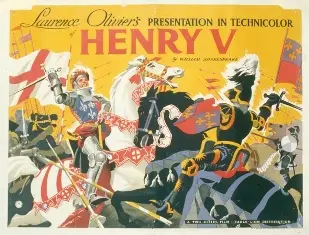
British film poster (Wiki Image).
King Henry V (Laurence Olivier): “Once more unto the breach, dear friends, once more;
Or close the wall up with our English dead!”
- This rousing speech is delivered by King Henry to inspire his troops during the Siege of Harfleur, urging them to fight courageously.
King Henry V:
“We few, we happy few, we band of brothers;
For he to-day that sheds his blood with me
Shall be my brother; be he ne’er so vile,
This day shall gentle his condition.”
- From the famous St. Crispin’s Day speech, Henry motivates his men before the Battle of Agincourt, emphasizing the camaraderie and honor they will share.
Chorus (Leslie Banks):
“O for a Muse of fire, that would ascend
The brightest heaven of invention…”
- The opening lines of the film, spoken by the Chorus, set the stage for the epic tale, calling upon a “Muse of fire” to elevate the story of Henry V’s conquest.
King Henry V:
“The game’s afoot:
Follow your spirit, and upon this charge
Cry ‘God for Harry, England, and Saint George!’”
- Another stirring line from Henry, rallying his troops with a patriotic call to fight for their king, country, and patron saint.
King Henry V:
“In peace there’s nothing so becomes a man
As modest stillness and humility:
But when the blast of war blows in our ears,
Then imitate the action of the tiger.”
- Henry contrasts the virtues of peace with the ferocity needed in war, urging his men to adopt a fierce demeanor when necessary.
Henry V (1944) ORIGINAL TRAILER [HD 1080p]
(YouTube video)
Plot of “Henry V” (1944)
Laurence Olivier’s “Henry V” (1944) is a cinematic adaptation of William Shakespeare’s play, focusing on the young and newly crowned King Henry V of England. The film blends live-action scenes with a stylized depiction of the Globe Theatre, creating a unique presentation of the play.
Plot Overview:
- Prologue and Introduction: The film begins with the Chorus (Leslie Banks) introducing the story, inviting the audience to use their imagination to follow the tale of King Henry V. The setting initially resembles a theatrical performance at the Globe Theatre, gradually transitioning into a full-scale cinematic depiction.
- Henry’s Claim to the French Throne: The plot follows King Henry V (Laurence Olivier) as he asserts his claim to the French throne based on dubious legal grounds. After the French Dauphin (René Lefèvre) insults Henry by sending him a box of tennis balls, Henry resolves to invade France to press his claim.
- The Siege of Harfleur: Henry leads his army across the English Channel to besiege the French town of Harfleur. He delivers the famous “Once more unto the breach” speech to rally his troops, ultimately forcing the town to surrender.
- The Battle of Agincourt: The film’s climax centers on the Battle of Agincourt, where Henry’s small, exhausted army faces the much larger French forces. On the eve of the battle, Henry delivers the iconic St. Crispin’s Day speech, instilling courage in his men. Against the odds, the English achieved a decisive victory due in part to the longbowmen.
- Henry’s Courtship of Princess Katharine: Following his victory, Henry meets with the French King and negotiates a peace treaty. As part of the agreement, he woos and marries Princess Katharine of Valois (Renée Asherson), securing both a diplomatic alliance and his claim to the French throne. The film concludes with Henry’s triumphant return to England, and the Chorus reflects on the fleeting nature of glory.
Themes of “Henry V” (1944)
- Leadership and Kingship: A central theme in “Henry V” is the nature of leadership. Henry is portrayed as an ideal king—brave, charismatic, and able to inspire loyalty in his men. The film explores his transformation from a youthful prince to a responsible monarch who understands the burdens of kingship.
- War and Honor: The film examines the concept of war, particularly the notions of honor, duty, and patriotism. While Henry’s speeches glorify war as a noble endeavor, the film also subtly questions the cost of such conflicts, highlighting the suffering and sacrifice of soldiers.
- National Identity: “Henry V” is infused with a strong sense of English national pride, particularly in the context of World War II, when the film was released. The film draws parallels between Henry’s struggle against the French and Britain’s contemporary fight against Nazi Germany, emphasizing themes of unity, resilience, and national identity.
- The Burden of Power: Henry’s journey in the film reflects the heavy responsibilities that come with power. The king is often isolated, grappling with the moral complexities of war and governance. His decisions affect not only his life but also the lives of thousands of his subjects.
- The Ideal of Kingship: The film presents Henry as an embodiment of the ideal king, balancing justice with mercy and strength with compassion. His ability to connect with his soldiers and lead by example is portrayed as the essence of true kingship.
- The Role of the Chorus: The Chorus plays a significant role in the film, guiding the audience through the story and emphasizing the grandeur of Henry’s exploits. The Chorus also reminds viewers that the events they are witnessing, while heroic, are part of a constructed narrative, blending reality with theatricality.
Laurence Olivier’s “Henry V” is both a celebration of Shakespeare’s work and a piece of wartime propaganda, designed to inspire British audiences during a time of crisis. The film’s themes of leadership, national pride, and the complexities of war continue to resonate, making it a landmark in both cinematic and literary history.
“Hamlet” (1948) – Won Best Actor in a Leading Role.
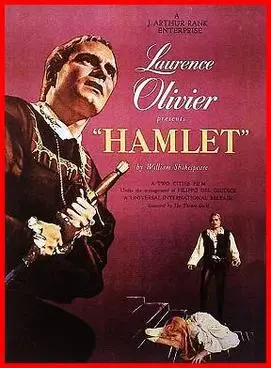
Theatrical release poster (Wiki Image).
Hamlet (Laurence Olivier):
“To be, or not to be: that is the question:
Whether ’tis nobler in the mind to suffer
The slings and arrows of outrageous fortune,
Or to take arms against a sea of troubles
And by opposing end them.”
- This iconic soliloquy is Hamlet’s reflection on life, death, and the nature of human suffering, one of the most famous passages in all of literature.
Hamlet:
“Frailty, thy name is woman!”
- Hamlet expresses his deep disillusionment with his mother, Queen Gertrude after she quickly remarries after the death of his father. This line encapsulates his bitterness and sense of betrayal.
Hamlet:
“The play’s the thing
Wherein I’ll catch the conscience of the king.”
- Hamlet devises a plan to confirm his uncle Claudius’s guilt by having a play performed that mirrors the murder of his father, hoping Claudius will reveal his guilt.
Hamlet:
“There are more things in heaven and earth, Horatio,
Than are dreamt of in your philosophy.”
- Hamlet says this to Horatio, reflecting on the mysteries of life and the limits of human understanding after encountering the ghost of his father.
Queen Gertrude (Eileen Herlie):
“The lady doth protest too much, methinks.”
- During the play within a play, Gertrude comments on the Player Queen’s vows of loyalty, ironically echoing her own situation and unintentional betrayal.
(YouTube video)
Plot of “Hamlet” (1948)
Laurence Olivier’s “Hamlet” (1948) is a cinematic adaptation of William Shakespeare’s tragedy, which follows the Prince of Denmark as he navigates grief, revenge, and existential despair after the sudden death of his father, King Hamlet.
Plot Overview:
- The Ghost’s Revelation: The film opens with the ghost of King Hamlet appearing on the battlements of Elsinore Castle. The ghost reveals to his son, Prince Hamlet (Laurence Olivier), that he was murdered by his own brother, Claudius (Basil Sydney), who has since married Queen Gertrude (Eileen Herlie) and seized the throne. The ghost urges Hamlet to avenge his death.
- Hamlet’s Feigned Madness: Hamlet, deeply troubled by the ghost’s revelation, decides to feign madness as part of his plan to observe Claudius and gather proof of his guilt. His erratic behavior confounds the court, particularly his mother and Ophelia (Jean Simmons), whom he loves.
- The Play Within a Play: To confirm Claudius’s guilt, Hamlet stages a play that reenacts the murder of his father. Claudius’s reaction to the performance—he abruptly leaves—convinces Hamlet of his uncle’s guilt.
- The Consequences of Revenge: Hamlet confronts his mother, Gertrude, in her chambers, where he accidentally kills Polonius (Felix Aylmer), thinking he is Claudius. This act sets off a chain of events leading to Ophelia’s madness and subsequent death, as well as Laertes’s (Terence Morgan) quest for revenge against Hamlet.
- The Tragic Finale: The film culminates in a deadly duel between Hamlet and Laertes, orchestrated by Claudius. A poisoned sword wounds both, and Gertrude accidentally drinks poisoned wine meant for Hamlet. In his final moments, Hamlet kills Claudius before succumbing to his own wounds. The film ends with Hamlet’s death and the arrival of Fortinbras, who takes control of Denmark.
Themes in “Hamlet” (1948)
- Revenge and Justice: The central theme of “Hamlet” is the pursuit of revenge, as Hamlet seeks to avenge his father’s murder. The play questions the morality and consequences of revenge, showing how it leads to the destruction of nearly every character involved.
- Madness (Real and Feigned): Madness is a recurring theme, both real and pretend. Hamlet’s feigned madness is a strategy to uncover the truth, while Ophelia’s genuine madness reflects the tragic consequences of the corruption and betrayal around her.
- Mortality and the Meaning of Life: “Hamlet” is deeply concerned with questions of life and death. Hamlet’s soliloquies, particularly “To be, or not to be,” explore the nature of existence, the inevitability of death, and the fear of the unknown afterlife.
- Corruption and Decay: The imagery of decay and corruption permeates the film, symbolizing the moral decay of the Danish court under Claudius’s rule. The rottenness of the state reflects the deeper moral corruption at the heart of the story.
- The Complexity of Action: Hamlet’s struggle with taking decisive action is a key theme. His philosophical nature leads him to overthink and delay, which contrasts with the more straightforward actions of characters like Laertes and Fortinbras. This theme explores the difficulty of balancing thought and action in the pursuit of justice.
These themes make Olivier’s “Hamlet” a powerful exploration of human nature, filled with introspection, moral ambiguity, and the tragic consequences of revenge.
“Richard III” (1955) – Nominated for Best Actor in a Leading Role.
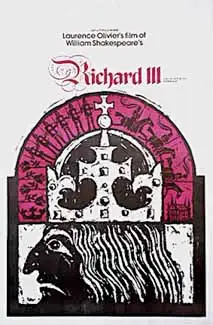
Theatrical re-release poster (Wiki Image).
Richard III (Laurence Olivier):
“Now is the winter of our discontent
Made glorious summer by this sun of York;
And all the clouds that lour’d upon our house
In the deep bosom of the ocean buried.”
- The famous opening lines of the play, where Richard reflects on the end of civil war and the rise of his brother’s power, setting the tone for his own dark ambitions.
Richard III:
“And therefore, since I cannot prove a lover,
To entertain these fair well-spoken days,
I am determined to prove a villain
And hate the idle pleasures of these days.”
- Richard declares his intention to embrace villainy, revealing his ruthless and manipulative nature.
Richard III:
“A horse! A horse! My kingdom for a horse!”
- As Richard’s power crumbles on the battlefield, he desperately cries out for a horse to continue fighting, a symbol of his ultimate downfall and desperation.
Duke of Buckingham (Ralph Richardson):
“The king is sickly, weak and melancholy,
And his physicians fear him mightily.”
- Buckingham comments on the frailty of King Edward IV, hinting at the instability that Richard seeks to exploit in his rise to power.
Richard III:
“Conscience is but a word that cowards use,
Devised at first to keep the strong in awe:
Our strong arms be our conscience, swords our law.”
- Richard dismisses the concept of conscience as something only cowards consider, showcasing his amoral approach to achieving power.
(YouTube video)
Plot of “Richard III” (1955)
Laurence Olivier’s “Richard III” (1955) is a cinematic adaptation of William Shakespeare’s historical play, focusing on the Machiavellian rise to power and eventual downfall of Richard, Duke of Gloucester, who becomes King Richard III of England.
Plot Overview:
- Introduction and Ambition: The film begins with Richard, Duke of Gloucester (Laurence Olivier), soliloquizing about his ambitions now that his brother, King Edward IV, has brought peace to England. He reveals his intention to ascend to the throne by any means necessary.
- Manipulation and Murder: Richard begins his ruthless campaign by manipulating his brothers, Clarence (John Gielgud) and Edward IV, as well as other nobles. He arranges for Clarence to be imprisoned and ultimately murdered, exploiting the king’s paranoia.
- The Wooing of Lady Anne: In one of his most audacious moves, Richard woos and marries Lady Anne (Claire Bloom), the widow of Prince Edward, whom Richard himself had slain. This marriage solidifies his power and showcases his manipulative charm.
- Usurpation of the Throne: After King Edward IV’s death, Richard positions himself as the Protector of Edward’s young sons. He imprisons them in the Tower of London and has them murdered, clearing his path to the throne. Richard is crowned King Richard III.
- Tyranny and Downfall: As king, Richard becomes increasingly tyrannical, alienating his allies, including the Duke of Buckingham (Ralph Richardson). Rebellion brews, led by Henry Tudor, Earl of Richmond (Stanley Baker). The film culminates in the Battle of Bosworth Field, where Richard’s forces are defeated. In the final moments, Richard famously cries out, “A horse! A horse! My kingdom for a horse!” before being killed by Richmond, who ascends the throne as Henry VII.
Themes in “Richard III” (1955)
- The Corruption of Power: The film explores the corrupting influence of power through Richard’s ruthless ascent to the throne. Richard’s willingness to betray, manipulate, and murder reflects the moral decay that accompanies his quest for authority.
- Deception and Manipulation: Richard is a master manipulator, using deception to achieve his ends. His ability to charm, deceive, and outmaneuver those around him highlights the theme of manipulation as a tool for political gain.
- The Nature of Evil: Richard is often seen as the embodiment of evil in Shakespearean drama. His gleeful embrace of villainy and his lack of remorse illustrate the theme of inherent malevolence and the destructive consequences it brings.
- Legitimacy and Usurpation: The film delves into the concepts of legitimate rule and the consequences of usurpation. Richard’s illegitimate seizure of the throne brings chaos and civil strife, ultimately leading to his downfall.
- Fate and Free Will: Richard’s actions raise questions about fate and free will. While he appears to control his destiny through cunning and ruthlessness, his eventual defeat suggests the limits of human control and the inevitability of retribution for evil deeds.
- The Consequences of Ambition: Richard’s boundless ambition leads to his rise but also sows the seeds of his destruction. The film explores how unchecked ambition can lead to isolation, paranoia, and, ultimately, ruin.
Laurence Olivier’s “Richard III” is a powerful exploration of the dark side of human nature, with themes of ambition, power, and evil driving the narrative. Olivier’s portrayal of Richard as a charming yet malevolent figure remains one of the most iconic interpretations of the character in film history.
“The Entertainer” (1960) – Nominated for Best Actor in a Leading Role.
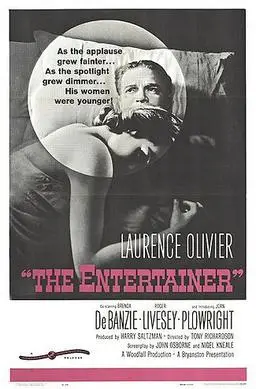
(Wiki Image).
- Archie Rice (Laurence Olivier):
“I’m dead behind these eyes. I’m dead, just like the whole inert, shoddy lot out there. It doesn’t matter what you say, the words don’t mean anything.”- Archie reflects on the emptiness of his life and career, revealing the deep despair behind his public persona.
- Archie Rice:
“Don’t clap too hard – it’s a very old building.”- Archie makes this wry, self-deprecating remark during one of his performances, highlighting both his cynicism and the decline of his career.
- Archie Rice:
“I have a go at life, but it has a go at me too, and kicks me in the teeth. I’m not complaining, mind you; I think it’s just the way things are.”- This quote captures Archie’s resigned acceptance of the hardships and disappointments in his life.
- Billy Rice (Roger Livesey):
“I used to be a star. I was born in a trunk, and I’ll probably die in one too.”- Archie’s father, Billy Rice, reflects on his own past in show business, underscoring the generational legacy of performance in the family.
- Archie Rice:
“You see, I’m not a human being. I haven’t got a soul. I’ve only got the talent.”- Archie acknowledges the hollowness of his existence, defining himself solely by his talent and his ability to entertain, even as everything else in his life falls apart.
(YouTube video)
Plot of “The Entertainer” (1960)
“The Entertainer” (1960) is a British drama film directed by Tony Richardson, based on the play by John Osborne. The film centers on Archie Rice, a washed-up music hall performer, as he navigates the collapse of his personal and professional life.
Plot Overview:
- Archie Rice’s Struggles: Archie Rice (Laurence Olivier) is a third-rate entertainer who continues to perform in declining music halls despite the obvious decline of his career. His performances are lackluster, filled with outdated jokes and a jaded demeanor. Archie’s career is in ruins, and he is deeply in debt.
- Family Turmoil: Archie’s personal life is equally troubled. He lives with his father, Billy Rice (Roger Livesey), a retired performer who is disillusioned with the current state of the entertainment industry. Archie’s wife, Phoebe (Brenda De Banzie), is an alcoholic and deeply unhappy with their marriage. Their daughter, Jean (Joan Plowright), returns home after the end of an engagement and becomes increasingly aware of the family’s dysfunction.
- Desperation and Schemes: Archie, desperate for money, schemes to raise funds to put on a new show, but his plans continually fall apart. He becomes involved with a beauty contest scam, hoping to find financial backing, but this too fails.
- Personal Tragedy: The family faces a devastating blow when news arrives that Archie’s son, Mick, who is serving in the military during the Suez Crisis, has been killed. This tragedy further strains the family’s already fragile relationships.
- Archie’s Decline: As Archie’s world crumbles, he continues to perform, refusing to acknowledge the reality of his situation. In the end, he is left isolated, a tragic figure clinging to the remnants of his former glory, trapped in a cycle of denial and failure.
Themes in “The Entertainer” (1960)
- The Decline of Traditional Entertainment: The film highlights the decline of the British music hall tradition, a once-popular form of entertainment that is now outdated and irrelevant. Archie’s career symbolizes the broader decline of an era and the inevitable march of progress that leaves some behind.
- Disillusionment and Cynicism: “The Entertainer” explores themes of disillusionment and cynicism, particularly through Archie’s character. He is a man who has lost faith in the world, his work, and himself, yet continues to go through the motions, unable to let go of his past.
- Family Dysfunction: The Rice family is a portrait of dysfunction, with each member trapped in their own despair. The strained relationships, emotional detachment, and unspoken resentments reflect the broader societal struggles of the post-war era, where traditional values and roles are being questioned.
- The Cost of Denial: Archie’s refusal to face the reality of his failing career and crumbling family life is central to the film. His denial leads to further alienation and despair, illustrating the dangers of clinging to illusions rather than confronting harsh truths.
- The Search for Identity and Purpose: Archie’s struggle is also a search for identity and purpose in a changing world. As the traditional structures of his life disintegrate, he is left grappling with who he is beyond his role as an entertainer, and the film poignantly captures his inability to find a meaningful answer.
Laurence Olivier’s portrayal of Archie Rice in “The Entertainer” is a powerful study of a man facing the twilight of his career and life, set against the backdrop of a rapidly changing society. The film is a meditation on the end of an era, personal failure, and the relentless passage of time.
“Othello” (1965) – Nominated for Best Actor in a Leading Role.
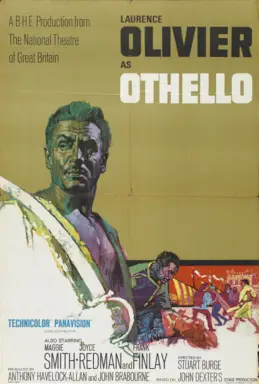
Theatrical release poster (Wiki Image).
- Othello (Laurence Olivier):
“O, beware, my lord, of jealousy!
It is the green-eyed monster which doth mock
The meat it feeds on.”
- Iago warns Othello about the dangers of jealousy, using the metaphor of the “green-eyed monster” to describe the destructive nature of envy.
- Othello:
“I loved her for the dangers she had passed,
And I loved her that she did pity them.”
- Othello speaks about his love for Desdemona, explaining that his affection for her grew from her empathy for his past struggles and experiences.
- Othello:
“Arise, black vengeance, from the hollow hell!
Yield up, O love, thy crown and hearted throne
To tyrannous hate!”
- As Othello’s jealousy and rage consume him, he invokes vengeance and hate, signifying his transformation from a loving husband to a vengeful, wrathful figure.
- Iago (Frank Finlay):
“I am not what I am.”
- Iago’s famous line reveals his duplicitous nature and the disparity between his outward appearance and his true intentions.
- Desdemona (Maggie Smith):
“Nobody; I myself. Farewell.
Commend me to my kind lord. O, farewell!”
- In a tragic moment, Desdemona, in her final moments, responds to Othello’s accusations of infidelity, expressing her innocence and resignation.
1965 Othello Official Trailer 1 BHE Films
(YouTube video)
The 1965 film “Othello,” directed by and starring Laurence Olivier, is an adaptation of William Shakespeare’s tragedy. It focuses on the story of Othello, a Moorish general in the Venetian army, and his tragic downfall, manipulated by his envious and scheming ensign, Iago.
Plot Overview:
- Othello’s Success and Iago’s Jealousy: Othello (Laurence Olivier) has recently married Desdemona (Maggie Smith), a match that causes tension and jealousy, particularly in Iago (Frank Finlay), who is upset that Othello has promoted Cassio (Michael Gambon) over him.
- Iago’s Scheme: Iago begins to manipulate Othello by planting seeds of doubt about Desdemona’s fidelity. He uses a handkerchief, a gift from Othello to Desdemona, as false evidence of her alleged affair with Cassio.
- Othello’s Growing Suspicion: Consumed by jealousy and persuaded by Iago’s lies, Othello’s trust in Desdemona deteriorates. He becomes increasingly erratic and obsessive, driven by the belief that she has betrayed him.
- Desdemona’s Innocence: Despite her innocence, Desdemona becomes the victim of Othello’s misplaced rage. The tension and drama escalate as Othello confronts her and ultimately decides to kill her in a fit of jealous rage.
- Tragic Conclusion: The truth of Iago’s deception is eventually revealed, but it is too late. Othello, realizing his mistake and the extent of Iago’s treachery, kills himself beside Desdemona’s lifeless body. Iago is arrested, and the tragic outcome underscores the devastating effects of jealousy and deceit.
Themes in “Othello” (1965)
- Jealousy and Its Destructive Power: The central theme of “Othello” is jealousy, particularly Othello’s jealousy of Desdemona’s supposed infidelity. This “green-eyed monster” consumes Othello, leading him to irrationality and violence and ultimately causing his downfall.
- Manipulation and Deception: Iago’s manipulation is the plot’s driving force. His deceitful schemes and falsehoods orchestrate the tragedy, highlighting the destructive potential of dishonesty and the ease with which trust can be undermined.
- Race and Otherness: The play explores issues of race and cultural difference, particularly through Othello’s character as a Moor in a predominantly white Venetian society. Iago and others use his race to undermine his confidence and status, reflecting the racial prejudices of the time.
- Trust and Betrayal: The theme of trust and betrayal is prominent, as Othello’s trust in Iago and his growing distrust of Desdemona are central to the tragedy unfolding. The play examines how trust can be easily manipulated and the devastating impact of betrayal on relationships.
- The Nature of Evil: Iago’s character embodies pure malice and evil, driven by personal grievances and a desire for revenge. His actions are motivated by a deep-seated need to cause chaos and suffering, illustrating the nature of inherent evil and its consequences.
- The Tragic Flaw: Othello’s tragic flaw is his excessive jealousy and insecurity, exacerbated by Iago’s manipulation. This fatal flaw leads to his ultimate downfall and the tragedy’s resolution, underscoring the classical notion of a tragic hero whose own weaknesses lead to his demise.
Laurence Olivier’s portrayal of Othello is renowned for its depth and intensity. The film brings these themes to life in a powerful and poignant manner. It remains a significant interpretation of Shakespeare’s tragedy, exploring timeless human emotions and conflicts.
“Sleuth” (1972) – Nominated for Best Actor in a Leading Role.
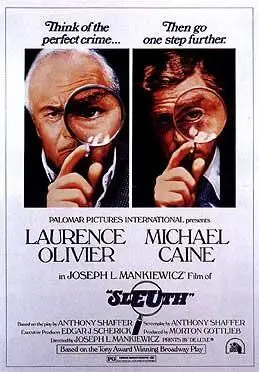
Theatrical release poster (Wiki Images).
- Andrew Wyke (Laurence Olivier):
“The only thing you can trust is your own intuition.”
- Andrew Wyke speaks about the importance of intuition in the face of deception and manipulation, reflecting the film’s themes of trickery and cunning.
- Milo Tindle (Michael Caine):
“What do you do, Mr. Wyke, with the spare time that you have, apart from making things up?”
- Milo Tindle questions Andrew Wyke’s penchant for elaborate games and deception, hinting at the intricate plans Wyke has concocted.
- Andrew Wyke:
“My dear fellow, you have been very good to come all the way out here to visit me. I have a surprise for you.”
- Wyke’s words set the stage for the elaborate and sinister game he has planned for Tindle, which drives the film’s plot.
- Milo Tindle:
“I never realized that the fantasy world could be so real.”
- Tindle reflects on how Wyke’s fictional and deceptive scenarios have taken on their own life, blending reality with imagination.
- Andrew Wyke:
“Life is just a game to you, isn’t it? But a game can be very dangerous, you know.”
- Wyke comments on the perilous nature of the elaborate games and schemes he and Tindle engage in, highlighting the risks involved in their psychological duel.
Sleuth (1972) – A Film You Need to See
(YouTube video)
Plot of “Sleuth” (1972)
“Sleuth” (1972), directed by Joseph L. Mankiewicz, is a psychological thriller about a complex game of deception and intrigue between two men, Andrew Wyke and Milo Tindle.
Plot Overview:
- Introduction of Characters: The film introduces Andrew Wyke (Laurence Olivier), a wealthy and eccentric mystery writer, and Milo Tindle (Michael Caine), a younger man having an affair with Wyke’s wife, Margaret.
- The Invitation: Wyke invites Tindle to his lavish country home to discuss their mutual issues. He reveals his knowledge of Tindle’s affair with Margaret and proposes a scheme to deal with the situation.
- The Game Begins: Wyke, a master of games and puzzles, proposes a plan to stage a robbery to allow Tindle to escape with a share of Wyke’s fortune. He lays out an elaborate setup involving a fake robbery to frame Tindle for theft and provide him with a clean getaway.
- Double Crosses and Revelations: As the scheme unfolds, it becomes apparent that the situation is more complicated than initially thought. Both men engage in a series of psychological maneuvers, deceptions, and counter-deceptions, each trying to outwit the other.
- Climax and Resolution: The film builds to a climactic confrontation in which the true nature of Wyke and Tindle’s relationship is revealed. The complexities of their plot lead to unexpected and dramatic outcomes, exposing hidden motives and desires.
Themes in “Sleuth” (1972)
- Deception and Manipulation: The film’s core theme is the art of deception. Wyke and Tindle engage in a complex game of manipulation, where trust is continually betrayed and motives are obscured. The intricate schemes they devise highlight the lengths people will go to deceive and outwit each other.
- Power and Control: The struggle for power and control is central to the narrative. With his wealth and intellect, Wyke initially appears to have the upper hand, but Tindle’s actions and responses shift the power dynamics throughout the film. The play of power between the two characters drives the tension and conflict.
- Identity and Disguise: The theme of identity is explored through the characters’ use of disguises and deception. Wyke and Tindle adopt false personas and role-play, blurring the lines between reality and pretense. The film examines how identities can be manipulated and distorted.
- Trust and Betrayal: Trust is a fragile concept in the film, as both characters constantly deceive and betray one another. The film examines how trust can be easily broken and the impact of betrayal on relationships.
- Reality vs. Fiction: Wyke’s background as a mystery writer adds a meta-layer to the film, where the line between fiction and reality becomes blurred. The elaborate schemes and games they play mirror the plots of detective stories, raising questions about the nature of reality and illusion.
- The Nature of Games: The film uses the concept of games and puzzles as a metaphor for the characters’ interactions. The elaborate schemes and psychological battles between Wyke and Tindle reflect the idea of life as a complex game where strategy and cunning determine the outcome.
“Sleuth” is a masterful exploration of psychological tension and manipulation. Its themes of deception, power, and identity create a compelling and intricate narrative.
“The Boys from Brazil” (1978) – Nominated for Best Actor in a Leading Role.
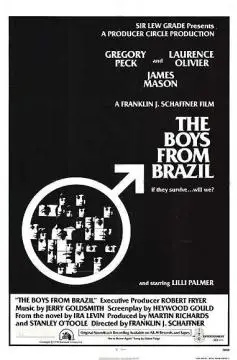
Theatrical release poster (Wiki Image).
Dr. Josef Mengele (Gregory Peck):
“The future of the world is in the hands of the young. The young are not only our hope; they are our future.”
- Mengele’s chilling words underscore his belief in shaping the future through his horrific experiments.
Barry Cayman (James Mason):
“I have seen it all before, but this is something new.”
- Barry Cayman reflects on the shocking and unprecedented nature of Mengele’s plan.
Dr. Josef Mengele:
“In the end, we must all do our duty. It is a matter of personal responsibility.”
- Mengele justifies his actions with a twisted sense of duty and personal responsibility.
Nazi Scientist:
“The world is full of people who want to believe in something, no matter how ridiculous it may be.”
- This quote reflects the film’s plot’s manipulation of belief and ideology.
Dan Gallagher (Laurence Olivier):
“You know, the truth is, we’re all monsters, and we’re all heroes. We’re all good and bad, all at once.”
- Gallagher’s observation highlights the moral complexities and dualities within human nature.
THE BOYS FROM BRAZIL – (1978) HD Trailer
(YouTube video)
Plot of “The Boys from Brazil” (1978)
The Boys from Brazil, directed by Franklin J. Schaffner and based on Ira Levin’s novel, is a thriller that delves into a chilling conspiracy involving cloning and Nazi ideology. The plot follows a complex story of a group of former Nazis planning to create a new generation of Adolf Hitlers.
Plot Overview:
- The Discovery: The film begins with the murder of several elderly Nazi war criminals. The mysterious deaths attract the attention of Dan Gallagher (Laurence Olivier), a Nazi hunter who investigates the connections between these murders.
- The Conspiracy: Gallagher uncovers a secret plot led by Dr. Josef Mengele (Gregory Peck), a notorious Nazi scientist. Mengele has been conducting experiments to clone Adolf Hitler, using the genetic material from the original dictator to create a new generation of young Nazis.
- The Cloning Scheme: Mengele’s plan involves using surrogate mothers to give birth to clones of Hitler, whom he intends to raise in different parts of the world. These clones are to be trained and groomed to assume positions of power, thereby ensuring the resurgence of Nazi ideology.
- The Investigation: Gallagher, with the help of a young journalist named Barry Cayman (James Mason), tracks down Mengele and discovers the scale of his operation. The investigation leads them to uncover the identity and locations of the cloned children and Mengele’s ultimate goal.
- The Showdown: Gallagher and Cayman race against time to stop Mengele and thwart his plan. The film builds to a dramatic climax as the conspiracy is exposed and the true nature of Mengele’s experiments comes to light.
Themes in “The Boys from Brazil” (1978)
- Evil and Ideology: The film explores the persistence of evil ideologies, specifically Nazism. Mengele’s cloning experiment represents the attempt to perpetuate Hitler’s ideology through a new generation, reflecting the enduring impact of extremist beliefs.
- The Ethics of Science: The film raises ethical questions about using scientific advancements for nefarious purposes. Mengele’s cloning experiments highlight the potential dangers of scientific research when driven by malevolent intentions.
- The Nature of Identity: Focusing on cloning, the film delves into questions of identity and the nature of the self. It explores how genetic inheritance and environmental factors combine to shape individuals and whether cloned beings can inherit the same traits as their originals.
- The Legacy of the Past: The plot underscores how past atrocities and ideologies can influence the present and future. Mengele’s attempts to recreate Hitler’s legacy demonstrate the danger of historical evils resurfacing and the importance of confronting and preventing their return.
- The Battle Between Good and Evil: The film portrays the struggle between good and evil through Gallagher’s efforts to thwart Mengele’s plan. It illustrates the heroism of those who fight against oppressive ideologies and the consequences of failing to address such threats.
- Paranoia and Suspense: The Boys from Brazil creates a sense of paranoia and suspense as Gallagher uncovers the conspiracy. The film’s tension revolves around the fear of a hidden and insidious threat, reflecting broader anxieties about the resurgence of dangerous ideologies.
The Boys from Brazil combines thriller and science fiction elements to address profound themes related to ideology, identity, and the ethical implications of scientific advancements.
Academy Awards – Best Supporting Actor Nominations:
“Marathon Man” (1976) – Nominated for Best Supporting Actor.
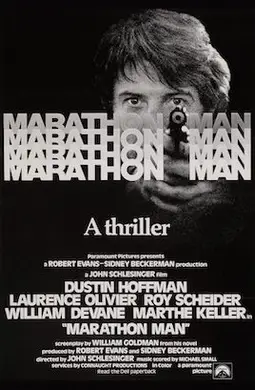
Movie poster by Bill Gold (Wiki Image).
Dr. Christian Szell (Laurence Olivier):
“Is it safe?”
- This chilling question becomes a key phrase in the film, symbolizing Szell’s manipulative and threatening nature.
Babe Levy (Dustin Hoffman):
“I’m not a doctor, but I know what it means. It means that you’re going to get hurt, and I’m going to get hurt, too.”
- Babe expresses his realization of the danger and personal stakes involved in the dangerous situation he’s entangled in.
Dr. Szell:
“You know, if you’re very quiet, you might be able to find out how much pain you can take.”
- Szell’s sadistic nature is revealed as he taunts Babe, emphasizing his control over the situation and his willingness to inflict suffering.
Babe Levy:
“I’m a marathon runner, not a goddamn hero!”
- Babe expresses his frustration and fear, highlighting his ordinary background and the extraordinary circumstances he is forced into.
Babe Levy:
“I was running, and I had to run. That’s all I could do.”
- This quote underscores Babe’s instinctive response to danger and his struggle to cope with the threats he faces.
Marathon Man (1976) – Trailer HD 1080p
(YouTube vidoe)
Plot of “Marathon Man” (1976)
Marathon Man, directed by John Schlesinger and based on the novel by William Goldman, is a suspenseful thriller that revolves around a young runner who becomes entangled in a dangerous conspiracy involving a Nazi war criminal.
Plot Overview:
- Introduction to Characters: The film introduces Babe Levy (Dustin Hoffman), a marathon runner and student. Babe’s brother, Doc Levy (Roy Scheider), is a covert operative involved in espionage.
- The Diamond Heist: The plot kicks off when Doc is tasked with investigating a group of former Nazis, including Dr. Christian Szell (Laurence Olivier), who is rumored to have hidden a cache of stolen diamonds. Szell, a notorious and sadistic war criminal, is being pursued for his involvement in a brutal regime.
- The Torture: Szell, also known as “The White Angel,” is a key figure in the hunt for the stolen diamonds. He believes that Doc is in possession of them. Szell’s methods are cruel and brutal, including the infamous torture scene involving the phrase, “Is it safe?”
- Babe’s Ordeal: When Babe unwittingly becomes involved in the conspiracy, he finds himself caught in a web of deception and danger. Szell mistakenly believes Babe knows the whereabouts of the diamonds. As a result, Babe is subjected to physical and psychological torture.
- The Climax: Tension reaches its peak as Babe tries to survive Szell’s schemes and uncover the truth behind the diamonds. The climax reveals the characters’ connections and the true nature of the conspiracy.
- Resolution: The film concludes with Babe confronting Szell and dealing with the fallout from the dangerous and complex situation he has been drawn into.
Themes in “Marathon Man” (1976)
- Trust and Betrayal: The film explores themes of faith and betrayal, mainly through Babe’s relationship with his brother and the various deceptions he encounters. Trust is central as the characters’ hidden motives and loyalties come to light.
- The Legacy of Evil: Szell’s character represents the lingering effects of past atrocities. His pursuit of the diamonds and his cruel behavior reflects the continued impact of his Nazi past and the way evil can persist beyond its original context.
- Survival and Resilience: Babe’s struggle for survival in the face of extreme danger and torture highlights themes of resilience and endurance. His physical and psychological endurance is central to the plot and underscores the theme of human perseverance.
- The Corruption of Power: Szell’s sadistic nature and the lengths he goes to secure the diamonds illustrate the corrupting influence of power and greed. The film examines how power can lead to moral decay and inhumanity.
- Identity and Perception: The film delves into how individuals are perceived and how their true identities can be obscured or revealed. Babe’s journey involves uncovering the true nature of the people around him and reconciling his own identity with the roles he is forced into.
- The Trauma of the Past: Szell’s actions and the impact of his past crimes reflect the broader theme of how historical trauma and unresolved issues from the past can affect the present. The film highlights how the repercussions of past events can resurface in unexpected and violent ways.
Marathon Man explores these themes using suspense, psychological thriller, and action, creating a gripping narrative that keeps the audience engaged.
Wishing Academy Awards
“Spartacus” (1960)
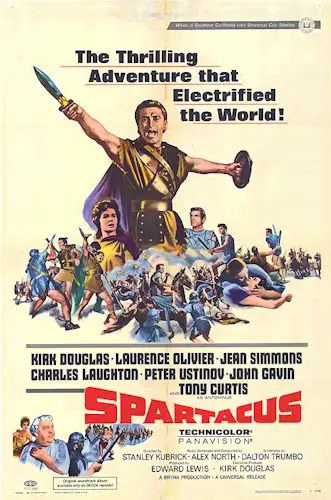 Theatrical re-release poster (1967) (Wiki Image).
Theatrical re-release poster (1967) (Wiki Image).
- Spartacus: “I’m not after glory. I’m after Spartacus.”
- Spartacus, portrayed by Kirk Douglas, says this, emphasizing that his rebellion is about freedom, not personal fame.
- Spartacus: “I’m Spartacus!”
- The iconic scene where multiple men stand up, each claiming to be Spartacus in order to protect their leader from capture. This symbolizes the unity and solidarity of the slaves against their Roman oppressors.
- Crassus: “You promise the people bread and circuses, but all they get is famine and slaughter.”
- Crassus, played by Laurence Olivier, cynically comments on the empty promises made to the people by the Roman leadership.
- Antoninus: “When a free man dies, he loses the pleasure of life. A slave loses his pain. Death is the only freedom a slave knows.”
- Antoninus, played by Tony Curtis, reflects on the harsh reality of slavery and the fleeting sense of freedom it can bring.
- Batiatus: “The beating heart of Rome is not the marble of the Senate, it’s the sand of the Colosseum. He’ll bring them death – and they will love him for it.”
- Batiatus, the gladiator trainer played by Peter Ustinov, cynically speaks about the Roman people’s appetite for blood and spectacle.
Spartacus Official Trailer #1 – Kirk Douglas, Laurence Olivier …
(YouTube video)
Plot of Spartacus (1960):
The film follows the life of Spartacus (Kirk Douglas), a Thracian slave turned gladiator who leads a monumental rebellion against the Roman Empire. Born into slavery, Spartacus is sold to a gladiator trainer, Batiatus (Peter Ustinov), where he learns to fight for entertainment in brutal combat. After an inspiring encounter with Varinia (Jean Simmons), a fellow slave, Spartacus’ desire for freedom intensifies. Seizing an opportunity during a gladiatorial contest, Spartacus leads a revolt, freeing fellow gladiators and slaves. As his rebellion grows, they become a formidable army, traveling across Italy with hopes of escaping Roman control. Meanwhile, the Roman Senate, led by the ambitious Crassus (Laurence Olivier), seeks to crush the uprising. Spartacus’ movement ultimately faces betrayal, leading to his capture. In the climactic scene, when the Romans demand that Spartacus identify himself, his followers stand in solidarity, declaring, “I am Spartacus.” Despite their resistance, Spartacus is crucified, but his legacy of resistance and yearning for freedom endures.
Themes in Spartacus (1960):
- Freedom vs. Oppression:
At its core, Spartacus is a story about the fight for freedom against the tyranny of the Roman Empire. Spartacus represents the indomitable human spirit yearning for liberation, while the Roman elites, especially Crassus, symbolize oppression. The film explores the struggle between the powerful and the powerless, showing how Spartacus’ rebellion becomes a symbol of defiance for all slaves. - Leadership and Sacrifice:
Spartacus’ transformation from a gladiator to the leader of a massive rebellion highlights the burdens of leadership. His willingness to sacrifice himself for the greater good, especially in the face of certain defeat, defines his heroism. The ultimate sacrifice—Spartacus’ death on the cross—reinforces the idea that true leadership comes with personal costs, but it also leaves a lasting legacy. - Solidarity and Brotherhood:
The theme of unity among the slaves is central to the film. The famous “I am Spartacus!” moment illustrates the profound bond between Spartacus and his followers, emphasizing that their fight is not just for one man’s freedom, but for the collective liberation of all. The slaves’ willingness to die for one another underlines the strength found in solidarity against oppression. - Class and Power:
Spartacus also delves into the divide between the Roman ruling class and the underprivileged. The decadence and cruelty of the Roman Senate are juxtaposed with the dignity and humanity of the slaves. Crassus represents the corrupting nature of absolute power, while Spartacus embodies a challenge to the entrenched class system. - Individual vs. State:
The conflict between Spartacus and Rome reflects a broader struggle of the individual against an all-powerful state. While Rome seeks to maintain control through military might and political maneuvering, Spartacus’ rebellion is fueled by the idea that the dignity and freedom of individuals matter. The state’s inability to suppress the human desire for freedom ultimately challenges its legitimacy.
Together, these themes make Spartacus a powerful epic about resistance, humanity, and the quest for justice in the face of overwhelming oppression. It remains a timeless story of defiance and sacrifice.
Paul Newman History
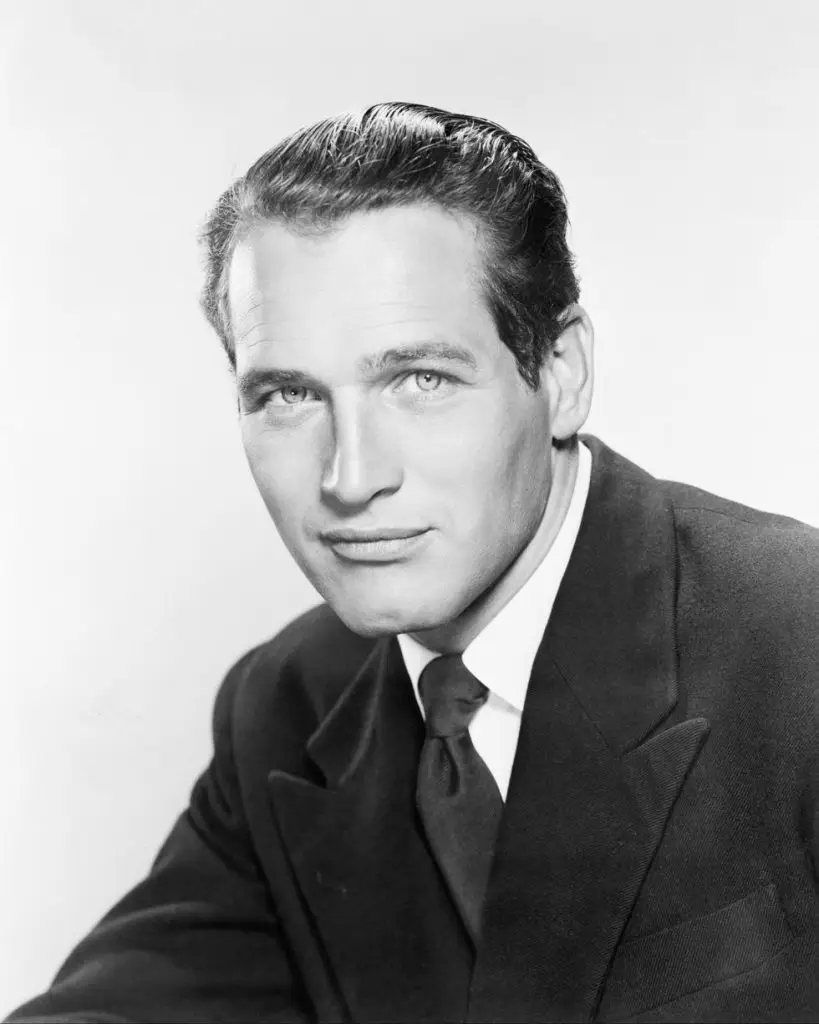
Newman in 1958 (Wiki Image).
- “You can’t be as old as I am without waking up with a surprised look on your face every morning: ‘Holy Christ, whaddya know — I’m still around!’”
- A reflection of Newman’s humility and sense of humor about aging.
- “I’ve been accused of being aloof. I’m not. I’m just wary.”
- Newman’s explanation of his reserved nature highlights his cautious approach to fame and personal interactions.
- “If you don’t have enemies, you don’t have character.”
- This comment is about standing for something, even if it means making enemies.
- “I had no natural gift to be anything — not an athlete, not an actor, not a writer, not a director. But I worked hard. Because nothing ever came easily to me.”
- Despite not feeling naturally gifted, Newman acknowledged the hard work and dedication that fueled his success.
- “To be an actor, you have to be a child.”
- Newman’s insight into the creativity and playfulness required to inhabit different roles as an actor truly.
- “A man with no enemies is a man with no character.”
- A reiteration of the belief that strong convictions and actions often lead to opposition, which in turn defines character.
- “I’m a supporter of gay rights. And not a closet supporter either. From the time I was a kid, I have never been able to understand attacks upon the gay community. There are so many qualities that make up a human being… by the time I get through with all the things I really admire about people, what they do with their private parts is probably so low on the list that it is irrelevant.”
- Newman’s strong stance on equality and human rights.
- “People stay married because they want to, not because the doors are locked.”
- Newman’s reflection on marriage, particularly his long-lasting relationship with Joanne Woodward, emphasizes commitment and choice.
- “Why fool around with hamburger when you have steak at home?”
- Newman’s famous and humorous quote about fidelity in his marriage is often cited when discussing his loyalty to Woodward.
- “Show me a good loser and I will show you a loser.”
- His competitive and humorous views on the importance of striving to win are often associated with his passion for racing.
| Movie Title | Year Released | Role | Plot Summary | Key Themes |
|---|---|---|---|---|
| Cat on a Hot Tin Roof | 1958 | Brick Pollitt | In this Tennessee Williams adaptation, Brick, a former athlete turned alcoholic, navigates family tensions and personal struggles. | Family conflict, truth, denial |
| The Hustler | 1961 | Eddie Felson | A small-time pool hustler seeks to prove himself against a legendary player, falling into a world of high stakes and moral dilemmas. | Ambition, pride, failure |
| Hud | 1963 | Hud Bannon | Hud, a selfish and reckless cowboy, clashes with his moralistic father in a family struggling with change and personal tragedy. | Morality, family, individualism |
| Cool Hand Luke | 1967 | Luke Jackson | Luke, a rebellious prisoner, refuses to conform to authority, becoming a symbol of resistance in a Southern prison camp. | Rebellion, freedom, oppression |
| Butch Cassidy and the Sundance Kid | 1969 | Butch Cassidy | A lighthearted take on the real-life outlaw duo Butch Cassidy and the Sundance Kid, who rob trains and flee the law. | Friendship, crime, adventure |
| The Sting | 1973 | Henry Gondorff | Two con men team up to pull off an elaborate scam on a powerful crime boss during the Great Depression. | Revenge, loyalty, deception |
| The Towering Inferno | 1974 | Doug Roberts | A skyscraper architect must lead a rescue mission when a massive fire breaks out in a new building during a grand opening party. | Survival, heroism, disaster |
| Slap Shot | 1977 | Reggie Dunlop | A failing minor league hockey team finds success through violence, with their aging player-coach Reggie leading the charge. | Violence, sports, comedy |
| Absence of Malice | 1981 | Michael Gallagher | Gallagher, a businessman wrongly implicated in a murder case, fights to clear his name in this examination of journalistic ethics. | Justice, truth, media responsibility |
| The Verdict | 1982 | Frank Galvin | A washed-up lawyer takes on a difficult medical malpractice case, fighting for redemption in the courtroom. | Redemption, justice, morality |
| The Color of Money | 1986 | Eddie Felson | A sequel to “The Hustler,” where an older Eddie trains a young pool player, rekindling his passion for the game. | Mentorship, ambition, rivalry |
| Nobody’s Fool | 1994 | Donald “Sully” Sullivan | An aging, stubborn man reconnects with his estranged family and confronts the mistakes of his past in a small town. | Family, redemption, aging |
| Road to Perdition | 2002 | John Rooney | A mob enforcer’s son witnesses a murder, forcing the father and son to flee while seeking revenge and redemption. | Family, crime, loyalty |
| Cars | 2006 | Doc Hudson (voice) | In this animated film, an aging race car mentors a young hotshot racer who is learning about life beyond the racetrack. | Mentorship, competition, redemption |
| Empire Falls (TV Movie) | 2005 | Max Roby | An adaptation of the Pulitzer Prize-winning novel about life in a declining town, with Newman as a cantankerous patriarch. | Small-town life, family dynamics |
Paul Newman Interviews 1973, 1982, 1987
Paul Newman Went Skiing Despite The Financial Risks | The …
Paul Newman in the Actor’s Studio 1994
Paul Newman Responds To A Bad Times Reviews | The Dick …
(YouTube video)
Paul Newman was an iconic American actor, director, philanthropist, and entrepreneur whose career spanned over five decades. Known for his striking blue eyes, charismatic screen presence, and versatility, Newman became one of Hollywood’s most beloved figures. Here’s a detailed look at his life and career:
Early Life and Background
- Birth and Family: Paul Leonard Newman was born on January 26, 1925, in Shaker Heights, Ohio, a suburb of Cleveland. He was the second son of Theresa (née Fetzer), born in Slovakia, and Arthur Sigmund Newman, who owned a successful sporting goods store. Newman’s father was Jewish, and his mother practiced Christian Science, which led to his upbringing in a culturally diverse household.
- Education and Early Interests: Newman developed an early interest in acting, participating in school plays and local theater productions. After graduating from Shaker Heights High School in 1943, he briefly attended Ohio University before enlisting in the U.S. Navy during World War II. He served as a radioman and rear gunner in torpedo bombers, but his hopes of becoming a pilot were dashed due to color blindness.
Early Acting Career
- Post-War Education: After the war, Newman returned to his education, enrolling at Kenyon College in Ohio, where he earned a degree in drama and economics in 1949. He continued his studies at the Yale School of Drama and later attended the Actors Studio in New York City, where he studied under the legendary acting coach Lee Strasberg.
- Broadway and Early Film Roles: Newman’s professional acting career began onstage. He made his Broadway debut in 1953 in William Inge’s “Picnic,” where he met his future wife, actress Joanne Woodward. His early film career started with a minor role in “The Silver Chalice” (1954), a film he later disowned, but his breakthrough came with the role of Rocky Graziano in “Somebody Up There Likes Me” (1956).
Rise to Stardom
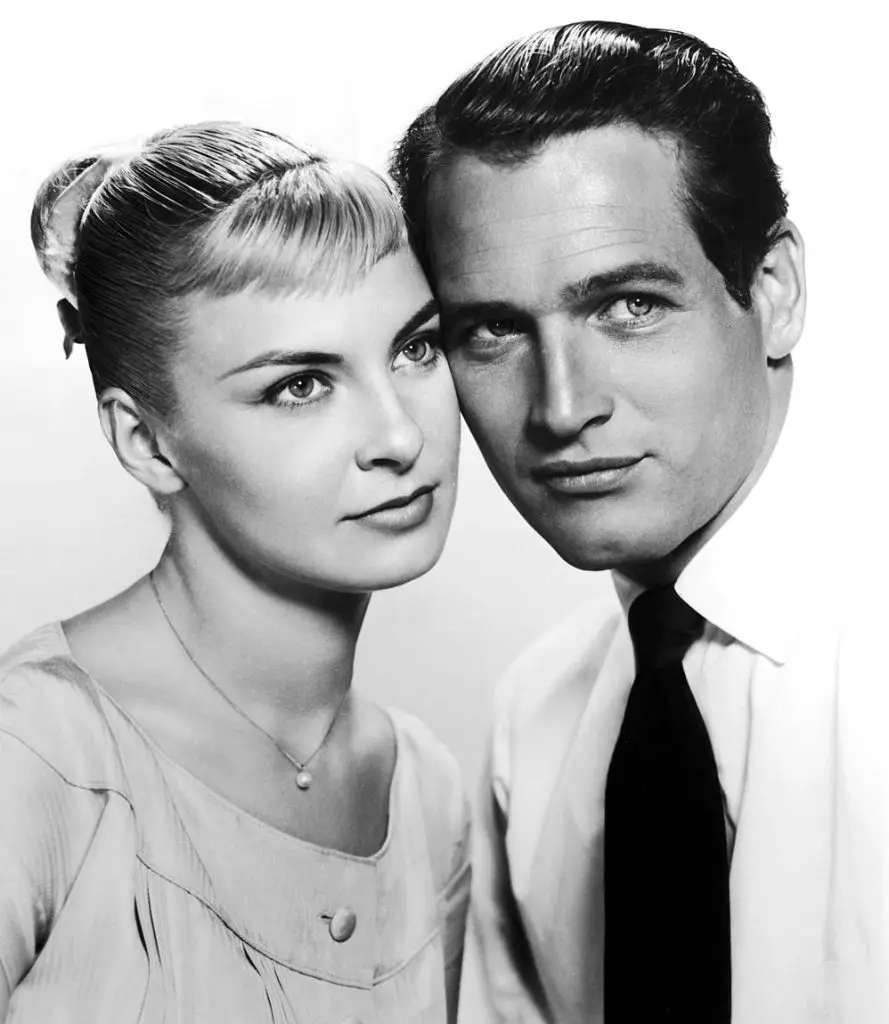 Newman with second wife actress Joanne Woodward in a publicity photograph for the 1958 film The Long, Hot Summer (Wiki Image).
Newman with second wife actress Joanne Woodward in a publicity photograph for the 1958 film The Long, Hot Summer (Wiki Image).
- Breakthrough Roles: Newman’s performance in “Somebody Up There Likes Me” garnered critical attention, and he followed it up with a string of successful films, including:
- “The Long, Hot Summer” (1958): Newman starred alongside Joanne Woodward in this adaptation of William Faulkner’s works. Their on-screen chemistry mirrored their real-life romance, and the film helped cement Newman’s status as a leading man.
- “Cat on a Hot Tin Roof” (1958): Newman’s portrayal of Brick Pollitt, opposite Elizabeth Taylor, earned him his first Academy Award nomination for Best Actor. The film was a significant hit and showcased Newman’s ability to handle complex, emotionally charged roles.
- Hollywood Icon: Throughout the 1960s, Newman became one of Hollywood’s most bankable stars, known for his good looks, charm, and depth as an actor. Essential films during this period include:
- “The Hustler” (1961): Newman’s portrayal of “Fast” Eddie Felson, a small-time pool hustler, earned him widespread acclaim and another Academy Award nomination for Best Actor. The role became one of his most iconic.
- “Hud” (1963): In this film, Newman played the antihero Hud Bannon, a morally bankrupt but charismatic rancher. His performance earned him another Oscar nomination and solidified his reputation as a leading man who could play complex, flawed characters.
- “Cool Hand Luke” (1967): Newman’s portrayal of the rebellious Luke Jackson, who refuses to conform to prison life, became one of his most memorable roles. The film was a critical and commercial success, earning Newman another Academy Award nomination.
Later Career and Achievements
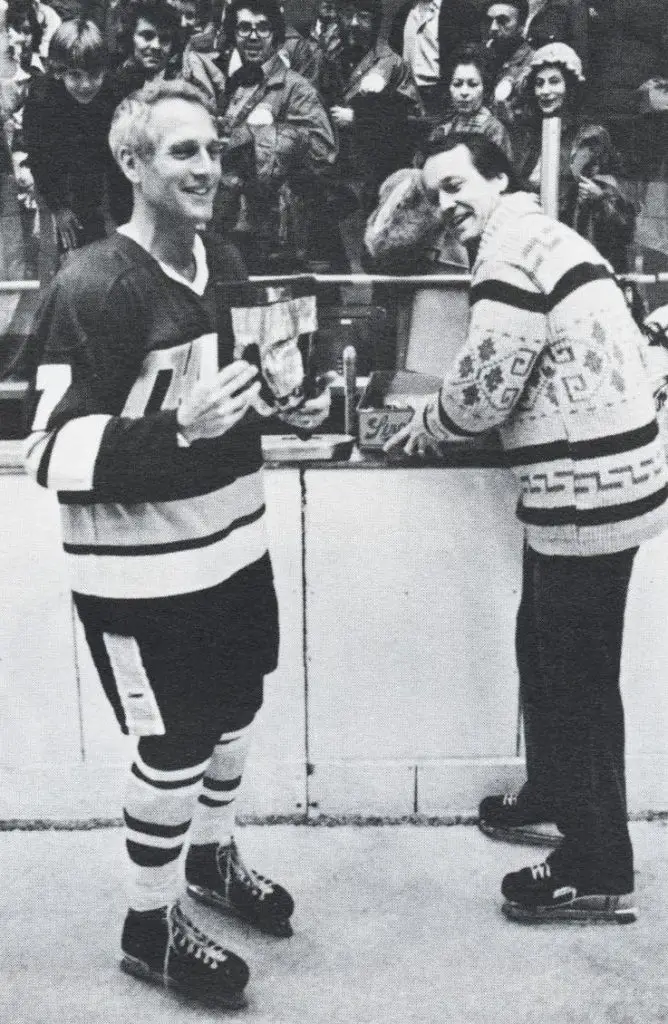 Newman (left) and director George Roy Hill on the set of Slap Shot in 1976 (Wiki Image).
Newman (left) and director George Roy Hill on the set of Slap Shot in 1976 (Wiki Image).
- The 1970s and Beyond: As he aged, Newman continued to take on challenging roles that showcased his range and depth as an actor. He appeared in films like “Butch Cassidy and the Sundance Kid” (1969), where he played the charming outlaw Butch Cassidy opposite Robert Redford, and “The Sting” (1973), a caper film that reunited him with Redford and won the Academy Award for Best Picture.
- Directorial Work: Newman also turned to directing, with notable films including “Rachel, Rachel” (1968), which starred Joanne Woodward and received four Academy Award nominations, including Best Picture.
- Oscar Recognition: Despite numerous nominations, Newman did not win an Academy Award until 1987, when he received the Best Actor Oscar for “The Color of Money” (1986), a sequel to “The Hustler,” in which he reprised his role as Eddie Felson. He later received an honorary Oscar in 1986 for his contributions to film and another for his philanthropic efforts in 1994.
Philanthropy and Newman’s Own
 A Newman Freeman Racing Spyder NF Can-Am race car from 1979) (Wiki Image).
A Newman Freeman Racing Spyder NF Can-Am race car from 1979) (Wiki Image).
- Charitable Work: Besides his film career, Newman was a dedicated philanthropist. In 1982, he co-founded Newman’s Own, a food company that donates 100% of its profits to charity. Newman’s Own has given over $570 million to various charitable causes, including environmental initiatives, educational programs, and health organizations.
- Hole in the Wall Camps: Newman also established the Hole in the Wall Gang Camp in 1988, a summer camp for children with serious illnesses. The camp, named after the gang in “Butch Cassidy and the Sundance Kid,” provides a free, safe, and fun environment for children to experience the joys of summer camp.
Personal Life
- Marriage to Joanne Woodward: Newman married Joanne Woodward in 1958, and their marriage became one of Hollywood’s most enduring partnerships. They collaborated on numerous films and remained married until Newman died in 2008. They had three daughters together, and Newman also had two daughters and a son from his first marriage to Jackie Witte.
- Racing Passion: Newman was an avid auto racing enthusiast. He began racing in the 1970s and competed professionally, finishing second in the 1979 24 Hours of Le Mans. He later co-owned the Newman/Haas Racing team, which was successful in the CART series.
Later Years and Legacy
- Final Films: Newman continued acting into the 2000s, with notable performances in films like “Road to Perdition” (2002), for which he received an Academy Award nomination for Best Supporting Actor, and as the voice of Doc Hudson in the animated film “Cars” (2006).
- Death: Paul Newman passed away on September 26, 2008, at the age of 83, after a battle with lung cancer. His death marked the end of a remarkable life and career, but his legacy as an actor, director, and philanthropist continues to resonate.
- Cultural Impact: Newman is remembered not only for his stellar acting career but also for his generosity, humility, and commitment to social causes. His blue eyes and handsome features made him a Hollywood icon. Still, his talent, integrity, and dedication to making the world a better place genuinely defined his legacy.
- Awards and Honors: Over his lifetime, Newman received numerous awards, including three Academy Awards (one honorary), a BAFTA Award, a Screen Actors Guild Award, a Cannes Film Festival Award, and the Jean Hersholt Humanitarian Award. He was honored with a Hollywood Walk of Fame star and posthumously awarded the Cecil B. DeMille Award for lifetime achievement.
Paul Newman’s life was one of remarkable achievements, both on and off the screen. He remains a beloved figure in American culture, known for his extraordinary contributions to film and his unwavering commitment to philanthropy.
Paul Newman Movie Oscars
Academy Awards – Best Actor Nominations:
“Cat on a Hot Tin Roof” (1958) – Nominated for Best Actor in a Leading Role.
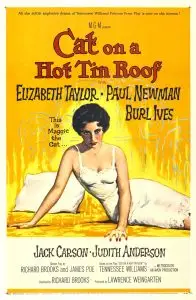
Theatrical release poster by Reynold Brown (Wiki Image).
- Maggie “The Cat” (Elizabeth Taylor):
“What is the victory of a cat on a hot tin roof? — I wish I knew… Just staying on it, I guess, as long as she can…”
- Maggie reflects on her situation, using the metaphor of a cat on a hot tin roof to describe her determination to survive in a difficult and precarious situation.
- Brick Pollitt (Paul Newman):
“Maggie, we are through with lies and liars in this house. Lock the door.”
- Brick’s frustration with the deceptions and lies in his life and his family is clear in this line, which underscores one of the film’s central themes.
- Big Daddy Pollitt (Burl Ives):
“There ain’t nothin’ more powerful than the odor of mendacity!”
- Big Daddy expresses his disdain for lies and deceit, a recurring theme in the story as characters struggle with truths they don’t want to face.
- Maggie:
“You can be young without money, but you can’t be old without it.”
- Maggie emphasizes the importance of financial security, particularly as it relates to the anxieties of aging and the dynamics within the Pollitt family.
- Brick Pollitt:
“You were just a kid, I was just a kid, we were both just a couple of kids. But—strangers. That’s what we are: strangers! Have you forgotten the way I used to be?”
- Brick speaks to the emotional distance that has grown between him and Maggie, reflecting his sense of alienation and loss of identity.
Cat on a Hot Tin Roof (1958) Official Trailer 1 – Elizabeth …
(YouTube video)
Plot of “Cat on a Hot Tin Roof” (1958)
“Cat on a Hot Tin Roof,” directed by Richard Brooks and based on Tennessee Williams’ Pulitzer Prize-winning play, is a powerful drama that delves into the complexities of family dynamics, truth, and personal identity.
Plot Overview:
- The Pollitt Family Gathering: The story unfolds throughout a single evening at the Pollitt family’s Mississippi plantation. The family has gathered to celebrate the 65th birthday of the wealthy and domineering patriarch, Big Daddy Pollitt (Burl Ives), who is unknowingly dying of cancer.
- Brick’s Struggles: The focus is on Brick Pollitt (Paul Newman), Big Daddy’s younger son, who is a former football star struggling with alcoholism and deep emotional pain. Brick is mourning the recent death of his close friend, Skipper, and is emotionally distant from his wife, Maggie (Elizabeth Taylor), who is desperate to reconnect with him.
- Maggie’s Desperation: Maggie, known as “the Cat,” is determined to secure her place in the family and ensure that she and Brick inherit Big Daddy’s estate. She is frustrated by Brick’s indifference and the lack of intimacy in their marriage, which is strained by unspoken tensions and Brick’s unresolved grief over Skipper.
- Family Deceptions: The evening is marked by lies and deceptions. The family conceals Big Daddy’s true diagnosis, leading to a series of confrontations that bring underlying tensions to the surface. Brick’s mother, Big Mama (Judith Anderson), is in denial about her husband’s illness, while Brick’s older brother, Gooper (Jack Carson), and his wife, Mae (Madeleine Sherwood), scheme to secure the inheritance.
- The Climactic Confrontation: The film culminates in a raw and emotional confrontation between Brick and Big Daddy. Brick finally reveals the depth of his pain, particularly his unresolved feelings about Skipper and his disillusionment with the lies that permeate his family’s life. Big Daddy’s confrontation with the truth forces the characters to face their deceptions and desires.
- The Resolution: The film ends on a note of tentative reconciliation, with Maggie taking a stand to secure her marriage and future with Brick. She lies about being pregnant in a desperate attempt to rekindle their relationship and secure their place in Big Daddy’s affections and estate.
Themes of “Cat on a Hot Tin Roof” (1958)
- Truth and Mendacity: One of the central themes is the conflict between truth and lies, or “mendacity.” The characters struggle with their deceptions, both to themselves and others. The film explores how lies about love, identity, or mortality can erode relationships and prevent true intimacy.
- Repressed Desires and Identity: Brick’s struggle with his feelings for Skipper and his subsequent descent into alcoholism highlight the theme of repressed desires and the pain of unacknowledged truths. The film touches on themes of sexual identity, grief, and the impact of societal expectations on personal happiness.
- The Power Dynamics within Family: The film delves into the complex power dynamics within the Pollitt family, particularly the relationships between fathers and sons, husbands and wives. Big Daddy’s dominance and Brick’s resistance to his expectations reflect the generational conflict and the pressure to conform to family roles.
- Loneliness and Isolation: Despite being surrounded by family, the characters are profoundly lonely. Maggie’s desperation, Brick’s emotional withdrawal, and Big Daddy’s fear of death all underscore the theme of isolation, even within close relationships.
- Greed and Inheritance: The looming question of who will inherit Big Daddy’s vast estate drives much of the plot, highlighting themes of greed, entitlement, and the corrosive effect of wealth on family bonds. The characters’ actions are motivated by their desire for security and power, often at the expense of genuine relationships.
- The Illusion of the American Dream: The film critiques the idea of the American Dream, showing how the pursuit of wealth, status, and outward success can lead to internal decay and unhappiness. The Pollitt family’s outward appearance of prosperity masks deep-seated issues and unresolved conflicts.
“Cat on a Hot Tin Roof” is a rich and complex exploration of human desires, the struggle for truth, and power dynamics within a troubled family, making it a powerful and enduring work of American cinema.
“The Hustler” (1961) – Nominated for Best Actor in a Leading Role.
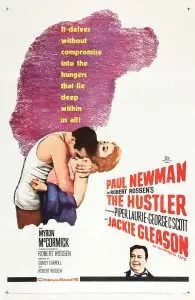
Theatrical release poster (Wiki Image).
Fast Eddie Felson (Paul Newman):
“I’m a hustler. I’m a hustler, baby. I hustle to win.”
- Eddie’s declaration of his identity as a hustler reflects his commitment to his craft and relentless pursuit of victory.
Minnesota Fats (Jackie Gleason):
“The only thing I got left is my soul.”
- Fats’ statement reveals his internal struggle and the emotional cost of his career in the pool.
Sarah Packard (Piper Laurie):
“I know you’re out to use me, and I know you’ll use me. But I don’t care. I’m yours.”
- Sarah’s confession highlights her vulnerability and her willingness to be used by Eddie despite the potential for exploitation.
Fast Eddie Felson:
“I’m a pool player. You’re a pool player. And in the end, it’s all about the game.”
- Eddie emphasizes the pool’s centrality to his life and the intense focus and dedication required to excel in it.
Fast Eddie Felson:
“I don’t care what you think. I’m gonna win this game.”
- This quote reflects Eddie’s determination and single-minded focus on achieving his goal, regardless of others’ opinions.
(YouTube video)
Plot of “The Hustler” (1961)
The Hustler, directed by Robert Rossen and based on Walter Tevis’s novel, is a drama about the world of professional pool. It follows Fast Eddie Felson (Paul Newman), a young and talented pool hustler, as he navigates the highs and lows of his pursuit of success and respect in the pool halls.
Plot Overview:
- Introduction to Eddie Felson: The film introduces Eddie Felson, a young, ambitious pool player who hustles in local pool halls. He dreams of making it big and proving himself to be the best.
- The Challenge: Eddie sets his sights on Minnesota Fats (Jackie Gleason), a renowned and highly skilled pool player. Eddie believes that defeating Fats will establish his reputation and validate his talent.
- The Gamble: Eddie partners with Sarah Packard (Piper Laurie), a troubled woman who becomes romantically involved with him. They travel together, hustling pool games and building their relationship.
- The Defeat: Eddie challenges Fats to a high-stakes game and loses, resulting in a significant setback. The defeat is a blow to his ego and aspirations, leading to a period of self-doubt and introspection.
- The Fallout: Eddie’s loss affects his personal life and relationship with Sarah. He struggles with his demons and the consequences of his choices, including his dependence on alcohol and his self-destructive tendencies.
- The Redemption: Eddie eventually faces his flaws and learns from his experiences. He prepares for a showdown, seeking redemption and a chance to prove himself again.
Themes in “The Hustler” (1961)
- Ambition and Pride: Eddie’s drive to become the best and prove himself is central to the film. His ambition pushes him to take risks and challenge established players, leading to pride and eventual downfall.
- The Cost of Success: The film explores the personal sacrifices and moral compromises associated with pursuing success. Eddie’s journey illustrates the emotional and psychological toll of striving for greatness.
- Self-Destruction and Redemption: Eddie’s self-destructive behavior, including his alcoholism and reckless decisions, highlights the theme of personal downfall. The film follows his path to redemption as he confronts his flaws and seeks to rebuild his life and career.
- Identity and Self-Perception: A key theme is the struggle to define oneself and find meaning. Eddie’s quest to establish his identity as a top pool player is fraught with challenges and the film examines how he comes to terms with who he is and what he values.
- Relationships and Exploitation: Eddie’s relationship with Sarah Packard is marked by genuine affection and exploitation. The film examines the complexities of their relationship and the impact of Eddie’s ambition on his personal connections.
- The Nature of Competition: The competitive world of the pool serves as a backdrop for exploring broader themes of competition and rivalry. Eddie’s interactions with other players, particularly Minnesota Fats, illustrate the competitive drive and the ethics of hustling and winning.
The Hustler is a compelling drama that delves into the human condition. It focuses on themes of ambition, personal struggle, and the quest for redemption within the competitive world of professional pool.
“Hud” (1963) – Nominated for Best Actor in a Leading Role.
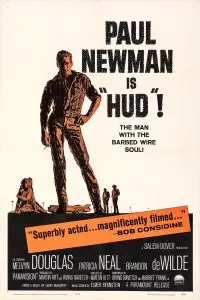
Theatrical release poster by Mitchell Hooks (Wiki Image).
- Hud Bannon (Paul Newman):
“You don’t look out for yourself; the only helping hand you’ll ever get is when they lower the box.”
- This quote reflects Hud’s cynical and self-centered worldview, emphasizing his belief in self-reliance above all else.
- Homer Bannon (Melvyn Douglas):
“Little by little, the look of the country changes because of the men we admire.”
- Homer’s observation highlights the impact of role models and the consequences of valuing the wrong people in society.
- Alma Brown (Patricia Neal):
“I’ve done my time with one cold-blooded bastard. I’m not looking for another.”
- Alma’s blunt rejection of Hud’s advances underscores her strength and refusal to be mistreated despite her attraction to him.
- Hud Bannon:
“Man, like that sounds mean, but he’s got a good side to him. Maybe it’s his other side, but it’s there.”
- Hud’s ironic statement reflects his awareness of his own flawed character and the contradictions within him.
- Homer Bannon:
“You don’t care about people, Hud. You don’t give a damn. You’re all about yourself.”
- Homer’s harsh criticism of his son Hud exposes their moral conflict and the differing values that define their relationship.
(Youtube video)
Plot of “Hud” (1963)
Hud, directed by Martin Ritt and based on Larry McMurtry’s novel Horseman, Pass By, is a powerful drama centered around a fractured family in rural Texas. The film explores the conflict between two generations, embodied by the moral and ethical divide between the protagonist, Hud Bannon (Paul Newman), and his father, Homer Bannon (Melvyn Douglas).
Plot Overview:
- Introduction to the Bannon Family: The story is set on a cattle ranch in Texas owned by Homer Bannon, a principled and morally upright man. His son, Hud, is reckless, self-centered, and morally corrupt, living only for his own pleasure. Lonnie, Hud’s nephew, is caught between his admiration for Hud’s rebellious nature and his respect for his grandfather, Homer.
- The Cattle Crisis: The central conflict arises when the ranch’s cattle become infected with foot-and-mouth disease. Homer, who values integrity, decides to follow the law and destroy the herd to prevent the disease’s spread despite the devastating financial loss this will cause. Hud, however, is more interested in selling the cattle before they can be tested, showing his disregard for ethical behavior.
- Family Tensions: The differing attitudes toward the cattle crisis highlight the broader moral divide within the family. Homer represents the old values of honesty and responsibility, while Hud embodies a more modern, cynical worldview focused on self-interest and materialism.
- Alma’s Role: Alma Brown (Patricia Neal), the housekeeper, becomes a focal point of tension between Hud and the other family members. Hud’s inappropriate advances towards her and her complex relationship with the Bannon family add emotional depth to the story.
- Tragic Consequences: The tension between Hud and Homer comes to a head when Homer dies following an argument with Hud. Hud’s lack of empathy and remorse after his father’s death further solidifies his role as an anti-hero. Lonnie, disillusioned by Hud’s behavior, decides to leave the ranch, leaving Hud alone to face the emptiness of his lifestyle.
Themes in “Hud” (1963)
- Moral Decay and Cynicism: Hud represents the moral decay and cynicism of a younger generation that is willing to sacrifice ethics for personal gain. His disregard for the well-being of others, including his family and the community, underscores the dangers of a self-centered worldview.
- Generational Conflict: The film explores the conflict between generations, with Homer embodying traditional values of integrity and responsibility, while Hud symbolizes a more modern, self-serving attitude. The tension between father and son highlights the changing moral landscape of the time.
- Isolation and Alienation: Hud’s actions lead to his isolation from those around him. His inability to connect with others on a meaningful level results in emotional alienation, which is a central theme of the film. By the end, Hud is left alone, symbolizing the ultimate cost of his choices.
- The Destruction of Innocence: Lonnie’s character arc represents the loss of innocence as he witnesses the consequences of Hud’s actions. Initially admiring Hud, Lonnie becomes increasingly disillusioned as he realizes the moral emptiness of Hud’s life, leading him to reject Hud’s influence.
- The Decline of Rural America: The film also touches on the broader theme of the decline of traditional rural life. The cattle herd’s destruction and the ranch’s financial ruin symbolize the challenges facing rural communities and the erosion of traditional ways of life.
- The Struggle Between Idealism and Realism: Homer’s idealism and Hud’s realism clash throughout the film. Homer believes in doing what is right, even at great personal cost, while Hud believes in doing whatever is necessary to survive and succeed, regardless of the moral implications.
Hud is a complex character study that delves into themes of morality, generational conflict, and the consequences of living a life devoid of ethical considerations. The film’s portrayal of these themes and its stark depiction of rural life make it a powerful and enduring piece of American cinema.
“Cool Hand Luke” (1967) – Nominated for Best Actor in a Leading Role.
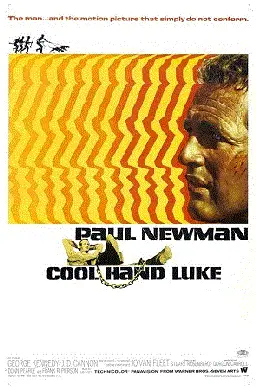
Theatrical release poster by Bill Gold (Wiki Image).
- Captain (Strother Martin):
“What we’ve got here is failure to communicate.”
- This iconic line, delivered by the prison captain, symbolizes the disconnect between the oppressive authorities and the rebellious spirit of the prisoners, particularly Luke.
- Luke (Paul Newman):
“Sometimes, nothing can be a real cool hand.”
- Luke says this after winning a poker game with a bluff, symbolizing his ability to make the best out of nothing and maintain his cool demeanor even in the toughest situations.
- Luke:
“I can eat fifty eggs.”
- Luke’s declaration of his ability to eat fifty hard-boiled eggs is a testament to his defiance and desire to prove his strength and resilience, even in the face of absurd challenges.
- Dragline (George Kennedy):
“He’s a natural-born world-shaker.”
- Dragline, Luke’s fellow inmate, says this admiringly, highlighting Luke’s impact on those around him and his ability to inspire and lead, even within the confines of the prison.
- Luke:
“Oh, come on! Stop beatin’ it. Get out there yourself. Stop feedin’ off me!”
- This line reflects Luke’s frustration with the way others depend on his rebelliousness and strength, urging them to take control of their own destinies instead of relying on him.
Cool Hand Luke | 4K Trailer | Warner Bros. Entertainment
(YouTube video)
Plot of “Cool Hand Luke” (1967)
“Cool Hand Luke,” directed by Stuart Rosenberg, is a classic prison drama that follows the story of Lucas “Luke” Jackson (Paul Newman), a man who refuses to conform to authority. After being arrested for cutting the heads off parking meters while drunk, Luke is sentenced to a chain gang in a Southern prison camp. His defiance and resilience in the face of oppressive authority make him both a hero to his fellow inmates and a target for the prison staff.
Plot Overview:
- Luke’s Arrival: Luke arrives at the prison camp, where he quickly becomes known for his rebellious attitude and refusal to submit to the prison authorities. Despite the harsh conditions, Luke maintains a cool and detached demeanor, earning the nickname “Cool Hand Luke.”
- Challenges to Authority: Luke’s defiance manifests in various ways, including his participation in a poker game where he bluffs his way to victory and his decision to eat fifty hard-boiled eggs in an hour—a challenge he takes on simply to prove his resilience.
- Growing Influence: Luke’s nonconformity and charisma gradually earn him the respect and admiration of his fellow inmates, particularly Dragline (George Kennedy), who becomes one of Luke’s closest allies. Luke’s actions inspire the other prisoners to resist the oppressive system in their ways.
- Conflict with the Guards: As Luke’s influence grows, he becomes a bigger threat to the prison authorities. The Captain (Strother Martin) and the guards try to break Luke’s spirit through physical and psychological punishment, but Luke continues to rebel, repeatedly escaping and being recaptured.
- Final Showdown: Despite the increasingly brutal attempts to subdue him, Luke remains defiant until the end. In his final escape attempt, he seeks refuge in a church, where he questions his faith and the purpose of his suffering. The authorities eventually corner him, leading to a tragic conclusion.
Themes in “Cool Hand Luke” (1967)
- Rebellion Against Authority: The film’s central theme is Luke’s rebellion against authority. His defiance of the prison’s oppressive system symbolizes the struggle for individual freedom against institutional control. Even in the face of severe punishment, Luke’s refusal to conform reflects a broader commentary on the human spirit’s resistance to tyranny.
- The Indomitable Human Spirit: Luke embodies the indomitable human spirit. His ability to maintain his dignity and sense of self in a dehumanizing environment is a testament to the resilience of the human spirit. The film explores how one man’s unwavering will can inspire others to question and resist their oppression.
- Isolation and Alienation: Throughout the film, Luke’s rebellious nature isolates him from the authorities and, to some extent, his fellow inmates. His solitary struggle against the system highlights themes of alienation and the loneliness that often accompanies nonconformity. Luke’s internal conflicts and ultimate fate underscore the personal cost of standing alone.
- Conformity vs. Individualism: The film contrasts Luke’s individualism with the conformity expected by the prison authorities. Luke’s character challenges the idea that survival in such an environment requires submission and conformity. Instead, he chooses to live on his terms, even if it means suffering the consequences.
- Religion and Redemption: The film also touches on religious themes, particularly Luke’s interactions with God. Luke’s final moments in the church represent his search for meaning and redemption as he questions whether his suffering has a purpose. This theme is symbolized by the frequent use of Christian imagery, such as Luke lying in a crucifixion pose after his egg-eating challenge.
- The Power of Hope and Despair: Cool Hand Luke explores the tension between hope and despair. Luke’s repeated escapes represent his hope for freedom, but each recapture and subsequent punishment serve as reminders of the crushing despair imposed by the prison system. The film illustrates how hope can be both a source of strength and a cause of suffering.
Cool Hand Luke is a powerful exploration of rebellion, resilience, and the human condition. Luke’s character serves as a symbol of defiance in the face of oppressive authority. The film’s themes continue to resonate, making it a timeless commentary on the struggle for personal freedom and dignity.
“Rachel, Rachel” (1968) – No acting nomination, but directed the film nominated for Best Picture.
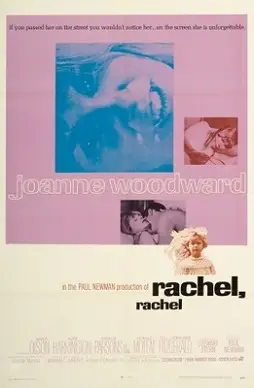
Theatrical release poster (Wiki Image).
- Rachel Cameron (Joanne Woodward):
“I’m just so afraid of being alone.”
- This quote captures Rachel’s deep-seated fear of loneliness and her struggle with isolation throughout the film.
- Rachel Cameron:
“Do you ever feel like you’re just not a person? That you’re just the things that happen to you?”
- Rachel expresses her existential crisis and feelings of powerlessness, questioning her identity and sense of self.
- Rev. Wood (Geraldine Fitzgerald):
“God knows how much love we each need. But we’re all afraid. We can’t ever let go of ourselves.”
- This line reflects the film’s exploration of emotional repression and the difficulty of finding true connection.
- Rachel Cameron:
“I don’t want to dream anymore. I want to wake up.”
- Rachel’s desire to escape from her stagnant life and confront reality is pivotal in her journey of self-discovery.
- Calla Mackie (Estelle Parsons):
“We don’t have to be so damn good all the time.”
- Calla’s statement challenges the societal expectations placed on women and encourages Rachel to break free from her self-imposed limitations.
Rachel, Rachel – (Original Trailer)
(YouTube video)
Plot of “Rachel, Rachel” (1968)
“Rachel, Rachel” is a poignant drama directed by Paul Newman, based on Margaret Laurence’s novel “A Jest of God.” The film follows Rachel Cameron (Joanne Woodward), a 35-year-old unmarried schoolteacher living in a small, claustrophobic town in Connecticut. Rachel leads a life of quiet desperation, living with her overbearing, widowed mother and feeling trapped by her unfulfilling job and the monotony of her existence. As Rachel begins confronting her suppressed desires and the emotional emptiness that has characterized her life, she embarks on a journey of self-discovery and personal awakening. This journey is sparked by a summer romance with an old high school acquaintance, Nick Kazlik (James Olson), and the influence of her friend Calla Mackie (Estelle Parsons), who encourages her to break free from her repressive life.
Plot Overview:
- Rachel’s Stagnant Life: Rachel feels suffocated by her life in a small town with her overbearing mother. Her days are filled with teaching and routine, leading her to question her purpose and happiness.
- Calla’s Influence: Rachel’s close friend, Calla, encourages her to take risks and explore new experiences, including attending a revival meeting that awakens Rachel’s suppressed emotions and desires.
- Romance with Nick: Rachel rekindles a relationship with Nick Kazlik, initially bringing hope and excitement to her life. However, the romance is short-lived and ultimately unfulfilling, forcing Rachel to confront her loneliness and the reality of her situation.
- Personal Awakening: Through these experiences, Rachel realizes she has been living a life of fear and repression. She decides to take control of her life, make changes, and pursue her own happiness, even if it means leaving behind the familiar.
- Resolution: In the end, Rachel boldly decides to move away from her hometown and start a new chapter, symbolizing her break from the past and her determination to seek a more fulfilling and independent existence.
Themes in “Rachel, Rachel” (1968)
- Loneliness and Isolation: The film deeply explores the theme of loneliness, as Rachel feels emotionally and physically isolated in her small-town life. Her struggle with loneliness is central to her character and drives her quest for change.
- Repression and Liberation: Rachel’s journey involves breaking free from self-imposed and societal repression. The film examines how Rachel’s fear of judgment and failure has kept her from living fully and how she begins to liberate herself from these constraints.
- Self-Discovery and Awakening: The narrative focuses on Rachel’s process of self-discovery as she confronts her fears, desires, and past traumas. Her awakening is gradual and painful but ultimately empowering as she takes steps to redefine her life on her own terms.
- Gender Roles and Expectations: The film critiques the traditional roles and expectations placed on women, particularly in the 1960s. Rachel’s struggles reflect the pressures to conform to societal norms of marriage and motherhood, which she ultimately rejects in favor of pursuing her own path.
- Search for Meaning: Rachel’s existential crisis is central to the film as she grapples with her life’s meaning and place in the world. Her story is a search for purpose and fulfillment in a life dominated by routine and duty.
“Rachel, Rachel” is a sensitive exploration of a woman’s inner life. It highlights the challenges of breaking free from a life of quiet desperation and the courage it takes to seek out one’s true self. The film’s themes resonate deeply, making it a powerful study of personal transformation and empowerment.
“Absence of Malice” (1981) – Nominated for Best Actor in a Leading Role.
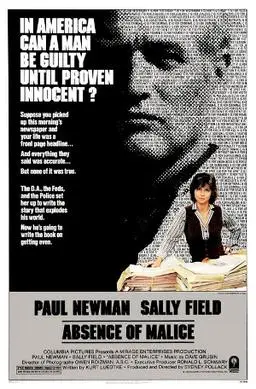
Promotional poster (Wiki Image).
- Megan Carter (Sally Field):
“Suppose you picked up this morning’s paper and your life was a front-page headline… and everything they said was accurate, but none of it was true.”
- Megan expresses the film’s central dilemma, highlighting the difference between facts and the truth and how easily a life can be damaged by incomplete or misleading information.
- Michael Gallagher (Paul Newman):
“You don’t write the truth. You write what people say. You write what you overhear; you write what you think. You’re a liar!”
- Gallagher confronts Megan with the harsh reality of how journalism can distort the truth, emphasizing the devastating impact of careless reporting.
- James Quinn (Wilford Brimley):
“Wonderful thing, a subpoena. They let you ask questions.”
- Quinn’s wry observation underscores the power of legal authority in uncovering the truth, contrasting it with the sometimes murky ethics of investigative journalism.
- Megan Carter:
“People believe what they read.”
- This quote reflects the power of the media and the responsibility journalists have, as public perception is often shaped by what is printed, regardless of its accuracy.
- Michael Gallagher:
“I was raised to believe that what is true can be proved.”
- Gallagher’s belief in the power of truth and proof is tested throughout the film as he navigates the murky waters of legal and journalistic ethics.
(YouTube video)
Plot of “Absence of Malice” (1981)
“Absence of Malice” is a legal drama directed by Sydney Pollack, focusing on the intersection of journalism and justice. The story revolves around Michael Gallagher (Paul Newman), a Miami liquor wholesaler whose life is turned upside down when he becomes the subject of an investigative report by journalist Megan Carter (Sally Field). Megan, acting on information leaked by the government, writes an article implying Gallagher is under investigation for the murder of a local union leader despite the lack of concrete evidence. The article has devastating consequences for Gallagher, who becomes the target of public suspicion, and for those around him. As Gallagher seeks to clear his name, he exposes the ethical lapses in the journalistic process and the government’s manipulation of the media. The film culminates in a legal confrontation that reveals the complex relationships between truth, justice, and the press.
Themes in “Absence of Malice” (1981)
- The Power and Responsibility of the Press: The film explores the significant influence that the media holds over public perception and individuals’ lives. It scrutinizes how the press can inform and misinform, potentially destroying reputations and lives when journalists prioritize sensationalism or fail to verify their sources rigorously.
- Ethics in Journalism: The absence of Malice delves deeply into the ethical dilemmas journalists face. It questions the balance between the public’s right to know and the responsibility to protect individuals from harm due to incomplete or misleading reporting. The film critiques the practice of relying on anonymous sources and the consequences of publishing unverified allegations.
- Justice vs. Manipulation: The film highlights the ease with which legal and governmental entities can manipulate the media for their purposes. This theme is central to the plot, as Gallagher becomes a pawn in a larger game between the government and organized crime, illustrating the dangers of using the press as a tool for unofficial investigations.
- Innocence and Guilt: Absence of Malice challenges the notions of innocence and guilt, especially in the public eye. The film shows how someone can be presumed guilty by association or implication without a trial, leading to the erosion of trust in both the justice system and the media.
- The Human Cost of Journalism: The movie emphasizes the personal impact that journalism can have on individuals. Gallagher’s life is nearly ruined by a single article, which raises questions about the human cost of pursuing a story. The film examines how journalists’ actions, even when not malicious, can have unintended and far-reaching consequences.
- Truth vs. Perception: The difference between truth and perception is a recurring theme throughout the film. The narrative questions what happens when the facts presented by the media are accurate, but the context or implications lead to a false perception of reality, ultimately distorting the truth.
“Absence of Malice” is a thought-provoking exploration of the power dynamics between the media, the legal system, and the public. It raises important questions about the responsibilities and ethical boundaries of journalism. The film’s themes remain relevant in discussions about media integrity and the impact of the press on individual lives.
“The Verdict” (1982) – Nominated for Best Actor in a Leading Role.
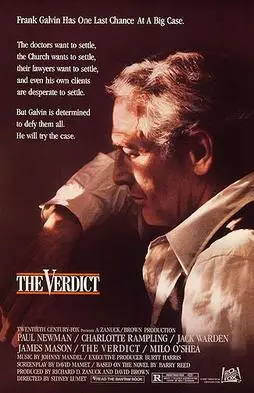
Theatrical release poster (Wiki Image).
- Frank Galvin (Paul Newman):
“Your Honor, with all due respect, if you’re going to try my case for me, I wish you wouldn’t lose it.”
- Frank Galvin’s frustration with the judge’s apparent bias against him is evident in this sarcastic remark, highlighting his uphill battle in the courtroom.
- Frank Galvin:
“There are no other cases. This is the case. There are no other cases. This is the case!”
- Galvin’s intense focus and desperation to win this case reflect his personal and professional stakes, as he sees it as his last chance for redemption.
- Mickey Morrissey (Jack Warden):
“Frank, what are you going to do? Throw away a great offer? We don’t have a prayer, you know.”
- Mickey, Galvin’s mentor and friend, questions Frank’s decision to reject a generous settlement, emphasizing the perceived futility of their legal battle.
- Frank Galvin:
“You know, so much of the time, we’re just lost. We say, ‘Please, God, tell us what is right. Tell us what is true.’ And there is no justice. The rich win and the poor are powerless. We become tired of hearing people lie, and after a time, we become dead, a little dead. We think of ourselves as victims—and we become victims. We become weak. We doubt ourselves; we doubt our beliefs; we doubt our institutions. And we doubt the law. But today, you are the law. You are the law. Not some book, not the lawyers, not a marble statue, or the trappings of the court. See, those are just symbols of our desire to be just. They are, in fact, a prayer: a fervent and a frightened prayer. In my religion, they say, ‘Act as if you had faith… and faith will be given to you.’ If we are to have faith in justice, we need only to believe in ourselves. And act with justice. I believe there is justice in our hearts.”
- This powerful closing argument by Galvin is the emotional and moral centerpiece of the film, encapsulating his plea for the jury to believe in justice and act upon it.
- Ed Concannon (James Mason):
“Who are these men? They are not litigants. They are not interested in the pursuit of justice. They are interested in the pursuit of money.”
- The opposing lawyer, Ed Concannon, cynically dismisses the case as a mere money grab, reflecting his cold and calculating approach to the law.
(YouTube video)
Plot of “The Verdict” (1982)
“The Verdict” is a gripping legal drama directed by Sidney Lumet, centered around Frank Galvin (Paul Newman), a washed-up, alcoholic attorney who has lost his reputation and most of his clients. Frank is given a seemingly straightforward medical malpractice case involving a young woman who was left in a permanent vegetative state after complications during childbirth at a Catholic hospital. Initially planning to settle the case quickly for financial gain, Frank experiences a moral awakening and decides to take the case to trial, seeking justice for the victim instead of a settlement. The case pits him against a powerful law firm led by the ruthless Ed Concannon (James Mason), and the church, which uses its influence to cover up the negligence. The trial is a tense battle, with Frank risking everything to expose the truth and restore his sense of purpose and integrity.
Themes in “The Verdict” (1982)
- Redemption and Personal Transformation: Frank Galvin’s journey is one of redemption, as he transforms from a broken, disillusioned lawyer into a man determined to seek justice. The film explores the possibility of personal growth and redemption, even when someone has hit rock bottom. Frank’s decision to fight the case reflects his desire to reclaim his dignity and self-respect.
- Justice vs. Corruption: The film delves into the theme of justice, contrasting the ideal of justice with the reality of corruption within the legal system. Frank’s battle against a powerful and corrupt establishment underscores the difficulty of achieving true justice, especially when wealth, power, and influence are pitted against it.
- Moral Integrity and Courage: The Verdict highlights the importance of moral integrity and the courage to stand up for what is right, even when the odds are stacked against you. Despite the risks and tempting settlement offer, Frank’s decision to take the case to trial exemplifies his moral conviction and commitment to doing the right thing.
- Faith and Doubt: The film explores the themes of faith and doubt, both religious and personal. Frank grapples with his belief in justice, law, and himself. The film’s climax, with Frank’s impassioned plea to the jury, reflects his struggle to restore faith in these ideals, urging others to act justly.
- The Power of the Underdog: Frank Galvin represents the underdog in the legal battle, fighting against a powerful and well-funded opposition. The film emphasizes the power of perseverance and the idea that even those who seem powerless can challenge and overcome entrenched interests if they have the will and determination to do so.
- The Role of the Legal System: The Verdict also critiques the legal system, showing how those with power and resources can manipulate it. The film questions whether the legal system truly serves justice or whether it serves those who can afford the best lawyers. It also reflects on lawyers’ responsibility to their clients and to the truth.
“The Verdict” is a powerful exploration of justice, morality, and redemption. It depicts the struggles of a flawed man who finds his way back to integrity through the pursuit of truth in the face of overwhelming adversity. The film’s themes resonate with universal questions about the nature of justice and the capacity for personal change.
“The Color of Money” (1986) – Won Best Actor in a Leading Role.

Theatrical release poster by Robert Tanenbaum (Wiki Image).
- Fast Eddie Felson (Paul Newman):
“Money won is twice as sweet as money earned.”
- This line captures Eddie’s philosophy about gambling and the thrill of winning, reflecting the film’s central theme about the allure and danger of the hustler’s life.
- Vincent Lauria (Tom Cruise):
“You’re a hell of a shot. You’re a natural character. You’re an incredible flake. But that’s a gift. You walk into a pool room with that go-go-go; the guys’ll hate you.”
- Eddie acknowledges Vincent’s raw talent and exuberance, but this quote also hints at the potential consequences of Vincent’s brash and overconfident attitude.
- Fast Eddie Felson:
“You gotta have two things to win. You gotta have brains, and you gotta have balls. Now, you’ve got too much of one and not enough of the other.”
- Eddie’s advice to Vincent highlights the balance required between intelligence and courage to succeed in the high-stakes world of pool hustling.
- Fast Eddie Felson:
“I’m back.”
- At the end of the film, Eddie declares his return to the pool scene, symbolizing his renewed passion and determination to compete at the highest level. This closes the circle on his journey of rediscovery.
- Vincent Lauria:
“It’s like a nightmare, isn’t it? It just keeps getting worse and worse.”
- This line reflects Vincent’s realization of the darker side of the hustling world as he gets deeper into the game, learning hard lessons about trust, ambition, and manipulation.
Color of Money (1986) original theatrical trailer [FTD-0191]
(YouTube video)
Plot of “The Color of Money” (1986)
“The Color of Money” is a sports drama directed by Martin Scorsese, serving as a sequel to the 1961 film “The Hustler.” The film follows “Fast Eddie” Felson (Paul Newman), a former pool hustler who has retired from the game and makes a living as a liquor salesman. Eddie’s passion for the pool resurfaces when he encounters Vincent Lauria (Tom Cruise), a young and talented pool player with raw, untapped potential. Seeing in Vincent a reflection of his younger self, Eddie takes him under his wing, guiding him through the world of high-stakes pool hustling. As they travel from town to town, Eddie teaches Vincent the tricks of the trade. Still, their relationship becomes strained as Vincent’s brash and overconfident attitude clashes with Eddie’s more seasoned and calculating approach. The film culminates in a series of confrontations that test their skills, their trust in each other, and Eddie’s sense of identity as he contemplates a return to the game that once defined him.
Themes in “The Color of Money” (1986)
- Mentorship and Legacy: The film explores the dynamics of mentorship as Eddie attempts to impart his knowledge and experience to Vincent. This relationship is fraught with tension as Eddie struggles to mold Vincent while also dealing with his sense of legacy and the desire to relive his glory days. The film questions how a mentor can or should shape their protégé.
- Redemption and Second Chances: Eddie Felson’s journey is one of redemption as he seeks to reclaim his lost identity and passion for the game. The film delves into themes of second chances, with Eddie trying to correct his past mistakes by guiding Vincent and, ultimately, rediscovering his place in the world of pool.
- The Corrupting Power of Money: Money plays a central role in the film, symbolizing opportunity and corruption. Pursuing money drives the characters’ actions, often leading to moral compromises and strained relationships. The film critiques the way money can corrupt pure talent and ambition, turning the game into something less about skill and more about exploitation.
- Competition and Ego: The competitive nature of pool hustling brings out Eddie and Vincent’s egos. The film explores how competition can drive people to great heights but also lead to destructive behavior. Eddie and Vincent’s evolving rivalry underscores the dangers of letting ego override judgment and the fine line between confidence and arrogance.
- Identity and Self-Discovery: Eddie’s return to the pool world forces him to confront who he is beyond the persona of “Fast Eddie.” The film explores the idea of identity, particularly in the context of aging and the fear of irrelevance. Eddie’s journey is as much about self-discovery as it is about teaching Vincent as he learns to reconcile his past with his present.
- The Art of the Hustle: At its core, “The Color of Money” is about the art and psychology of the hustle. The film portrays the world of pool as one of deception, strategy, and manipulation, where success depends as much on psychological acumen as on technical skill. The hustle becomes a metaphor for the broader struggles the characters face in their lives.
“The Color of Money” is a nuanced exploration of mentorship, redemption, and the complex relationship between ambition and integrity, set against the backdrop of the high-stakes world of professional pool hustling.
“Nobody’s Fool” (1994) – Nominated for Best Actor in a Leading Role.
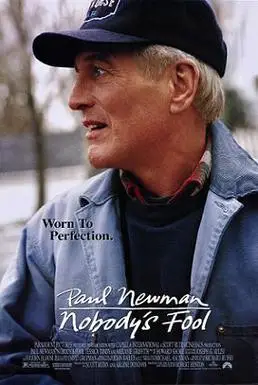
Theatrical release poster (Wiki Image).
- Sully Sullivan (Paul Newman):
“You know, Miss Beryl, people do go on about life after death. Do you suppose it’s true?”
- This quote reflects Sully’s reflective nature and his contemplation of life, mortality, and what might come after.
- Carl Roebuck (Bruce Willis):
“You’re a piece of work, Sully.”
- Carl, Sully’s employer and nemesis, often expresses exasperation at Sully’s irreverence and stubbornness, capturing the contentious yet oddly affectionate relationship between the two.
- Miss Beryl (Jessica Tandy):
“You’re a rotten gambler, Sully.”
- Miss Beryl, Sully’s landlady and confidante, teases him about his penchant for taking risks, both in life and in small-time gambling. This reveals Sully’s flaws and tendency to make poor choices.
- Sully Sullivan:
“I like you, but I don’t need you.”
- Sully’s declaration to his son Peter encapsulates his complex feelings about family, independence, and the emotional walls he’s built over the years.
- Sully Sullivan:
“I can’t believe it! It’s a goddamn miracle! You’re not gonna believe this, but I’m not gonna die today!” - Sully’s exuberant declaration after a narrow escape from danger is both humorous and poignant. It reveals his zest for life despite its many challenges.
(YouTube video)
Plot of “Nobody’s Fool” (1994)
“Nobody’s Fool” is a character-driven drama centered around Donald “Sully” Sullivan (Paul Newman), a likable but stubborn and aging handyman living in the small town of North Bath, New York. Sully is a charming, perpetually broke man who has spent most of his life avoiding responsibility and commitment. He is estranged from his family, especially his son, Peter (Dylan Walsh), and has a strained relationship with his ex-wife, Vera. Sully’s life takes a turn when Peter returns to town with his own family troubles, leading Sully to confront his past mistakes and reconsider his role as a father and grandfather. Throughout the film, Sully navigates his relationships with the quirky townspeople, including his landlady, Miss Beryl (Jessica Tandy), his occasional employer, Carl Roebuck (Bruce Willis), and Carl’s wife, Toby (Melanie Griffith). As Sully faces the challenges of aging, financial instability, and reconciling with his family, he ultimately seeks redemption and a sense of belonging in the community.
Themes in “Nobody’s Fool” (1994)
- Redemption and Second Chances: The film explores the possibility of redemption, even late in life. Sully has lived a life of irresponsibility and avoidance, but as he reconnects with his son and grandson, he begins to seek redemption for his past failures. The film explores the idea that it’s never too late to make amends and to try to be a better person.
- Family and Reconciliation: The strained relationships between Sully and his family, particularly his son Peter, are at the heart of the story. The film examines the complexities of familial bonds, the pain of estrangement, and the difficult path to reconciliation. Sully’s attempts to reconnect with his son and grandson highlight the importance of family, even when the bonds have been neglected or broken.
- Aging and Mortality: Sully’s age and the physical and emotional challenges that come with it are key aspects of the narrative. The film portrays the struggles of aging, including the loss of physical ability, the reflection on past choices, and the search for meaning in the later stages of life. Sully’s journey is one of coming to terms with his mortality and trying to find peace and satisfaction in his remaining years.
- Community and Belonging: The small-town setting of North Bath is a significant element of the story, with its close-knit community playing a crucial role in Sully’s life. The film explores themes of community and belonging, showing how Sully is an integral part of the town despite his flaws and independence. His relationships with the townspeople, from Miss Beryl to Carl Roebuck, reflect the importance of human connections and support systems.
- Independence vs. Vulnerability: Sully’s fierce independence is a defining trait, but the film also explores the vulnerability that comes with it. As Sully faces the realities of aging and the need for help, the film examines the tension between maintaining independence and accepting support from others. Sully’s journey is about finding a balance between self-reliance and allowing others into his life.
- Humor in Adversity: Despite the serious themes, the film is infused with humor, particularly in Sully’s interactions with others. The wit and warmth in these exchanges highlight the resilience of the human spirit and the ability to find joy even in difficult circumstances. Sully’s humor is a coping mechanism, helping him navigate the ups and downs of life.
“Nobody’s Fool” is a poignant exploration of life, love, and the human capacity for change. It focuses on an imperfect man’s late-in-life attempt to make things right with himself and those around him. The film’s themes resonate with universal questions about family, community, and the search for meaning in the face of aging and regret.
Academy Awards – Best Supporting Actor Nominations:
“Road to Perdition” (2002) – Nominated for Best Supporting Actor.
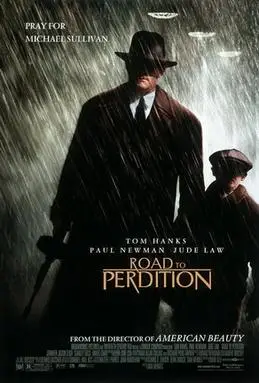
Theatrical release poster (Wiki Image).
- Michael Sullivan Sr. (Tom Hanks):
“There are only murderers in this room. Michael, open your eyes! This is the life we choose, the life we lead. And there is only one guarantee: None of us will see heaven.”
- This quote reflects the bleak reality of the criminal world that Michael Sr. inhabits, acknowledging the moral consequences of his actions and the life he has chosen.
- John Rooney (Paul Newman):
“Natural law. Sons are put on this earth to trouble their fathers.”
- Rooney’s line captures the complicated relationship between fathers and sons, a central theme of the film, as well as the inevitable conflicts that arise from these bonds.
- Michael Sullivan Sr.:
“When people ask me if Michael Sullivan was a good man or if there was just no good in him at all, I give the same answer: I just don’t know.”
- This introspective quote highlights the moral ambiguity of Michael Sullivan’s character, leaving it up to interpretation whether he was a good man caught in a bad life or a man whose actions defined him as something else.
- John Rooney:
“I’m glad it’s you.”
- Rooney says this to Michael Sr. in one of the film’s most poignant moments, expressing a deep, conflicted bond between them, even in the face of betrayal and impending death.
- Michael Sullivan Jr. (Tyler Hoechlin):
“I saw then that my father’s only fear was that his son would follow the same road, and that was the last time I ever held a gun.”
- This quote, from Michael Jr., reflects the film’s exploration of legacy and the father’s desire to protect his son from the violent life he led, hoping to break the cycle of violence.
Road to Perdition (2002) Trailer #1 | Movieclips Classic Trailers
(YouTube video)
Plot of “Road to Perdition” (2002)
“Road to Perdition” is a crime drama set during the Great Depression, directed by Sam Mendes. The film follows Michael Sullivan Sr. (Tom Hanks), a hitman working for the Irish mob under the leadership of John Rooney (Paul Newman), who has been like a father to him. Sullivan’s life takes a tragic turn when his eldest son, Michael Sullivan Jr. (Tyler Hoechlin), inadvertently witnesses one of his father’s hits. This event sets off a chain reaction of betrayal and violence, culminating in the murder of Sullivan’s wife and younger son by Rooney’s volatile and jealous son, Connor (Daniel Craig). Seeking revenge, Sullivan takes his surviving son on the run, targeting those responsible while trying to protect his son from the life of violence he has lived. As Sullivan exacts his revenge, he grapples with the consequences of his actions and the legacy he is leaving for his son. The film ultimately explores themes of fatherhood, morality, and redemption against a backdrop of crime and retribution.
Themes in “Road to Perdition” (2002)
- Father-Son Relationships: The film is fundamentally about the bond between fathers and sons, explored through the relationships of Michael Sullivan with both his son, Michael Jr., and his surrogate father figure, John Rooney. The movie delves into the complexities of these relationships, including the expectations, loyalties, and inevitable conflicts that arise. It also explores the desire of fathers to protect their sons from their own mistakes and the harsh realities of their lives.
- Legacy and Redemption: A central theme is the idea of legacy and the possibility of redemption. Michael Sullivan Sr. is deeply concerned about the legacy he will leave for his son, particularly his fear that Michael Jr. will follow in his violent footsteps. The film explores whether a man like Sullivan, who has committed so many wrongs, can find redemption and if it’s possible to break the cycle of violence and create a better future for the next generation.
- Moral Ambiguity and the Nature of Good and Evil: “Road to Perdition” is a study of moral ambiguity, with characters who are both good and bad. Michael Sullivan is a loving father but also a ruthless killer. The film challenges the viewer to consider whether a person can be judged solely by their actions or if there is room for understanding and forgiveness. The story portrays a world where traditional concepts of good and evil are blurred and where characters must navigate their own moral landscapes.
- The Consequences of Violence: The film does not stop depicting the brutal consequences of violence. Every act of violence in the film has repercussions, often tragic, that affect not only the immediate victims but also the perpetrators and their loved ones. This theme is particularly evident in the way Michael Sr.’s life of violence leads to the loss of his family and the constant danger that Michael Jr. faces.
- Loyalty and Betrayal: Loyalty is a driving force for many of the characters, particularly in the relationship between Michael Sullivan and John Rooney. However, this loyalty is tested by betrayal, most notably by Rooney’s son, Connor. The film explores how loyalty can be both a source of strength and a path to destruction and how betrayal can lead to devastating personal and professional consequences.
- Fate and Free Will: “Road to Perdition” also touches on the theme of fate versus free will. Michael Sullivan’s choices and path dictate his life, but the film raises questions about whether he can alter his fate and that of his son. The title itself suggests a journey toward a predestined end, but the narrative also explores the possibility of changing one’s destiny through actions and decisions.
“Road to Perdition” is a powerful exploration of crime, punishment, and the enduring bonds of family, set against the moral complexities of a world where every choice profoundly impacts the lives of those involved.
Wishing Academy Awards
“Butch Cassidy and the Sundance Kid” (1969)
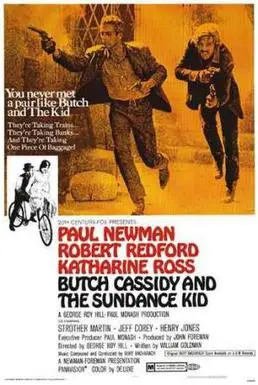 Theatrical release poster by Tom Beauvais (Wiki Image).
Theatrical release poster by Tom Beauvais (Wiki Image).
- Butch Cassidy: “Boy, I got vision, and the rest of the world wears bifocals.”
- Butch’s witty remark about his optimism and forward-thinking mindset.
- Butch Cassidy: “Well, the way I figure it, we can either fight or give. If we give, we go to jail.”
- Butch discusses the predicament he and Sundance face with his typical lighthearted pragmatism.
- Sundance Kid: “You just keep thinkin’, Butch. That’s what you’re good at.”
- Sundance’s playful but sincere acknowledgment of Butch’s strength as the strategist of the duo.
- Butch Cassidy: “Who are those guys?”
- Butch repeatedly asks this as he and Sundance are pursued relentlessly by a mysterious posse, highlighting their growing desperation and confusion.
- Butch Cassidy: “I can’t swim!”
- Butch’s surprising revelation when they’re cornered at a cliffside leads to one of the film’s most famous scenes, where they jump into a river below despite Butch’s fear.
Butch Cassidy and the Sundance Kid, Trailer
(YouTube video)
Plot of Butch Cassidy and the Sundance Kid (1969):
The film follows the adventures of two notorious outlaws, Butch Cassidy (Paul Newman) and the Sundance Kid (Robert Redford), during the waning days of the Wild West. Butch is the charismatic, quick-thinking leader of the Hole-in-the-Wall Gang, while Sundance is his sharp-shooting, reserved partner. The duo’s frequent robberies of trains and banks have made them targets of law enforcement. After robbing the Union Pacific train twice, they are relentlessly pursued by a skilled and mysterious posse. Unable to shake their pursuers, Butch and Sundance decide to flee to Bolivia, accompanied by Etta Place (Katharine Ross), Sundance’s lover. In Bolivia, they attempt to start a new life by robbing banks, but their criminal endeavors eventually catch up with them. The film ends with a famous freeze-frame as the two men, outnumbered by Bolivian soldiers, prepare for one final, doomed stand.
Themes in Butch Cassidy and the Sundance Kid (1969):
- The End of the Wild West:
The film is set during a time when the frontier spirit of the American West was coming to an end. Butch and Sundance are relics of a fading era, unable to adapt to the modernization of law enforcement and society. Their flight to Bolivia symbolizes their futile attempt to escape the inevitable changes overtaking their world. This theme is also reflected in the technological advances—like the posse’s use of a professional tracker—that make it harder for outlaws to evade capture. - Friendship and Loyalty:
The bond between Butch and Sundance is at the heart of the film. Despite their contrasting personalities—Butch’s wit and optimism versus Sundance’s stoicism and pragmatism—they share an unbreakable camaraderie. Their loyalty to each other carries them through multiple challenges, from train robberies to their final showdown, emphasizing the importance of friendship even in the face of impending doom. - Outlaws as Antiheroes:
Though Butch and Sundance are criminals, the film portrays them as charming and likable antiheroes. Their humorous banter, charisma, and strong moral code (such as their refusal to kill unless absolutely necessary) make them sympathetic characters. The audience is drawn into rooting for them even as they commit robberies, reflecting a broader fascination with antiheroes in Westerns. - Escape and Freedom:
Throughout the film, Butch and Sundance are constantly on the run, seeking freedom from the law, societal expectations, and their outlaw reputations. Their move to Bolivia represents a desire for a fresh start, but no matter how far they flee, they cannot escape their past. The theme of escape is tied to the idea of freedom, but the film suggests that true freedom may be impossible in a changing world. - Futility and Fate:
The inevitability of Butch and Sundance’s downfall looms over the entire film. Despite their best efforts to outrun the law and create new lives, they are constantly met with failure. The film’s iconic ending—where their fate is sealed, but the audience never sees their demise—reinforces the idea of an unavoidable, tragic end. Their final freeze-frame moment embodies the tension between their optimism and the futility of their situation.
Together, these themes make Butch Cassidy and the Sundance Kid a reflective and bittersweet exploration of friendship, adventure, and the closing of an iconic chapter in American history.
Similarities Between Jack Nicholson, Laurence Olivier, and Paul Newman
Despite their different backgrounds and acting styles, Jack Nicholson, Laurence Olivier, and Paul Newman share several similarities that highlight their prominence and influence in the film industry. Here are some key similarities:
Iconic Status
- Cultural Icons: All three actors are considered cultural icons, known for their distinctive and memorable performances that have impacted the film industry and popular culture.
Versatility and Range
- Versatile Performers: Each actor demonstrated remarkable versatility, taking on a wide range of roles across different genres. They are celebrated for their ability to portray complex and varied characters.
Acclaimed Performances
- Critically Acclaimed: Nicholson, Olivier, and Newman have all received critical acclaim throughout their careers. They have been lauded for their powerful and nuanced performances that resonate with audiences and critics alike.
Award Winners
- Award-Winning Careers: All three have won major acting awards, including Academy Awards, and have been recognized with numerous nominations and accolades for their work in film and theater.
- Jack Nicholson: Three Academy Awards (two for Best Actor one for Best Supporting Actor).
- Laurence Olivier: Four Academy Awards (including a Best Actor and two honorary awards).
- Paul Newman: One Academy Award for Best Actor and an Honorary Academy Award for his lifetime achievements.
Longevity in the Industry
- Long Careers: Nicholson, Olivier, and Newman all enjoyed long and successful careers spanning several decades. Their enduring presence in the industry is a testament to their talent and adaptability.
Influence on Future Generations
- Mentors and Inspirations: Each has influenced future generations of actors and filmmakers. Their work has served as a benchmark for aspiring actors, and their legacies continue to inspire and shape the industry.
Charismatic On-Screen Presence
- Charismatic Figures: Known for their strong screen presence, each actor brought a unique charisma to their roles, captivating audiences and bringing depth to their characters.
Contributions Beyond Acting
- Directorial and Production Work: Nicholson, Olivier, and Newman ventured into directing and producing films, contributing to the industry in multiple capacities.
- Jack Nicholson: Directed films like “Drive, He Said” and “The Two Jakes.”
- Laurence Olivier: Directed and produced several Shakespearean adaptations and other films.
- Paul Newman: Directed films such as “Rachel, Rachel” and “The Glass Menagerie.”
Personal Charisma and Public Image
- Public Figures: Beyond their acting careers, all three were well-known public figures. They were admired not only for their professional work but also for their charisma and contributions to various causes.
- Jack Nicholson: Known for his colorful personality and presence in Hollywood.
- Laurence Olivier: Respected for his dedication to the arts and his influential role in British theater.
- Paul Newman: Admired for his philanthropy and humanitarian efforts, mainly through Newman’s Own.
Summary
Jack Nicholson, Laurence Olivier, and Paul Newman share several similarities, including their iconic status, versatility, critical acclaim, award-winning careers, and long-lasting influence in the film industry. Their charismatic on-screen presence, contributions beyond acting, and enduring legacies have made them legendary figures in entertainment.
Differences Between Jack Nicholson, Laurence Olivier, and Paul Newman
Jack Nicholson, Laurence Olivier, and Paul Newman are three of the most celebrated actors in film history, each with distinct styles, career paths, and contributions to the industry. Here are some key differences between them:
Background and Training
Jack Nicholson:
- Birth: April 22, 1937, in Neptune City, New Jersey, USA.
- Training: I started as a stage actor and worked as an office worker at MGM’s animation department. I then studied at the Players Ring Theater in Los Angeles.
- Early Career: Began in low-budget films and television in the late 1950s.
Laurence Olivier:
- Birth: May 22, 1907, in Dorking, Surrey, England.
- Training: Educated at the Central School of Speech and Drama in London.
- Early Career: Started on the stage in the 1920s, becoming a leading figure in British theater.
Paul Newman:
- Birth: January 26, 1925, in Shaker Heights, Ohio, USA.
- Training: Attended the Yale School of Drama and studied at the Actors Studio in New York City.
- Early Career: Started in theater and television in the early 1950s before moving to film.
Acting Style
Jack Nicholson:
- Style: Known for his charismatic, intense, and often unconventional performances. He frequently portrays rebellious, complex characters.
- Notable Roles: Randle McMurphy in “One Flew Over the Cuckoo’s Nest,” Jack Torrance in “The Shining,” and the Joker in “Batman.”
Laurence Olivier:
- Style: Renowned for his classical acting style, versatility, and command of Shakespearean roles. He is celebrated for his technique and dramatic intensity.
- Notable Roles: Hamlet in “Hamlet,” Heathcliff in “Wuthering Heights,” and Maxim de Winter in “Rebecca.”
Paul Newman:
- Style: Known for his naturalistic, method-acting approach. He often played charismatic, brooding anti-heroes.
- Notable Roles: Eddie Felson in “The Hustler” and “The Color of Money,” Cool Hand Luke in “Cool Hand Luke,” and Butch Cassidy in “Butch Cassidy and the Sundance Kid.”
Career Highlights
Jack Nicholson:
- Awards: Three Academy Awards (Best Actor for “One Flew Over the Cuckoo’s Nest” and “As Good as It Gets,” Best Supporting Actor for “Terms of Endearment”).
- Legacy: Considered one of the greatest actors of his generation, he is known for his versatility and memorable performances.
Laurence Olivier:
- Awards: Four Academy Awards (Best Actor for “Hamlet,” two honorary awards, and Best Picture for “Hamlet” as producer), and numerous other awards for stage and screen work.
- Legacy: Widely regarded as one of the greatest actors of the 20th century, he was especially noted for his Shakespearean roles and contributions to theater.
Paul Newman:
- Awards: One Academy Award for Best Actor (“The Color of Money”), several other nominations, and an Honorary Academy Award for his lifetime achievements.
- Legacy: Renowned for his acting career, humanitarian efforts, and successful business ventures (Newman’s Own).
Personal Life and Contributions
Jack Nicholson:
- Personal Life: He is known for his off-screen charisma and colorful personality. He has had high-profile relationships and is a well-known figure in Hollywood.
- Contributions: Besides acting, he has directed and produced films, contributing significantly to the film industry.
Laurence Olivier:
- Personal Life: He was married three times, most famously to actress Vivien Leigh. He is known for his dedication to acting and influential work in theater.
- Contributions: Significant impact on stage and screen, helped found the National Theatre in London and directed several acclaimed films.
Paul Newman:
- Personal Life: Married twice, his second marriage to actress Joanne Woodward lasted 50 years. He is known for his philanthropy and charity work.
- Contributions: He co-founded Newman’s Own, a food company that donates all profits to charity. He is also known for his auto racing work and support for various social causes.
Summary
Jack Nicholson, Laurence Olivier, and Paul Newman each brought unique talents and approaches to their acting careers. Nicholson is celebrated for his intense, often rebellious characters, Olivier for his classical and Shakespearean mastery, and Newman for his naturalistic style and charismatic roles. Their legacies extend beyond acting, with significant contributions to theater, philanthropy, and the broader cultural landscape.
Here’s a table comparing Jack Nicholson, Laurence Olivier, and Paul Newman
Sure, here’s a comparison table highlighting some key aspects of Jack Nicholson, Laurence Olivier, and Paul Newman’s careers and achievements:
| Aspect | Jack Nicholson | Laurence Olivier | Paul Newman |
| Birthdate | April 22, 1937 | May 22, 1907 | January 26, 1925 |
| Deathdate | – | July 11, 1989 | September 26, 2008 |
| Notable Awards | 3 Academy Awards, 6 Golden Globe Awards | 2 Academy Awards, 5 Emmy Awards | 1 Academy Award, 3 Golden Globe Awards |
| Breakthrough Role | Easy Rider (1969) | Wuthering Heights (1939) | The Long, Hot Summer (1958) |
| Acting Style | Intense and unpredictable | Classical and versatile | Charismatic and introspective |
| Iconic Roles | “One Flew Over the Cuckoo’s Nest,” “The Shining,” “Batman” | “Hamlet,” “Henry V,” “Rebecca” | “Cool Hand Luke,” “Butch Cassidy and the Sundance Kid,” “The Hustler” |
| Directing Credits | “Goin’ South,” “The Two Jakes” | “Hamlet,” “Henry V” | “Rachel, Rachel,” “Harry & Son” |
| Philanthropy | – | Founded National Theatre | Co-founder of Newman’s Own, extensive charity work |
| Theatre Contributions | Limited | Extensive, co-founder of the National Theatre | Some early career in theatre |
| Distinctive Traits | Intense, versatile, often played rebellious characters | Classical training, known for Shakespearean roles | Charismatic, often played anti-heroes or complex characters |
| Legacy | One of the greatest actors of his generation, influential in modern cinema | Regarded as one of the greatest actors of the 20th century, influential in both theatre and film | Renowned actor, philanthropist, and race car driver, beloved for his charm and humanitarian efforts |
| Honors and Titles | AFI Life Achievement Award (1994) | Knighted (1947), Baron Olivier of Brighton (1970) | Jean Hersholt Humanitarian Award (1994) |
| Notable Quotes | “You can’t handle the truth!” | “I believe that in a great city, or even in a small city or a village, a great theatre is the outward and visible sign of an inward and probable culture.” | “If you don’t have enemies, you don’t have character.” |
This table summarizes their contributions to cinema, most iconic roles, and other notable aspects of their lives and careers.


